July 23 - 29 2023: Issue 591
The Mulhalls Of Broken Bay And Barrenjoey: George Mulhall First Champion Of Australia In Rowing, First Light-Keeper At Barranjuey Headland - Commenced July 20 1868
There were queries into whose gravesite is on the headland, a photo of which appeared among Joe and Kevin's images - this is the site of George Mulhall's final resting place. He was the First Lightkeeper at Barrenjoey, commencing 155 years ago this month with the Stewart Towers, baskets in which fires were lit prior to the construction of Barrenjoey Lighthouse, and Australia's first rowing Champion.


Want to now more?
This history insight from 2015 shares what was found when researching this gentleman and his work on Barrenjoey Headland.
The Mulhalls Of Broken Bay And Barrenjoey - George Mulhall First Champion Of Australia In Rowing - First Light-Keeper At Barranjuey Headland
Pioneer watermen of Broken Bay and Pittwater series - May to June 2015
George Mulhall, the first light-keeper at Barrenjoey, is associated with a few others firsts in Australia's and Sydney's history. He was once called the first Australian champion of Sculling Port Jackson due to his prowess with the oars. He raced against, during the later part of his career in rowing matches, one James Punch, who was to take to England, Edward Trickett who then became Australia's first ever World Champion, in the sport of rowing.
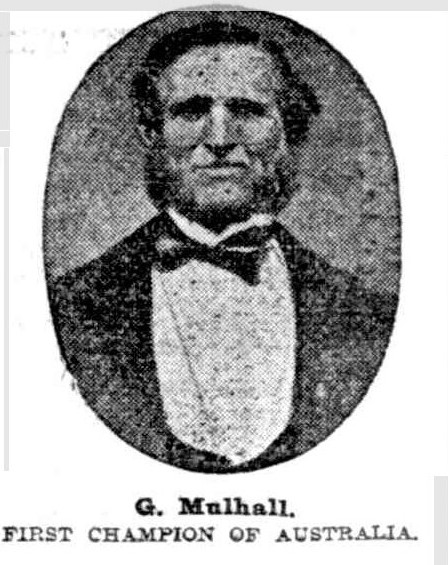 Mr. Mulhall, like James Punch, raced to generate money to look after his family. Unlike Mr. Punch though, who bought a hotel, the same place the Royal Prince Alfred Yacht Club used, among many other sporting bodies, as a Meeting room during its formative years, George Mulhall stayed on the water and racing to support a growing family.
Mr. Mulhall, like James Punch, raced to generate money to look after his family. Unlike Mr. Punch though, who bought a hotel, the same place the Royal Prince Alfred Yacht Club used, among many other sporting bodies, as a Meeting room during its formative years, George Mulhall stayed on the water and racing to support a growing family.
The Punch family were also brothers who were rowing champions and also, like the Mulhalls, had an early association with Brisbane Water, Broken Bay, as James was born there.
Right: G Mulhall - FIRST CHAMPION OF AUSTRALIA - photo from: The pictures of the old-time scullers are from portraits by Eden Studios and from photos lent by Messrs. Frank and Tom Punch, SCULLING. (1906, August 4). Evening News (Sydney, NSW : 1869 - 1931), p. 8. Retrieved from http://nla.gov.au/nla.news-article114095850
Both George and William have 'Mary' and 'Mary S' listed as their mother on their death records, whereas their brothers, or step-brothers, Patrick, James, Thomas and John (and a Robert in one report), have 'Rachel' listed as their mother.
Research, such as it can be that far back and with scant records for Catholics prior to the arrival of Catholic priests to perform and record marriages, found children born with both names during these years, some with surnames attributed to 'Cupid' - indicating many children born to convicts during the first years of settlement here had little or no chance of an accurate record of parentage.
A Mary Griffiths who passed away in 1808, aged 28 years may have been a sister of Rachel Griffiths who then looked after the two young boys.
Both Thomas and William had girls who had the name Rachel, Thomas as her first name and William as 'Elizabeth Sarah Rachel', eldest daughter of Captain Mulhall, of Harris-street, Pyrmont.
Rachel Charlotte Griffiths was one of 338 convicts transported on the ship Coromandel and Experiment, November 1803. Sentence details: Convicted at Carmarthen Great Sessions (Wales) for a term of 7 years on 11 April 1803. Her term expired in 1810 as well and is listed as receiving her Certificate of Emancipation in the same Gazette Notice that lists Patrick's and seems to have care of four children by 1814 - seemingly William, George, Patrick and the slightly elusive Robert.
Experiment, 1804. Rachel Griffiths Classified Advertising. (1810, June 9). The Sydney Gazette and New South Wales Advertiser (NSW : 1803 - 1842), p. 1. Retrieved from http://nla.gov.au/nla.news-article628002
General Muster of New South Wales, 1814. Sydney: Australian Biographical and Genealogical Record in association with the Society of Australian Genealogists, 1987 -
Text: Griffiths, Rachel, Experiment 1, free, 4 children off stores, wife to Patrick Mernan
Surname: MULHALL; First name: PAT; Sex: M; Place of imprisonment: Carlow Gaol; Date of document: 1805; Sentence: Transportation; Record reference code: PPC 1174; Comments: List of convicts received at Cork.
Surname: MULHALL; First name: PATRICK; Sex: M; Place of trial: Carlow; Date of document: 31/08/1805; Name of ship: TELLICHERRY; Record reference code: PPC 1176; Comments: Dr Hardings journal of attendance on Convicts on board the hulks and in the jails in Cork awaiting transportation (17 June 1805). - both from NATIONAL ARCHIVES of IRELAND - Ireland Australia Transportation Records
Patrick's occupation was listed as 'labourer' and his crime 'theft' - there are indications he was mixed up in the riots and revolutions that led to fellow passengers aboard the Tellicherry, such as Pittwater patriarch Martin Burke, being transported for life, but the Patrick Mulhall this is ascribed to was imprisoned on the other side of Ireland and a fair way north and probably not the one transported on this vessel and given 7 years only - the sentence term given to thieves.
SHIP NEWS. On Friday morning came in a six oar'd cutter belonging to the ship Tellicherry, with information that Captain CURZONS, apprehending detention from contrary winds, had dispatched her from the Straits with advices to His EXCELLENCY of his approach; and yesterday morning the ship entered the Heads, with 126 male, and 35 female convicts from Ireland, having only lost four men on the passage. In the evening 31 convalescents were brought on shore, and received into the General Hospital, all the others being in good health.
At six this morning boats were in readiness to take the prisoners from on board; and at seven they left the ship for Parramatta.
The Tellicherry took her departure from the Cove of Cork the 31st of August last, and in her way touched at Madeira, where she remained three days, and left the Pitt, also destined hither, with 200 female prisoners on board, from London. His Majesty's ship Porpoise, mentioned on the Ocean's arrival at the Derwent designed for this place, we understand was in dock when the above vessel came away. SHIP NEWS. (1806, February 16). The Sydney Gazette and New South Wales Advertiser (NSW : 1803 - 1842), p. 1. Retrieved fromhttp://nla.gov.au/nla.news-article627019
In June 1810 Patrick Mulhall was released from servitude, granted his Certificate of Emancipation given having served his 7 year term.
THE Persons whose Names are inserted underneath, and who arrived in this Colony in the several recorded Ships under which their names respectively appear, have obtained Certificates from His Excellency the Governor, of their being restored to all the Rights of Free Subjects in consequence of their Terms of Transportation being expired; they are therefore henceforth to be respected accordingly. By Command of His Excellency JOHN THOMAS CAMPBELL, Secretary. Fortune, 1806. Tellicherry, 1806. Patrick Muhall or Mulhall Classified Advertising. (1810, June 16). The Sydney Gazette and New South Wales Advertiser (NSW : 1803 - 1842), p. 1. Retrieved from http://nla.gov.au/nla.news-article628007
He subsequently obtained land in Hunter Street, later disputed but where during the 1822 and 1828 General Musters and Census he is record as:
General Muster and land and stock muster of New South Wales 1822. Sydney: Australian Biographical and Genealogical Record in association with the Society of Australian Genealogists, 1988 - Text: Griffiths, Rachel, free by servitude, Experiment, 7 years, wife of P. Mulhall, Sydney Mulhall, Patrick, free by servitude, Telicherry, 7 years, householder, Sydney Mulhall, William 16, born in the colony, child of Patrick Mulhall, Mulhall, George, 12, born in the colony, child of Patrick Mulhall, Mulhall, Patrick, 9, born in the colony, child of Patrick Mulhall, Mulhall, Thomas 6, born in the colony, child of Patrick Mulhall, Mulhall, John, 4, born in the colony, child of Patrick Mulhall
1828: Mulhall, Patrick, 42, ticket of leave, Telicherry, 1806, 7 years, Catholic, householders, Hunter Street Sydney, 50 acres, 14 acres cleared, 7 acres cultivated, 35 horned cattle, with : Mulhall, Rachael alias Griffiths, 42, free by servitude, Experiment, 1805, 7 years, Catholic, Mulhall, George, 17, Mulhall, Thomas 12, Mulhall, John 9
The son Patrick, born in 1811, would have been the 17 year old on the premises during this 1828 census; George would have come of age by then and be out working, as would have William - see further below.
Of land grants:
SURVEYOR GENERAL'S OFFICE, SYDNEY, 28th April 1821. THE following LIST of NAMES of NEW SETTLERS, who are to receive GRANTS of LAND, and of OLD SETTLERS, who are to have additional LANDS located for them in the Year 1821, is published for general Information: Patrick Mulhall, . (1821, May 12).The Sydney Gazette and New South Wales Advertiser (NSW : 1803 - 1842), p. 2. Retrieved from http://nla.gov.au/nla.news-article2180253
NOTICE is hereby given that the following claims for Deeds of Grant of Land and Town Allotments, will be ready for examination by the Commissioners appointed for that purpose, under the Act of Council 5 Wm. IV No, 21 at the expiration of two months from this date, before which day, any caveat or counter claim must be entered in this Office. Due notice will be given of the days appointed for the hearings. Case No. 61.-Joseph Roberts, part of the allotment No. 10 of section No 42, Sydney. The whole of this allotment was advertised preparatory to the preparation of Deeds in the Gazette of the 18th of June, 1834, page 402, as claimed by Patrick Mulhall. Colonial Secretary's Office. Sydney, 17th January, 1837, TICKETS OF-LEAVE CANCELLED. (1837, January 21). The Sydney Gazette and New South Wales Advertiser (NSW : 1803 - 1842), p. 4. Retrieved from http://nla.gov.au/nla.news-article2208958
N O R T H U M B E R L A N D. 72 Patrick Mulhall, Fifty acres, parish of Gosford, Brisbane Water. Promised by Governor Macquarie, on 31st March, 1821. Quit-rent 1s sterling per annum, commencing 1 January, 1827. Classified Advertising. (1841, September 14). The Sydney Gazette and New South Wales Advertiser (NSW : 1803 - 1842), p. 4. Retrieved from http://nla.gov.au/nla.news-article2554450
Deeds dated 14th December, 1841. 41 Patrick Mulhall, 50 acres Northumberland land; promised to the grantee. Classified Advertising. (1842, January 15). The Sydney Gazette and New South Wales Advertiser (NSW : 1803 - 1842), p. 4. Retrieved fromhttp://nla.gov.au/nla.news-article2555512
A National Library of Australia map of Sydney 1810 to 1820 shows this address of section no 42 as "Houses occupied by Waterman", at 41 is "Underwood's Wharf", at 45 "John Dalley (Slop-seller) and at 47: "George Dent (Mast-maker)".

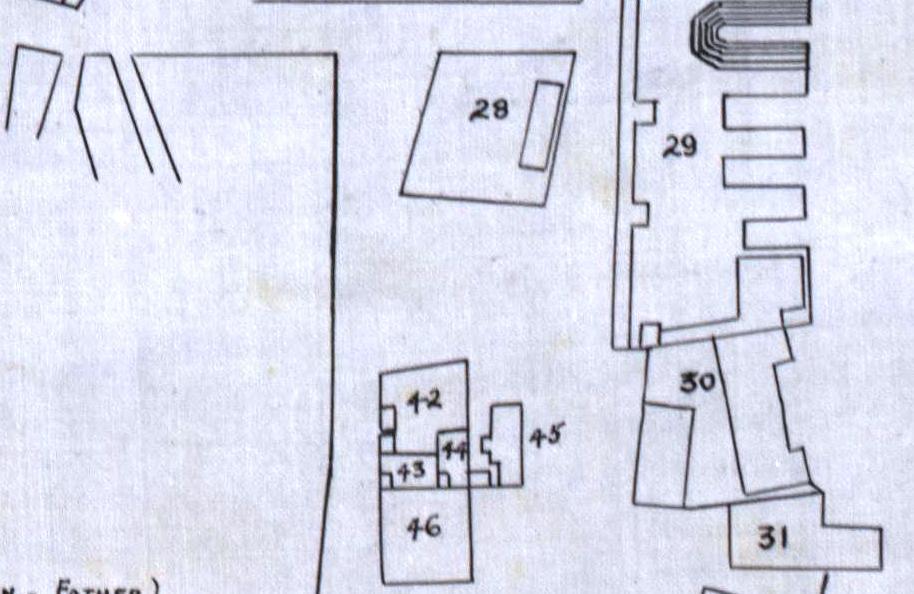
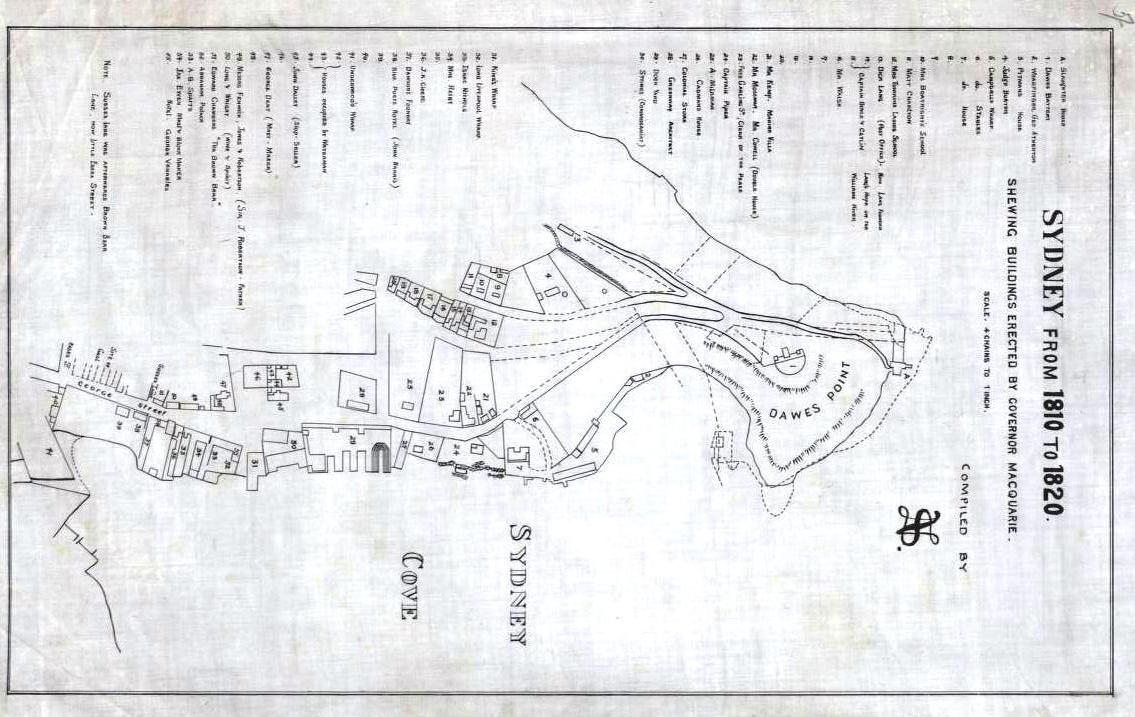
Sydney from 1810 to 1820 [cartographic material] : shewing buildings erected by Governor Macquarie. / Compiled by N.S. 1860 - 1869. MAP F 309. - courtesy National Library of Australia
Carmichael, John, 1803-1857. Map of the town of Sydney 1837 [cartographic material] 1837. MAP NK 2456/127. courtesy National Library of Australia
The Mulhall boys were within easy reach of Sydney Cove and those who built boats and their parts, trades they could easily find work in as Sydney was short on roads and rich in watercraft and the trade of a wherry man or waterman, in skiffs came with them from their homelands. Many of these early pullers for coins were based at 'Circular Wharf', later Circular Quay or at 'Soldiers Point' (Cockle Bay), at Darling Harbour
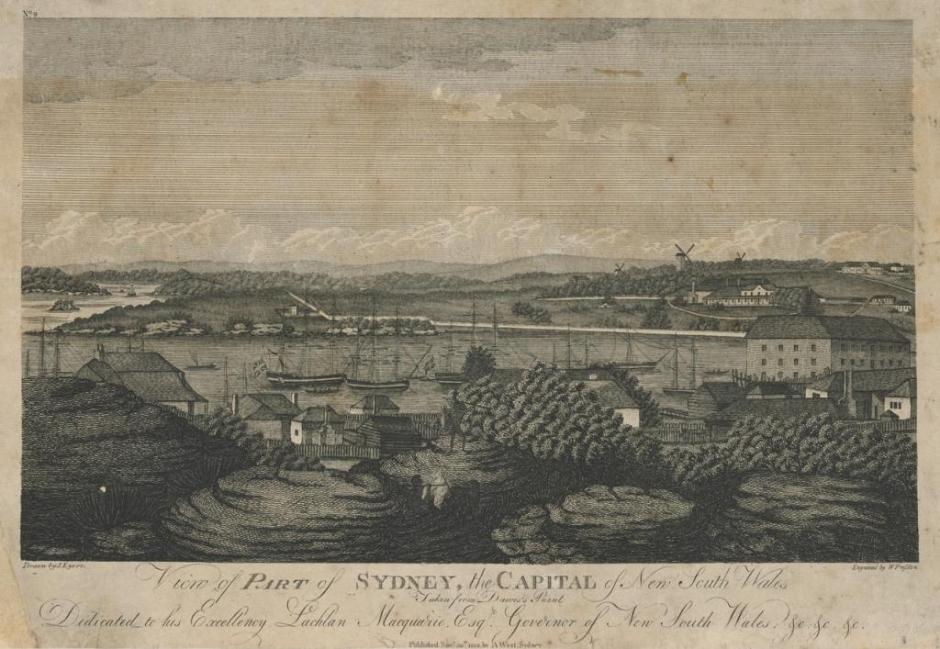
Published November 30, 1812 by A West pics: Above. no.: a990007h; 'View of Part of Sydney, the Capital of New South Wales - Taken from Dawes Point'
Below: No: a990006h "View of Part of the River of Sydney, in New South Wales: Both from State Library of NSW Album: G.H. Hammersley - Australia Illustrated, ca. 1777-1855 [Image view] The artist, Preston, is printed as "Presston". Preston, Walter, 1777-?
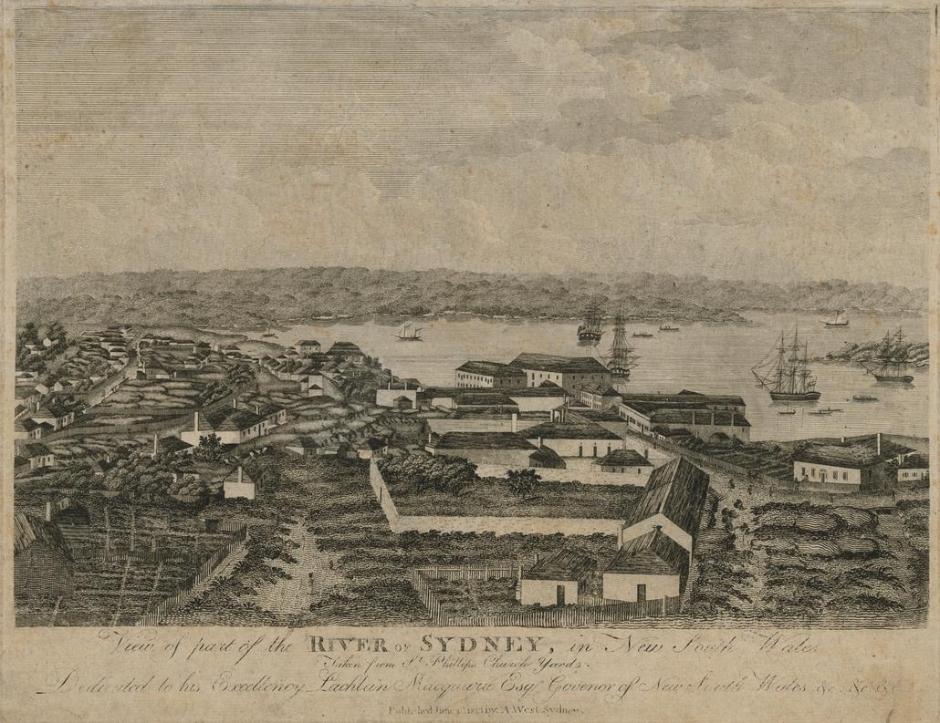
There is another question here as well, not answerable accurately from here - by the time he was elderly, William Mulhall, despite a long and successful career as Captain Mulhall, became to be known by his wife's surname, or his mother's surname as well Read-Mulhall, and sometimes Reid-Mulhall.
Speculation is pointless at this distance it may simply be that William, who was held in much esteem, did not wish to be associated with his convict parentage beginnings a common enough shame in the first few generations of settlers, or that another rift took place. The stigma and shame some may have felt has reversed in current generations but it was a real and definite experience for many in the first century of European settlement here and even though many were proud to be currency lads and lasses, just as many may have wanted to regain the untarnished name they may have had prior to transportation and disassociate themselves from all the more negative associations of criminality. There can be no doubt that those convicts who stayed and prospered were who built Australia but they brought with them, a 'class stain'. What was called then 'the intellectual highborn' ensured many struggled, even with champions in high places born from the similar situation, to have a voice and not be subjected to the also transported class system. See: the exclusives, led by the wealthy grazier John Macarthur Vs. 'the bunyip democracy' See: Wentworth
Another term that pops up frequently in the records found, and used to describe some members of the first generation of this Mulhall family is 'cornstalk'. Apparently this also stems from the also transported class system wherein English-born 'Sterlings' looked down their noses at the Australian-born folk, calling them 'Cornstalks', because this new generation were taller than their forebears.
Captain Mulhall did not receive the same obituary or articles of tributes that many of the other formative ASN Company Captains did when he died though, so perhaps the wish to steer clear from 'Mulhall' notoriety became apparent from examining what else appears during these years.
There was also a discarding of Catholicism and an embracing of Anglicism, many of the marriages of George's and William's children took place in the Mariner's Church and they were placed in Anglican, or Church of England graveyards on their passing. When reading Reverend Therry's account of his early years here (Life and Letters - 1859), it is apparent marriages that weren't conducted by a Catholic priest, even if one weren't available for years, or to a male or female outside the faith, were actively frowned upon and strenuously discouraged; 'pressure was to be exerted' - so an unkind remark or some judgement on their parents who were here for years before the arrival of the first Catholic priest, caused the shift like that George Mulhall Jnr. would one day make. He stopped attending services at the home of Pittwater Patriarch John Collins, or at the small chapel built at Careel Bay, and soon after converted to the Church of England. His father George, so close to where his father Patrick was buried, was placed on Barrenjoey Headland even though the Roman Catholic Holy Cross church was a mere row away.
Both men, William and George, married sisters from one family, at around the same time, 1835. Smith sisters Birth records from NSW Births, Deaths Marriages:
Georges wife 3595/1815 V18153595 1A SMITH MARY A WILLIAM SARAH
William's wife 1039/1817 V18171039 148 SMITH ELIZABETH WILLIAM SARAH
Jervis Spark's excellent book, The Red Light of Palm Beach, states George was married by Rev. John Joseph Therry in a double wedding with brother Thomas at St Mary's Cathedral on May 12th, 1835. George married Mary Ann Smith and Thomas an Ellen Black. George and Mary's first child 'Elizabeth Jane' was born later that year. In 1836 Thomas and Emma also had a baby daughter who was named 'Margaret'.
A little less than two weeks prior to these nuptials this item appears where clearly the girl, also named Mary Ann, was sexually assaulted:
POLICE REPORT. TUESDAY, 24th MARCH. John Jones, Thomas Thompson, William Hayes, Robert Mulhall, George Mulhall, and Patrick Mulhall, were brought before the Bench charged with violating the person of Mary Ann Risely.
Edward Rankin, a constable in the Sydney Police, sworn- On Thursday last, about 2 o'clock in the morning, I heard the cry of murder in the direction of the Soldiers' Point; I called two more constables and we all proceeded there, when I found a woman lying on the ground with nearly all the clothes torn off her back, dripping wet, and the two prisoners, Jones and Thompson, holding her; there was another man who, I think, was the prisoner Hayes, standing a short distance from them ; I took the two prisoners in custody. I asked the woman about the case, and she told me she had been taken into a boat lying at the Market Wharf, and had been violated by five men; she said three of them were natives; I took her the next day on board a little vessel called the Brothers, belonging to the three Mulhalls; she first said it was there she had been the night before, and then she said it was not; at first she would not answer any question as to whether she knew any of the Mulhalls; at last she, with considerable hesitation, said she did not.
Cross-examined by George Mulhall-
The woman said she did not believe that either of the Mulhalls had any concern in it; she said something about a hand-kerchief being tied over her eyes.
Mary Ann Risely, sworn -I am assigned to Mr. Painter, on the Market Wharf; I was walking in the verandah about 9 o'clock on the night of Wednesday last, when five men came upon me suddenly; one of them put his hand on my mouth to prevent me screaming, and one of the others carried me on board a boat lying at the Market Wharf; they ravished my person below deck; when they had done what they thought proper they threw me into the water, when Jones said, "B___y end to her, don't drown her," and dragged me out again; they tied a handkerchief around my eyes to prevent my seeing them ; I do not believe I recollect what happened after this, as I became insensible; I don't believe Thompson or Hayes knew any thing about it, but I can swear to Jones being there; I heard the man say three of them were natives; I do not believe it was either of the Mulhalls; I can swear Jones took me to the lime kilns at the Soldiers' Point, and I know four men violated my person ; they threw me in the water twice, and Jones picked me out, and finally carried me to the lime kilns to dry my clothes ; this next day, when the constable took me on board the Brothers, I told him that was not the boat I was on board of the night before.
John Stapleton, sworn - Jones and Thompson brought the woman to the lime kiln, and laid her down by the fire to dry her clothes; they were both of them dripping wet ; Thompson said," Well, this is the first time I ever saved a woman, and it shall be the last, as she nearly drowned me."
Thompson, in his defence, said, that he picked the woman up in the street; she asked him if he could take her to a fire to dry her clothes ; she was very wet, both inside and out ; he took her to the lime kilns, and called Jones and Hayes to her assistance; they laid her down by the fire, when the heat overcame her and she began to cry out ; the constables came and took him and Thompson-into custody, and asked Hayes to mind the woman.
George Mulhall said, if it were necessary, he could prove that he and his three brothers were at Marks', a public house, from 7 till 10 o'clock. The bench, after a long deliberation, said Jones must be remanded, he being the only man sworn to; the other five were discharged. POLICE REPORT. (1835, March 26). The Sydney Gazette and New South Wales Advertiser (NSW : 1803 - 1842), p. 2. Retrieved from http://nla.gov.au/nla.news-article2197676
Emma, Mullhall, 18 tons, Hawkesbury, wheat and wool. COASTWISE, From 6th to 27th Instant, inclusive. (1830, April 29). Sydney General Trade List, Mercantile Chronicle and Advertiser (NSW : 1830), p. 2. Retrieved from http://nla.gov.au/nla.news-article163337054
FOR PORT MACQUARIE, To Sail in a few Days, THE Cutter "EMMA," W. Mulhall, Master, Burthen 19 Tons. For Freight or Passage, apply on Board at the King's Wharf; or to LAMB, BUCHANAN, & CO. Sydney, 8th August 1831. Advertising. (1831, August 8).The Sydney Herald (NSW : 1831 - 1842), p. 3. Retrieved from http://nla.gov.au/nla.news-article12843373
Followed Quickly By The First "Firsts" For The Mulhall Watermen:
Captain Mulhall, the gentleman who commands the Sophia Jane steamer, is a native of the colony, and has also the honour of being the first native commander of a steam vessel. For kindness and civility, it is generally allowed there are none superior to him in the colony. There are some great difficulties attached to the navigating of the River Hunter ; at low water in places there are hardly sufficient water for the Sophia Jane. The experience of the captain enables him to avoid every danger, and though sometimes checked in her career, his superior management carries her cheerily along. Original Correspondence. (1833, November 7). The Sydney Gazette and New South Wales Advertiser (NSW : 1803 - 1842), p. 2. Retrieved from http://nla.gov.au/nla.news-article2214727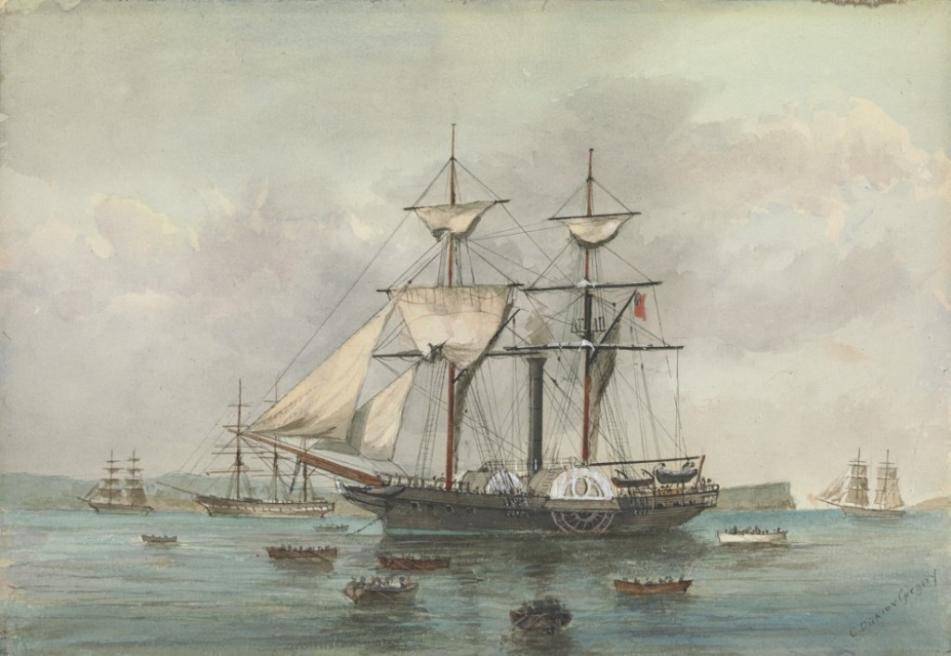
P.S. SOPHIA JANE - from a painting by Dickson Gregory, image No.; 2805501, courtesy State Library of Victoria
From 1836 on George is publishing 'Challenges' with brother Thomas, to any who will row against them. They would have had some recall and recourse to one of the first recorded challenges and the record sums 'wages' made, which they probably witnessed as waterfront lads:
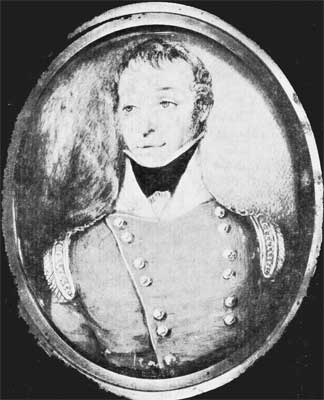 This day a Boat Race, from Bradley's Head in to the Cove (a distance of three miles and a half), took place, the boats starting at two o'clock, with the tide, and compleating the distance in 15 minutes. The number of competitors was four; viz. Captain Piper(picture right), Naval Officer; Captain Lambe, of the Batavia ; Captain Johnston, of the Guildford; and Captain Bell, of the Minerva; for a considerable sum, which was won by Captain Piper; and we understand that a part of the winnings has been given to the Benevolent Fund for the Relief of the Poor. Sydney. (1818, May 16). The Sydney Gazette and New South Wales Advertiser (NSW : 1803 - 1842), p. 3. Retrieved from http://nla.gov.au/nla.news-article2177951
This day a Boat Race, from Bradley's Head in to the Cove (a distance of three miles and a half), took place, the boats starting at two o'clock, with the tide, and compleating the distance in 15 minutes. The number of competitors was four; viz. Captain Piper(picture right), Naval Officer; Captain Lambe, of the Batavia ; Captain Johnston, of the Guildford; and Captain Bell, of the Minerva; for a considerable sum, which was won by Captain Piper; and we understand that a part of the winnings has been given to the Benevolent Fund for the Relief of the Poor. Sydney. (1818, May 16). The Sydney Gazette and New South Wales Advertiser (NSW : 1803 - 1842), p. 3. Retrieved from http://nla.gov.au/nla.news-article2177951
And this rowing match a premonition in some ways of future events that would add to the chorus who would call George Mulhall the "First Champion of Australia'
A boat race took place on Thursday last, at 12 o'clock, which afforded a good deal of amusement; on which considerable bets were made. The contending boats were Captain Piper's, and a whale boat belonging to the American brig General Gates; they rowed from Dawes' Battery round a boat stationed between Bradley's Head and Shark Island; the distance nearly eight miles. The winning boat, Captain Piper's, performed it in 35 minutes; the American whale boat came in a considerable time after. The boats were steered by their owners. Sydney. (1819, July 10). The Sydney Gazette and New South Wales Advertiser (NSW : 1803 - 1842), p. 3. Retrieved fromhttp://nla.gov.au/nla.news-article2178806
Some of the challenges these new husbands published, possibly to supplement the 6d charged for ferrying waterman's fares:
CHALLENGE. GEORGE and THOMAS MULHALL are open to row against any two persons in the Colony(not Australians) for Ten Pounds. Three Tuns, King Street. Advertising. (1836, March 2). The Sydney Monitor (NSW : 1828 - 1838), p. 4 Edition: MORNING. Retrieved from http://nla.gov.au/nla.news-article32150854
A sculling match, between George Mulhall, a native, and a well-known waterman, called Mossman's Jack, for £10 a-side, came off on Friday, morning at seven o'clock. They started from Dawes' Point, to go round Clark's Island and back. "Jack" took the lead at starting, but before they reached Pinchgut, Mulhall was fast heading him. On reaching Clark's island, Mulhall took the lead, and eventually won. For Sale, Freight, or Charter. (1839, October 28). The Sydney Monitor and Commercial Advertiser (NSW : 1838 - 1841), p. 3 Edition: MORNING. Retrieved from http://nla.gov.au/nla.news-article32166045
CHALLENGE. GEORGE MULLHALL and WILLIAM LINDSEY are open to pull any two men in the Colony, for the sum of Fifty or One Hundred Guineas. January 27. Advertising. (1842, January 28). The Sydney Herald (NSW : 1831 - 1842), p. 2. Retrieved fromhttp://nla.gov.au/nla.news-article12873493
CHALLENGE. I HEREBY Challenge to Row John Brennan, or any man in New South Wales, with a pair of paddles in a waterman's skiff, for the sum of from £5 to £20, with equal boats. GEORGE MULHALL. October 1. Advertising. (1845, October 1). The Sydney Morning Herald(NSW : 1842 - 1954), p. 1. Retrieved from http://nla.gov.au/nla.news-article12882523
CHALLENGE. TO JOHN BRENNAN. I HEREBY Challenge you again ; to row you for £5, £10, or £20, when, and as far as you like, but I must exclude Mr. Harper's boat - the one you last pulled in. Let any two disinterested persons choose two boats, and then toss up for the choice. GEORGE MULHALL, Harrington street. Advertising. (1845, October 3). The Sydney Morning Herald(NSW : 1842 - 1954), p. 1. Retrieved from http://nla.gov.au/nla.news-article12882581
TO GEORGE MULHALL, WATERMAN, CIRCULAR WHARF. ON last Monday, 29th of September, 1845, being Michaelmas Day, I pulled you for five pounds, in two skiffs built by the same tradesman (Mr. Ferris), and off the same mould; the race was rowed in two heats, four miles each heat ; I beat you by upwards of one mile each heat ;-therefore I treat your challenge with indifference ; -send a better man. JOHN BRENNAN, Waterman, New Stairs, George-street, October 3. Advertising. (1845, October 4). The Sydney Morning Herald(NSW : 1842 - 1954), p. 2. Retrieved from http://nla.gov.au/nla.news-article12882619
I, GEORGE MULHALL, winner of the last prize, having been fouled several times by Brennan, am now open to row any man in Sydney for any sum. GEORGE MULHALL, Circular Wharf. Advertising. (1848, January 27). The Sydney Morning Herald(NSW : 1842 - 1954), p. 1. Retrieved from http://nla.gov.au/nla.news-article12896052
The 'Fouling' mentioned meant oars and bows clashed when rowers were too close to each other and featured through many of the reports of rowing matches that grew as rowing on the harbour and elsewhere did. These word tiffs were sometimes fought out through letters addressed to the local papers, who must have loved being able to up the ante - some of the content is libellous but shows how passionate all the rowers were about their sport and it as a means to provide an income.
Once married George appeared to be on his father's property at Mulhall's Point as much as in Sydney earning a living, probably transporting goods from the farm. Here too a record of his rowing takes place and this is where he met the men who would form a crew for one famous, or infamous wager rowing match with a few conflicting records of wining one in 1844 and then not seeming to bother to win in the second month of 1845:
East Gosford.-On Easter Monday there was a very respectable fete at East Gosford, in the form of a regatta, consisting of a sailing match and two pulling matches, which had been got up under the auspices of Messrs Watson and Smith in such a way as did them great credit. As it happened the day was a dead calm, and therefore the sailing match could not be decided. The pulling matches however, made amends as each of them was nobly contested; and although the general opinion was that Messrs Mulhall, Speirs, and Piper could not be beaten at the oar, yet Mr Quilty and his crew, composed entirely of landsmen, in Mr Dalgettie's boat, carried off the prize in each match. During the day the steamer William IV was plying about the reach without charge for the inhabitants, and til sunset made a pleasant excursion to the most romantic points on the coast. The winning boat had been imported by Captain Stephens, and arrived at East Gosford in the William IV. only on the preceding day. DOMESTIC INTELLIGENCE. (1841, April 15). The Sydney Herald(NSW : 1831 - 1842), p. 2. Retrieved from http://nla.gov.au/nla.news-article12868681
ROWING MATCH.-Yesterday afternoon, a number of persons assembled at Fort Macquarie to witness a gig race between the colonial-built boat Red Rover, and the London built boat Sons of the Thames. The prize was for £5 a-side, to pull from the red buoy round Shark Island and back. At four o'clock both boats were at the starting-place, the Red Rover being manned by a crew which was thought about two years since to be equal to any who could be brought, against them; they consisted of Robert and Andrew Melville, Crump, and George Mulhall, the whole of whom are tall muscular men. The crew of the other boat were much more diminutive, and consisted of John Roylance, John Taylor, William Williams (better known as Yankee Bill), and Charles King. Bets were offered on both sides, when, to the surprise of all the spectators, just as they were about to start, the crew of the Red Rover found that she was leaking, and not-withstanding the taunts of their antagonists would not contend in the match, and the general opinion was that they had lost all confidence in themselves. The prize was there-fore won by the Sons of the Thames pulling easily round the distance. COASTERS OUTWARDS. (1845, February 27). The Sydney Morning Herald (NSW : 1842 - 1954), p. 2. Retrieved fromhttp://nla.gov.au/nla.news-article12877693
GEORGE MULHALLL. AN OLD-TIME CHAMPION - The Grand Old Breed of the Days of Yore Avenging the Honor of New South Wales.
How the Broom Was Struck and the Rooster Hoisted!
By Neville Forder
In these degenerate days, when young New South Wales seems to be mostly occupied in getting dam well licked by the invader or the invaded, in every game he used to excel in, from towing to football, it is sadly interesting to look back and conjure up some of the champions of the past, who in their day were invincible, and who, moreover, did not consider mere filthy lucre, where honor and their Country's fame wane at stake. Among these no name stands out more prominently on memory's tablets than that of George Mulhall, who was a most doughty 'champion of oar and scull right through the thirties, the 'roaring forties ' and the early fifties. That veteran hacker of oarsmen for half a century, Joe Davis, in whose hotel in George-street North more sculling matches have been made and discussed than in any other in this aquatics-loving city, now lives in calm retirement at Balmain Road, Leichhardt. He has done his part in the world as an honest, manly man, and he has enabled his son, H P Davis, to tack ' M.A.' to his name and become Professor of English in Prince Alfred College, Adelaide. Professor Davis formerly held a 'similar position in Winham College, Adelaide, where he had such extraordinary successes with his pupils as that 23 out of 27 senior and 13 out of 15 junior passed in English subjects at one exam. It is to good old Joe that I owe the details and portrait published herewith.
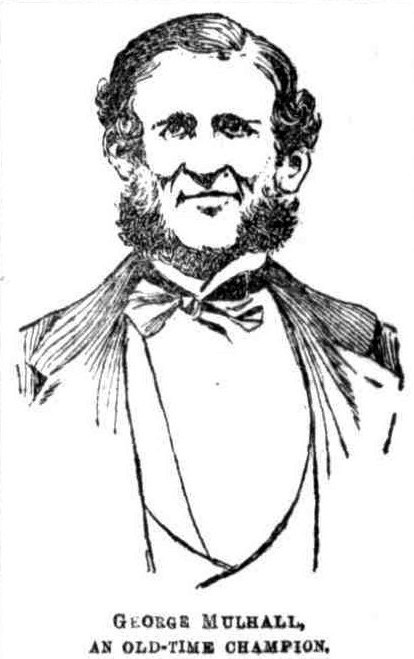 George Mulhall, AN OLD-TIME CHAMPION,
George Mulhall, AN OLD-TIME CHAMPION,
The picture is from a photograph taken many years after Mulhall's retirement to the solitary life of a light-house keeper, but Joe says it shows him very little changed from what he was when be used to paralyse all opposition up to 1855, in which year he first felt the bitterness of defeat, and he finally retired in 1860.
Mulhall was born in Hunter street, Sydney, in 1806, and when quite young his father removed the family to Brisbane Water, where the boys, six in number, grew up to the pluck and muscle improving work of farming and fishing. George developed into a splendid stamp of a Cornstalk, standing 6ft 1 in his sox, and scaling 12 stone fit and well. He was big boned and wiry, never tasted drink, and revelled in hard work. To get fit for his rowing races he used to go in for forest clearing, working thereat like a tiger, between whiles with rowing and walking. He believed in hard work and good, solid food, and nothing used to make him more angrily eloquent later on than the petting and pandering, the 'soft tack ' and bottles of ale, stout and champagne which go to make up the regimen of the modern athlete.
After attaining manhood George came to Sydney; and became a waterman, soon springing into fame as a champion of his class, He won dozens of stakes and races, and was champion in what were then known as light skiffs (they'd be thought dreadfully heavy in these days) and in watermen's boats. He was invincible all through the forties, and it was not till '55, when 49 years old (!) that he was beaten at his own game, by Dick Greene.
As a sample of his endurance a race he rowed at 47 years of age (in 'Â53) may be quoted.
Mr Davis and others backed him to row McGrath, then 23 and a coming champion, over the two Islands course, in skiffs. The young aspirant naturally got away from Fort Macquarie the quickest, and established a strong lead across the Cove, but by the time he got to Dawes' Point the grim veteran had worn him down and was leaving him easily, when McGrath swerved and fouled him, knocking a big hole in his skiff and swamping him. The old 'un, nothing daunted, patched his old scow up and offered to row for the stakes the same afternoon. But McGrath wasn't taking any! He'd had: enough of that sort for then and always, though he afterwards became champion, till beaten by Dick Greene. The umpire of that day was not well up in the laws governing sculling matches and allowed each man to draw his stake, rather than give a decision. Previous to this McGrath had twice led Mulhall for two miles and then had to succumb to his dogged pluck and marvellous staying powers.
But the feat that of all others endeared George Mulhall to his fellow-countrymen was his vindication of the honor of the breed against Yankee spread-eagleism as applied to whale-boat racing. The affair occurred in 1844- 53 years back, and is still remembered with pride by many of the oldsters who have clean forgotten far graver happenings.
It appears that the Whale-boat race at the Anniversary Regatta, on January 26 of that year was won smartly by the crew of one of the fleet of the Yankee whalers who then used to make Port Jackson their headquarters. In those days this race was the even of the regatta (and, faith, there's no grander sport afloat!) and an intense rivalry was created by the Yank's victory. Crews from other whalers, as well as local crew, tried to regain prestege, but were downed in secession, and the crack ship, with true Yankee bombast, canted a broom at her mast-head as a sign that she had swept the seas, as did that boastful Dutch Admiral, Von Tramp bear a similar symbol, aye, even into the Thames, with similar import, some centuries before. But the modern broom was to meet the fate of its predecessor. The Yankee's proud challenge aroused a burning desire for revenge, and George Mulhall was appealed to at his home at Broken Bay.
' Peace hath its victories'!
George assembled his crew, consisting of himself, his brother Thomas, Bob and Andy Melville, and Crump, and they left Broken Bay at 2p.m on the day they received the message. They rowed all night against a stiff breeze and a head sea, and arrived in Port Jackson at 6 next morning. That same afternoon they pulled up to the starting line along with the champion five, and those of some fourteen other whalers, all bound to down the Cornstalks. But they didn't! Mulhall's crew simply lost the haughty invader, and won anyhow. Think of it, ye modern three mile scullers in rowing-machines, who are done with at the mile beacon! ' Any wonder the old roosters snort angrily at you and your modern contraptions of sliding seats, patent sculls, and fairy craft ?
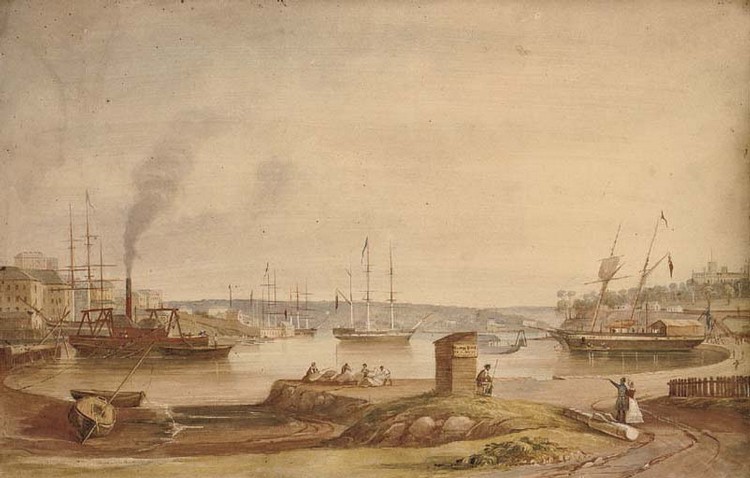
Above: Sydney Cove from the new Circular Quay looking North. 1844, Frederick Garling. Courtesy State Library of NSW
The victors didn't forget to rub it in neither! They were so sure of success that they shipped a passenger ere leaving home. He was a live game cock, and when they had settled the Yankee they let him out of his confinement and rowed past the flagship with the saucy bird perched on the loggerhead forward, crowing victory and defiance to all creation. No wonder the people went mad over their champions. They were all native-born, and not one of the five, nor their boat steerer, Nick Johnson, was under 6ft or 12st, and their marvellous feat of rowing 30 miles in open ocean and then downing such doughty doers in the same day, stamped them heroes worthy to be worshipped.
About 1860, Mulhall was appointed lighthouse keeper at Barranjoey, where he remained, at peace with the world, till his death, on June 23, 1885, aged 79 years. Some years earlier his house at Barranjoey was struck by lightning and burned to the ground, his younger son perishing in the flames. Thus all the ex-champion's records were destroyed, and hence the meagerness of detail in this memoir. That the generation was a hardy one is shown by the fact that his brother Tom, who was one of the historic crew, died only last April, at his home in Woolloomooloo, aged 80 years, being predeceased less than four months by his son , aged 55, who had been for 29 years connected with the 'Sydney Morning Herald,' Evidently the sedentary life of the city deteriorated the race, but it must have been a staunch and true breed in the first quarter of the century, before effete modernity, and the 'comforts of civilisation ' got in their fine work and gave the microbes a show. GEORGE MULHALL. (1897, August 8). Truth (Sydney, NSW : 1894 - 1954), p. 7. Retrieved from http://nla.gov.au/nla.news-article169756703
With regard to the record given last week of the veteran old-time oarsman, George Mulhall, the Mr George Mulhall of today has asked us to state that his father was not at the time of the great whaleboat race therein described, engaged in farming and fishing, but was pilot at Gosford, where also the the brother Thomas ran a schooner in the cedar trade. He was master, and she and a number of other vessels belonged to the original Mulhall, George's father. Mr Mulhall also adds that the feat of rowing from Gosford to Sydney (30 miles), and then winning the great challenge whaleboat race, was made even more extraordinary from the fact that the two Mulhalls did it alone, the rest of the crew being in Sydney at the time. SPORTING SCRAPS. (1897, August 15). Truth(Sydney, NSW : 1894 - 1954), p. 6. Retrieved from http://nla.gov.au/nla.news-article169755658
The need to win these races, and the wages staked by all in them, should not be underestimated. With a growing family, ailing parents, George need to win big and win often. Another insight provides added impetus as to why:
BRISBANE WATER. Mr. FOSTER presented a petition from George Mulhall, a native of the colony, praying for assistance from the Council. The petitioner set forth that for the last three years he had acted as pilot at Brisbane Water, and from the salary derived from that office was unabled to support a wife and a large family. That he had been informed that it was the intention of this Government to do away with the office after the 25th of the present month, and he should thereby be deprived of the means of supporting himself and family. He, Mr. Foster, did not intend to take any definite proceeding with respect to the subject of this petition now ; but he wished to call the especial attention of the Colonial Secretary to it ; and as the proposed reduction was an act, not of the Council, but of the Executive, he hoped that the Executive would render it unnecessary for him to do anything further in the matter. He would now move that the petition be read. The petition was read, and it was ordered to be received : Mr. FOSTER intimating that, if the Executive Government did not take some steps in the matter, he should on a future day bring the petition under the consideration of the House. LEGISLATIVE COUNCIL. (1844, September 13). The Sydney Morning Herald (NSW : 1842 - 1954), p. 2. Retrieved fromhttp://nla.gov.au/nla.news-article12423622
CUSTOMS DEPARTMENT-SYDNEY. The Colonial Secretary moved that the sum of £7867 19s 7d might be appropriated to defray the expenses of the Customs department at Sydney, Botany Bay, Broken Bay, and. Newcastle for the ensuing year. The estimate for this service was as follows :
Broken Bay
Coast Waiter .................. 175 0 0
Four Boatmen, at 6d each per diem,' 36 10 0
provisions and clothing for Boatmen. 88' O 0
Lodging allowances to the coast waiter..80o 60 0
Incidental expenses ....... '.. 15 0.
Total 364 10. Legislative Council. (1844, August 31). Morning Chronicle(Sydney, NSW : 1843 - 1846), p. 2. Retrieved fromhttp://nla.gov.au/nla.news-article31743483
GEORGE MULHALL'S CASE. Mr. Foster presented a Petition from George Mulhall, late Pilot at Brisbane Water, praying compensation for the loss of a boat sustained by him whilst in that situation. Petition read and received. SATURDAY, DECEMBER 21. (1844, December 23). The Australian (Sydney, NSW : 1824 - 1848), p. 3. Retrieved from http://nla.gov.au/nla.news-article37120400
On the 5th of March 1846 Patrick Mulhall passed away. Born in 1784 (some sources state 1781) he was at least 62 and perhaps 65, considered quite a senior age to attain in an era when even '50' could be termed old. Rachel had passed away in 1839, he death record listing her as 'Rachel Mulhall'. A headstone for Patrick still stands in the grounds of Holy Cross church, a Roman Catholic place of worship located at what is now South Kincumber.
Jervis Sparks' Red Light of Palm Beach states George inherited 10 acres and that the Mulhall Point property was sold around three years after Patrick died (1949) although it stayed known as 'Mulhall Point' for much longer. The Mulhall men all now had permanent bases in Sydney anyway, being involved in shipping cedar to that port as told by his son in item above, Thomas and Ellen settled at Wooloomooloo, while George and Mary Ann were in Harrington street, just up from Circular Quay, to begin with. William shows his earliest address at Kent Street, and although some of the steamers he Captained certainly did trips to Pittwater, landing people at Careel Bay and Brisbane water, he remained in Harris Street at Pyrmont throughout his career, occupying both 94 and 95.
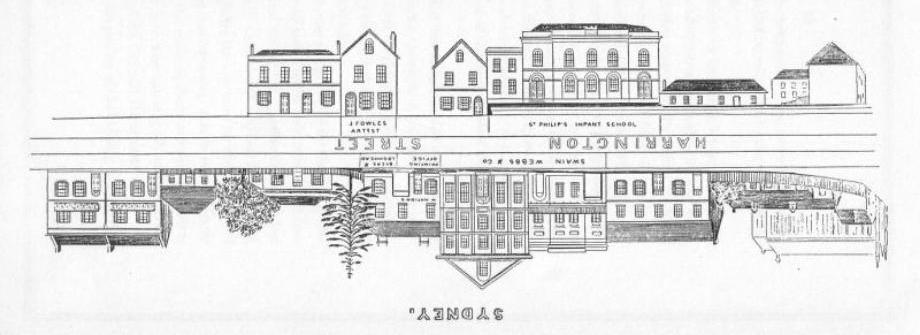
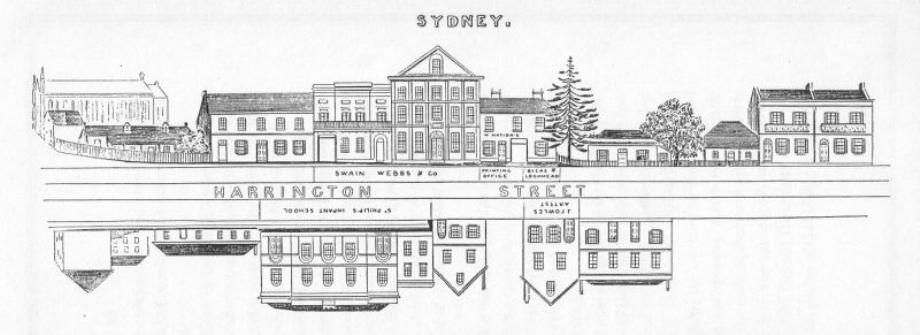
Harrington street - 1848: from Sydney in 1848, Author: Joseph Fowles available in full online
The line skirts the lake to Woy Woy Creek, which may be explored another day. Mount Pleasant is a curiously shaped head-land, jutting some distance out. Passing a couple of islands we reach Blackwall, with Rock Davis' shipbuilding yard on the right. Then, enjoying the magnificent scenery, we round Webb's Reef, and turning sharply to the right come to Mulhall's Point (Koorung-Goorung), a favourite picnic resort. Some low-lying rocks, known as Half Tide, pierce through the surf. The praises of Broken Bay and Lion Island have been sung by Trollope and other writers, who would have been equally enthusiastic if they had had a chance of gazing at the splendid prospect which bursts upon the view on rounding Mulhall's Point. The South Pacific roars as it bursts with a thud on the beach, and the wind is a bearer of words from the sea to scattered hamlets twenty and thirty miles distant. The steamer returns in good time for dinner and the evening train to Sydney. ROUND AND ABOUT GOSFORD. (1890, October 25).Illustrated Sydney News (NSW : 1881 - 1894), p. 4. Retrieved from http://nla.gov.au/nla.news-article63611673
The winning of races, and work as a waterman, perhaps a favoured one by those who hire when he was winning so many races, became even more vital to fill little stomachs and keep a roof over their heads and cope with incidents like this, although no notice is given of which Mrs. Mulhall this is:
A man named John Hall, has been committed to take his trial for knocking down a Mrs. Mulhall, on Saturday night, and robbing her of 7s. 6d with which she was going to pay her rent. NEWS OF THE DAY. (1838, June 8). The Sydney Monitor (NSW : 1828 - 1838), p. 2 Edition: MORNING. Retrieved from http://nla.gov.au/nla.news-article32160327
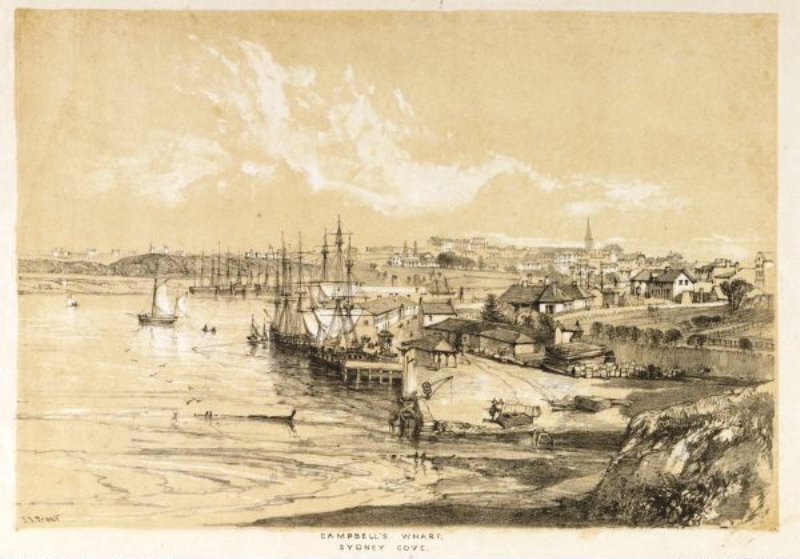
Campbells Wharf, Sydney Cove, 1842 - image nla69400087 - Courtesy National Library of Australia
THE REGATTA PRIZES. IN pursuance of an advertisement which appeared under authority of the Regatta Committee, the successful competitors for the various prizes in the sailing and rowing matches of Monday, assembled at the Custom House Hotel yesterday, at 5 P.M. The whole of the members of the Committee were present; and the cups and money prizes which were allotted for the various races before the regatta took place were displayed on the table. H. H. Browne, Esq. acted as chairman, and presented the prizes to the winners.
1st. The money prize for the first gig race was handed to Mr. R. Mackay of the Driver ;the first money prize for third-class sailing yachts, to Mr. Martin, of the Bright Planet ;and the second to Mr. J. Roberts, of the Virginia. The third match, licensed watermen with sculls, had given rise to some dispute, but the first prize was awarded to George Mulhall, of the Sylph, and the second to J. Brenan, of the Centipede. THE REGATTA PRIZES. (1846, January 28). The Sydney Morning Herald (NSW : 1842 - 1954), p. 3. Retrieved fromhttp://nla.gov.au/nla.news-article12884968
Third Match.-For Licenced Watermen pulling a pair sculls. Prize, £7 7s. Eclipse -George Mulhall. 1 Sarah -John Brennan. 2Betsey-J. Rice. 3 Rainbow- T. Mulhall. 4 The Sarah was foremost boat for some little time, when the Eclipse headed her, and came in as winning boat. The Sarah and Eclipse fouled of Goat Island, and one of Brennan's spoils was broken, on which he gave up the race, but protested against the Eclipse taking the prize. THE ANNIVERSARY REGATTA. (1848, January 29). The Maitland Mercury and Hunter River General Advertiser (NSW : 1843 - 1893), p. 2. Retrieved from http://nla.gov.au/nla.news-article713549
THE ANNIVERSARY REGATTA. A meeting of the Regatta Committee took place yesterday afternoon, at the Circular Quay Hotel, for the purpose of awarding the different prizes to the successful competitors on Wednesday last, when the following was the result:
First Match.-For gigs rowed by amateurs, the prize of £10 10s. was awarded to Mr. George Green, as owner of the Red Rover.Second Match.-For second class yachts. As regarded this race, two protests were load by the Chairman ; namely, one from Captain Towns, owner of the Midge(second boat), stating that in consequence of an express understanding from Mr. Thornton, that the Champion should not run in the second match, he had entered his boat, and there-fore claimed the prize, and another from Mr. George Green, owner of the Friendship, objecting to the Midge receiving back her entrance fee, a second boat, on the ground that she was under the tonnage specified in the regulations. Mr. Thornton stated in explanation, that he had no interest himself in the Champion as regarded the second class prize, but merely claimed it on behalf of Mr. Wood, in whose name she was entered, and that he would not have allowed her to run at all, had he not understood from Mr. Green that it was his intention to object to the Midge as under tonnage, when he determined the Friendship should not have it all her own way. The committee having taken into consideration the protest as to the eligibility of the Midge to run, decided that point in her favour, and then referred the matter to the umpire. Third Match.-For licensed watermen pulling a pair of sculls, the prize of £7 7s. was awarded to Mr. George Mulhall, owner of the Eclipse. THE ANNIVERSARY REGATTA. (1848, January 28). The Sydney Morning Herald (NSW : 1842 - 1954), p. 2. Retrieved from http://nla.gov.au/nla.news-article12900937
And amongst all this winning one legendary pull that shows, despite being called an 'old man' in regards to rowing wagered races after this, and some of the spurious descriptions used of matches, that Mr. George Mulhall was still in the best of health and strength:
A LONG VOYAGE IN A SMALL CRAFT-On the departure of the steamer Juno, for Port Phillip, on the 18th ultimo a well known waterman of this port, named George Mulhall, was hired by one of the passengers to proceed in the vessel with his skiff as far as the Moruya River, for the purpose of landing him there, his intention being to return again to Sydney by the Shamrock On the morning of the 27th, there being no appearance of the Shamrock, it was concluded she must have passed during the night. Accordingly the passenger immediately started for Sydney overland, and Mulhall, being well acquainted with the coast, quitted the Moruya at the same time in his skiff, by himself the same evening he arrived at Batemans Bay where he stopped for the night, starting again early the following morning, he by evening reached Ulladulla, left there on Wednesday morning, and arrived at Shoalhaven the same night. Here he was detained two days, in consequence of heavy gales, but on Saturday morning made another start, and contrived to reach Port Aiken by 9 p M left there early on Sunday morning and arrived here about midday, thus accomplishing a distance of 180 miles sailing and pulling, in an open watermen's boat, which MC may remark was built by Howard, and is 21 feet in length SHIPS' MAILS. (1848, December 5). The Sydney Morning Herald (NSW : 1842 - 1954), p. 2. Retrieved from http://nla.gov.au/nla.news-article12909843
ANNIVERSARY REGATTA OF 1849. (Abridged from the Herald, Jan. 29.) As many as on Friday congregated to seethe opening day of the regatta, were present on Saturday, to witness its closing one; and those who competed for prizes were equally as desirous of attaining them. The following matches were contended for: FIRST MATCH. For Licensed Watermen in Skiffs pulling two oars. First prize £10:Second prize, £3. Mr. Rice's Satellite............. 1 Mr. Mulhall's Sarah Jane.... 2 Mr. Thompson's Esther....... 3
The Sarah Jane took the lead at the start, the Esther second, and the third her Satellite close up. In rounding the flag-boat, off Goat Island, the Satellite was observed to have outshot her competitors by half a cable's length ; the Esther having closely followed, until so changed positions as to render Sarah Jane half a distance behind her, all struggling well for the first place. In passing the flagship Satellite was first in exactly fourteen minutes from the start, Sarah Jane having, when close up to this point passed the Esther, which boat was 50 seconds after the Satellite, and 20 seconds after the Sarah Jane. Still all struggling, the Satellite gradually in-creasing her distance, and after rounding Pinchgut, came in first boat by 3 minutes 25 seconds ; the Sarah Jane, a decent second of the Esther, which was nowhere.ANNIVERSARY REGATTA OF 1849. (1849, January 31). The Maitland Mercury and Hunter River General Advertiser (NSW : 1843 - 1893), p. 3. Retrieved from http://nla.gov.au/nla.news-article705935
THE ANNIVERSARY. (From the Herald, Jan. 28. The 62nd Anniversary of the Foundation of the Colony, which took place on Saturday last, was celebrated by the inhabitants with much of that nationality which usually characterises them on such occasions. The morning was very cloudy and threatening, the wind being from the south, and every promise, in an ordinary season, of heavy rain ;but by nine or ten o'clock brighter hopes were inspired, and numbers of persons were to be seen thronging to the shores of the harbour, encumbered with the usual commissariat encumbrances of prog baskets, &c. The number of booths around the harbour was not so great as on the last occasion ; and although the number of spectators was certainly much less, we think they prospered better.
We are happy to state that no accident took place of any consequence, although sundry adventurous "skimmers of the seas" were doomed to taste the salt water, and congratulated themselves on their escapes from sharks and suffocation in dripping petticoats and pantaloons".
The boat races were on the whole very good. The gig race was very close, and the second class yachts, the wood boats, and the whale-boat races, were highly interesting, being very closely contested. We annex a detailed account of the various matches.
First Match, Prize £10.-For all gigs pulling four oars. Three boats entered-the Shamrock, Red Rover, and Flirt, and started at the time appointed ; but the latter soon gave up the contest, and the race was only between the Shamrock and Red Rover. The Red Rover was the favourite, and took the start, but the Shamrock crept gradually ahead, and after a severe contest came in about seventy yards a-head.
Second Match, Prize a New Skiff ; Second Prize £5.-For licensed watermen pulling pair of skulls. The Gold Dust, pulled by Andrew Melville, Musquito, by J. Roylance, Just-in-Time, by G. Mulhall, and Blossom, by T. Mulhall, were the competitors, and they got away in good style, Melville having a slight advantage ; but of this he was soon deprived, the Mulhalls taking a sudden start a-head, which made the others give Up in despair. - After this the race was a mere burlesque, and Just-in-Time came in first, and the Blossom close astern. THE ANNIVERSARY. (1850, January 31). The Maitland Mercury and Hunter River General Advertiser(NSW : 1843 - 1893), p. 2. Retrieved from http://nla.gov.au/nla.news-article696731
Prizes for the Regatta.-The several prizes for the successful candidates at the late regatta were paid to them on Wednesday by the committee, without any dispute taking place. The waterman's skiff, won by George Mulhall, was presented to him on the stage of the Victoria Theatre last Monday night. The prizes awarded amounted altogether to £200. SHIPPING INTELLIGENCE. (1850, February 2). The Maitland Mercury and Hunter River General Advertiser (NSW : 1843 - 1893), p. 2. Retrieved from http://nla.gov.au/nla.news-article696662
The VICTOR IA THEATRE has offered unusual attractions during the week, barring the wreck of the nautical drama of FAIJS COLORS on Monday. The entertainments on Tuesday evening were under the patronage of the Regatta Committee, on which occasion the "Prize Skiff "was lowered from the flies, and presented by Mr. Manager Griffiths in a neat dress, and address to the fortunate winner. Mr. George Mulhall, who stood bowing amidships of his prize, lint in hand, evidently wishing his craft might sink with him beneath the gaze of the hundreds of merry eyes smiling at his first appearance on any stage" but a ship-stage'. LOCAL INTELLIGENCE. (1850, February 2). Bell's Life in Sydney and Sporting Reviewer (NSW : 1845 - 1860), p. 2. Retrieved fromhttp://nla.gov.au/nla.news-article59770151
Sixth Match. - For Licensed Watermen, pulling a pair of sculls in skiffs that have been bona fide licensed for watermen at least three months previous to the race. Same course as match No. 1. Entrance fee, 10s. 6d. First prize, £5 ; Second ditto, 10s. 6d. 1. Wish you may get it, blue, George Mulhall. 2. Jorrocks, white, Thomas Mulhall. 6. Bungaree, black, M. Bullivant. A very pretty race ; well contested through-out, and well won. BALMAIN REGATTA. (1850, December 2). The Sydney Morning Herald (NSW : 1842 - 1954), p. 2. Retrieved from http://nla.gov.au/nla.news-article12922999
There were more and more regattas as more rowing and sailing clubs formed at many places on the harbour, more and more races and George Snr. continued to win these but the prestigious Anniversary Regatta "Championship Race" in 1850, scant years before George Jnr, would triumph, began to become younger men's gain. George Snr., still champion to many, was looking about him for other means of income to feed his children and house his family. George and Thomas became men to be respected for their knowledge of the harbours waters and its reaches and to whom could be entrusted:
NOTICE. WITH a view to securing completer arrangements in the Maritime News department of the Empire, the proprietor has applied for, and obtained, permission from the Government, to erect an office for the Shipping Reporters on the Circular Wharf. This office, adjacent to the public landing place, and within a few paces of the Custom House, will be open day and night, and the Reporter or Boatman in attendance will receive any communication or message intended for this Journal, from commanders of vessels, merchants, or others, and forward it with the necessary despatch to the office of publication. The following are the Reporters and Boatmen engaged : Reporters.-Mr. B. L. Yocninn and Mr. A. C. Dolohery. Boatmen. George and Thomas Mulhall. Family Notices. (1852, November 19). Empire (Sydney, NSW : 1850 - 1875), p. 2. Retrieved from http://nla.gov.au/nla.news-article60137516
OUR SHIPPING REPORTS. SOME changes having been recently made in the Shipping Department of this Journal, it is notified, for the information of our mercantile friends, that our present marine reporters are Mr. Benson Luke Freeman, Mr. James Phillpotts Stephens, and Mr. Thomas Agar Newall. The boatmen attached to The Empire are, as formerly, Thomas and George Mulhall. Boat Station, Circular Wharf. ,Empire Office, January 31, 1853. OUR SHIPPING REPORTS. (1853, February 4). Empire(Sydney, NSW : 1850 - 1875), p. 2. Retrieved from http://nla.gov.au/nla.news-article60131418
ANNIVERSARY REGATTA. The Sixty-sixth Anniversary of the colony was celebrated on Thursday by a Regatta, which eclipsed in all the essentials of that national pastime, its predecessors. The day was glorious and sunny, a fresh breeze from the N. E. made the competing crafts "walk the waters like things, of life," and all things conspired to make the day a real holiday. We may truly say that all Sydney was out in its holiday garments, and therefore we shall be excused from giving a detailed account of the different races, cramped as we also are for want of space ; we shall briefly notice, however, the 5th and 13th matches, which were, so to speak, the races of the day. The 5th was the Champion race for all boats pulling a pair of sculls-first prize £21 second £5 5s, and after a spirited contest, was won by Thos. McGrath, Green being a very good second, and George Mulhall rather astern. The result proves Mulhall too heavy for a light skiff, and that his superior strength and bottom rather operate against him in such a small craft. The 13th match, for licensed watermen's boats pulling a pair of sculls, was easily won by George Mulhall, beating McGrath 30 seconds-first prize £20, second ditto £5. Mulhall must still rank first man in the colony in a waterman's boat. ANNIVERSARY REGATTA. (1854, January 28). Illustrated Sydney News (NSW : 1853 - 1872), p. 2. Retrieved from http://nla.gov.au/nla.news-article63613927
AQUATICS.-On Saturday last a well contested skiff race took place between several watermen connected with the Circular Quay Stairs. The prize, a first-class revolver, was won by George Mulhall;. Macgregor being second, and Martin Foley third. This afternoon at 2 o'clock, another race will take place between the same boats for a sweepstakes of £5. No title. (1862, October 11). Bell's Life in Sydney and Sporting Chronicle (NSW : 1860 - 1870), p. 2. Retrieved from http://nla.gov.au/nla.news-article59791960
TO BE RAFFLED, at Mr. Spencer's, Shakespeare's Hotel, Pitt-street, THIS EVENING, January 23rd, between the hours of 8 and 9 o'clock, a new first-class light SKIFF, the property of G. Mulhall. Forty members, at 10s. each. G. MULHALL. Advertising. (1862, January 23). The Sydney Morning Herald(NSW : 1842 - 1954), p. 1. Retrieved from http://nla.gov.au/nla.news-article13223640
While his elder brother was maintaining the family connection with Reverend Therry:
PITT WATER.
Yesterday, being Easter Monday, a pleasant steam excursion took place in connection with the St Benedict's Young Men's Society. The commodious steamer the Collaroy, under the command of Captain Mulhall, had been chartered for the occasion, and left the Australasian Steam Navigation Company's Wharf, Sussex-street North, with about 260 persons on board, at ten o' clock a.m. Part of the band of H. M. S. 12th Regiment were in attendance, their cheerful and untiring efforts contributing not a little towards making the day pass harmoniously and agreeably away. Working along through the ever-changing scenery displayed on the shores of our harbour, the Collaroy at length rounded the Heads, and, taking a northerly course, rushed past that enormous barrier presented by the weather-worn cliffs which face the ocean between the Great North Head and the seaward aspect of Manly Beach. Following on the interesting coast line of Curl Curl, Dee why, Long Reef, and Narrabeen, &c, - varied succession of wooded eminences, long sandy reaches, towering precipices, and grassy park-like slopes, - the pleasure-seekers were at length abreast of the singular headland of Barrenjoey, forming the extreme south-eastern limit of the estuary which serves as a common outlet for the River Hawkesbury and the Pitt Water.
Shortly after passing the Custom House station the course of the Collaroy then took a southerly direction, and so brought the holiday folks into the lake-like solitudes of Pitt Water, until wooded hills seemed to be rising on every side of the vessel. The passengers were landed at a small, but commodious wharf, erected on the property of the Venerable J. J Therry, under whose especial patronage the excursion had been got up.
Most of the visitors set off in quest of St. Michael's Cave, determined not to lose the opportunity of seeing so great a natural curiosity. The walk, it was found, lay through woods, a long flat, and a hilly scrub, until, facing to the east at the head of the inlet, the merry party, in a straggling Indian file, at length arrived in the vicinity of the cave, cautiously descending the rocks, and creeping carefully along a narrow path specially made for their convenience on the face of the cliffs, they were thus finally rewarded for their perseverance. Almost every body managed to scramble up into the cave, and not a few of the more adventurous explored its inmost recesses by candle-light. The effect of the gloomy inner arch looked down upon from the top of the second angle of the cave, was much admired; and so also was the wider arch at the entrance, as contemplated from the spot where the bright daylight again began to stream down upon the faces of the returning explorers. There was, for some time, a pleasant buzz of conversation and a discussion of food at the mouth of St Michael's Cave, and then the party set out on their way back to the steamer, where dinner had been prepared. Some with sharpened appetites posted thither at once, but many remained with the band near the house on the flat, and amused themselves with dancing, playing cricket, and so on. There was some dancing also at the steamer after dinner was over. The Kembla steamer visited the wharf at an early hour, landed some passengers, and afterwards returned for them. The Collaroy left the wharf for Sydney at about five o'clock, and arrived safe at Sydney soon after eight. The Right Worshipful the Mayor of Sydney, the Mayoress, and other members of the family were on board. We also observed the Rev. Fathers Corish, Curtis, Hanson, and Powell, besides the Venerable J. J. Therry. The trip appeared to give general satisfaction, although a slight shower, soon after the arrival of the Collaroy at Pitt Water, interfered with some of the arrangements. PITT WATER. (1862, April 22). The Sydney Morning Herald (NSW : 1842 - 1954), p. 4. Retrieved from http://nla.gov.au/nla.news-article13227471
The steamer having landed its freight at the wharf constructed by Father Therry for the convenience of persons residing in the locality, and for those excursionists to whom he might give permission to land upon his property, they proceeded to walk towards the Cave, one of the chief attractions of the day's excursion. The path lay across a pleasant, undulating country to the rocks fronting the ocean, on the face of which the Cave is situated. A path has been constructed on the ledges of rock jutting out from the face of the cliff, and presenting in some places difficulties of approach to it which might have deterred many from venturing on the expedition had they been aware of them. The steps were frequently so steep and narrow that the slightest slip might have subjected a person to serious injury by precipitating him from a height of thirty or forty feet on to the rocks below, very similar to those at the base of the Gap, and against which the waves dashed with violence as great as we see at that spot, with which so much melancholy interest is associated. After what we had heard of the Cave itself, we certainly were rather disappointed on gaining the entrance: it is only by scrambling over the rooks, taking up a position at the extreme end and looking back towards the entrance that the full solemnity of the scene can be realised. The dim unearthly light streaming through the entrance and broken up by the projections of the roof and sides left an impression upon the mind not easily to be effaced; it was a fitting scene for all the horrors of the incantation scene in per Freischutz, its resemblance to which was rendered more striking by numbers of bats which flitted to and fro through the gloom;or to that scene in Macbeth where the Weird Sisters' Round about the cauldron go.'
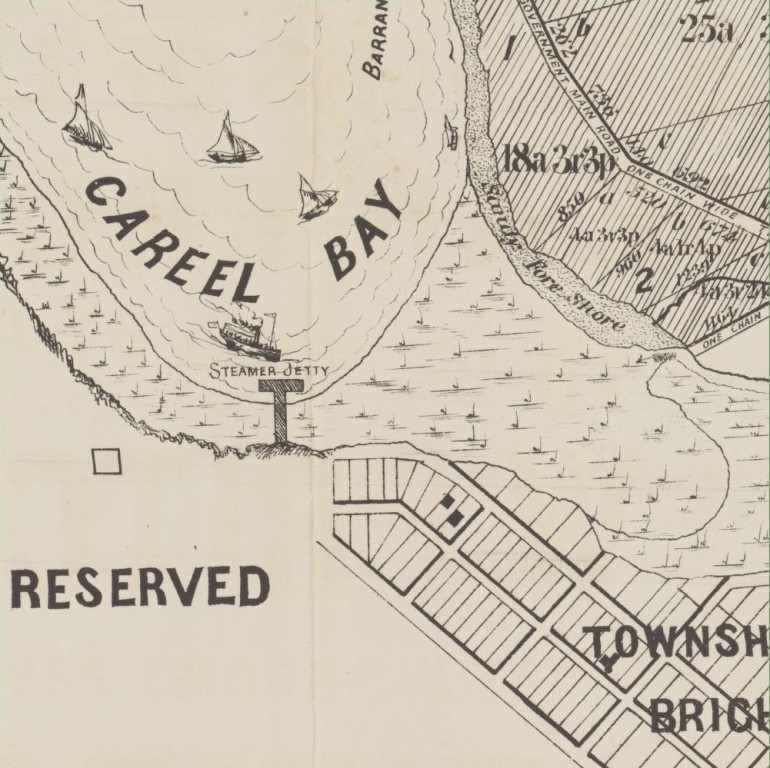
...
It was intended that Father Therry should have delivered the inaugural lecture of the season of St. Benedict's Society in St. Michael's cave, but he was compelled, with great reluctance, to turn back without having reached it, having found the journey too fatiguing for him.
A great number of the excursionists scattered themselves in the bush and on the shores which skirt the beautiful bay, and several employed themselves in shooting and fishing. The Collaroy left Pitt Water about six o'clock in the evening and arrived in Sydney a little after eight no accident having occurred to mar the pleasures of a most agreeable day. Among the guests onboard we noticed the Very Rev. J. J. Therry Archpriest, Rev. Dr. Powell and Fathers Anselm, Corish, Donovan, McGirr, the Mayor of Sydney, with Mrs Oatley and family, &c. &c. The Band of the 12th Regiment had been engaged by the committee and played a selection of drama and other music which tended greatly to increase the pleasures of the day.
We must not omit to mention the extremely discreditable conduct of those who without asking any permission of Father Therry, on whose property St. Michael's cave is situated, very coolly advertised the Kembla to proceed there on another occasion at a less rate than the Collaroy, to the great annoyance and discomfort of those who had asked and obtained permission of Father Therry to make use of his ground... PITTWATER. (1862, April 23). Freeman's Journal (Sydney, NSW : 1850 - 1932), p. 6. Retrieved from http://nla.gov.au/nla.news-article115761495
Father Therry being ill may have led to Captain Mulhall being ill so soon after this trip to Careel Bay and what we now call Avalon, so much so that some reported his demise even though he lived for another 28 years. What is interesting about these articles as they report his death as being on May 23rd, when he did pass away it was on a May 22nd, but in 1890 - strange coincidence or....?:
Captain Mulhall, of the A. S. N. Company, died yesterday. LATEST INTELLIGENCE. . (1862, May 24). The Newcastle Chronicle and Hunter River District News (NSW : 1859 - 1866), p. 2. Retrieved from http://nla.gov.au/nla.news-article111169714
Captain Mulhall died yesterday. SYDNEY. (1862, May 24). The Maitland Mercury and Hunter River General Advertiser (NSW : 1843 - 1893), p. 3. Retrieved from http://nla.gov.au/nla.news-article18688498
CAPTAIN MULHALL-In our telegraphic correspondence of Saturday it was reported that Captain Mulhall, long known in this district in connection with the A SN Company's steamers, had died We hear to-day that Captain Adams, of the Illalong, who arrived in Morpeth on Saturday, with the Friday night's boat from Sydney, which left at a later hour than the despatch of our telegram,reported that Captain Mulhall was rather better than otherwise. He has, we understand, been suffering some time from illness.INSOLVENCY PROCEEDINGS. (1862, May 27). The Maitland Mercury and Hunter River General Advertiser (NSW : 1843 - 1893), p. 2. Retrieved from http://nla.gov.au/nla.news-article18688525
Now, Messrs Editors, before concluding let me tell you we have seen the ghost of Captain Mulhall in command of that fine steamer, the Prince of Wales. Of course it could not be Mulhall in the flesh, as your telegraphic correspondent in Sydney tells us that his spirit had taken its flight to sail on in the unfathomable space beyond the confines of the grave. Some ten days ago he would have people believe hay was up to £10 and £12.So much for his veracity. I must pull up, I shall weary you out. Should you give this a corner in your paper, you will oblige. Your humble servant, ANONYMOUS. Miller's Forest, May 27. ORIGINAL CORRESPONDENCE. (1862, May 31).The Maitland Mercury and Hunter River General Advertiser (NSW : 1843 - 1893), p. 3. Retrieved from http://nla.gov.au/nla.news-article18688602
Mis-reports aside, the other first Pittwater people most associate George Mulhall with is being the First Light-keeper at Barrenjoey. After his time on the waterways in rowing matches, and even though son George also did his feat of rowing to Sydney then rowing in matches successfully, Mr. G. Mulhall Snr. was finally returning home - and just for once - overland instead of on the water:
LIGHTS ON BARRENJUEY, BROKEN BAY.
Two lights were exhibited on Barrenjuey, which forms the south head of the entrance into Broken Bay, for the first time, last night. It will, perhaps, be in the recollection of the readers that the sites of these new lights were fixed on the 8th of last mouth, when a party of gentlemen, consisting of the Governor, the Superintendent of Pilots, Captain Hixson, the Colonial Architect, Mr. Barrett, the Engineer-in-Chief for Harbours and Rivers, Mr. Moriaity, Mr. Coles, of the Colonial Architect's Department, Mr. Stewart, M.L.A., Mr. Trunks, M.L.A., and several other gentlemen, went down to Broken Bay in the Government schooner Thetis. The site of both the lights having been fixed, the work of erecting the temporary towers was commenced almost immediately, under the superintendence of Mr. Hudson, of the Colonial Architect's department and they were finished about a week ago.
The towers are temporary structures, the inner one being twenty feet above the rock, and the outer one ten feet.. Each tower is constructed of four hardwood posts, firmly fixed in the rock, which has been excavated to receive them, and they are protected from the weather by sheets of corrugated iron. The lanterns are fixed up on the wooden structure, and about four feet below the lights running round each tower, is a platform from which the trimmer can light and clean the lamps.
A sleeping berth for the light-keeper has been fitted up in the larger tower, which is placed at a distance of 1180 feet in a W.N.W". direction from the outer tower. The outer light is 315 feet and the inner one 347 feet above high water mark.
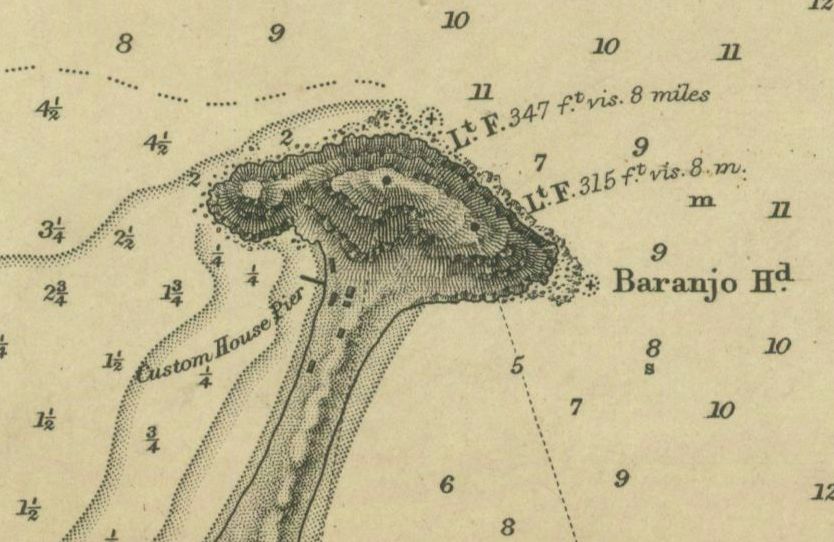
Australia East Coast - New South Wales Broken Bay [cartographic material] 1869 Edition - Surveyed by Capt. F.W. Sidney, Nav. Lieut. J.T. Gowlland & C.George Nav. Mid. R.N. 1868. Series note: British Admiralty nautical charts ; 2166 , Courtesy State Library of Victoria
Each tower is furnished with three lanterns lighted with kerosene, to form a fixed bright light, and will be visible at a distance of about twelve miles to seaward. From a notification to mariners in the Government Gazette, we learn that both lights will be eclipsed between the bearings of South mid S.S. E ½ E., to prevent them from being seen over the land which recedes from the Outer South Head, and also to ensure a vessel to pass a safe distance off the South Head, when running with the lights in sight for the purpose of obtaining anchorage in Broken Bay.
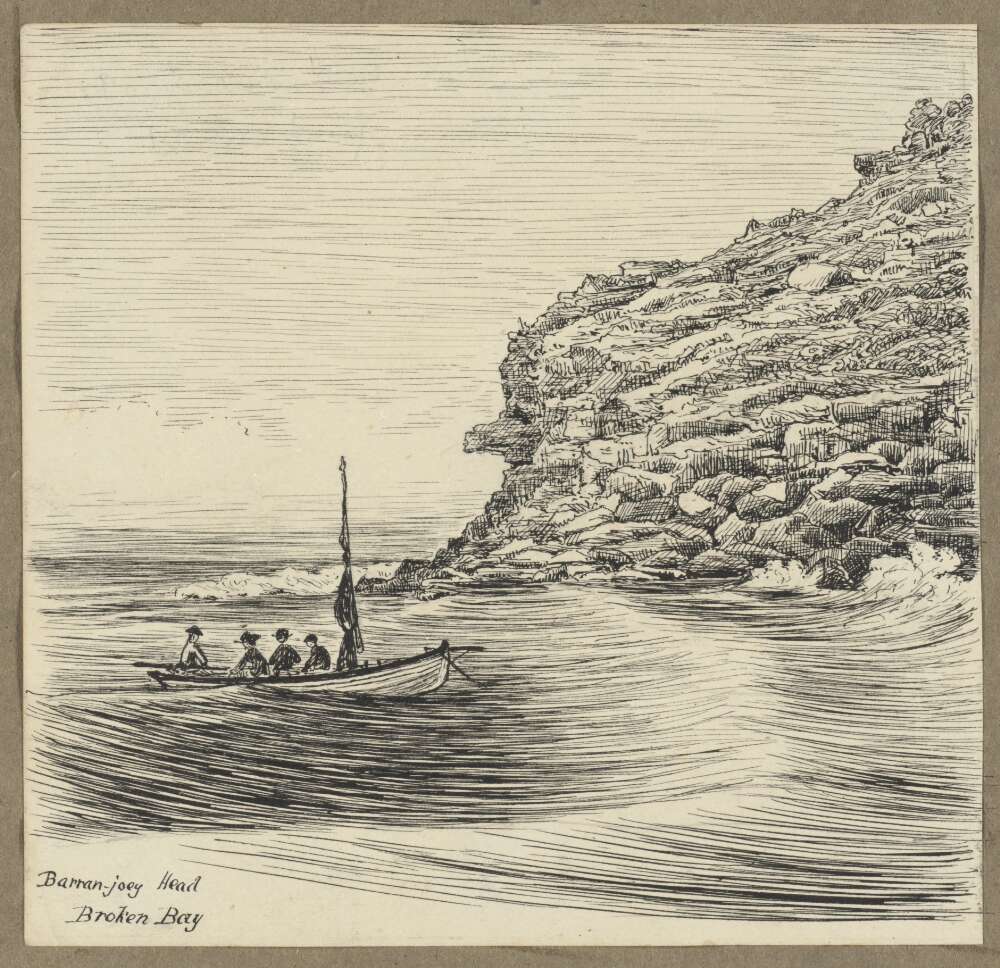
Barranjoey Head, Broken Bay [picture]Creator Graham, H. J. (Harold John), 1858-1929. Description, pen and ink drawing [1884?] Image number nla.pic-an6438965, courtesy National Library of Australia.
The lower, or outer light, will be lost sight of in rounding Barreujuey, but the upper light will be a good guide for coasters bound to Pitt Water, or for large vessels anxious to obtain shelter in Flint and Steel Bay.
On Tuesday last the Thetis went down to Broken Bay, taking as passengers Captain .Myhill, Harbour Master of Port Jackson, Mr. Coles, and Mr. Robinson, the manufacturer of the lanterns, when both lights were exhibited for a short time, and their position and bearings examined from various points seaward by Captain Myhill, prior to the return of the steamer to Sydney.
It was intended to have a picnic to mark the occasion of the lighting up of these two lights-which, by the way, are to be called " Stewart's Lights," after Mr. Stewart, one of the members of the Assembly for East Sydney, who has been the principal mover in the matter, and had the weather continued fine the Thetis would have gone down to the bay yesterday morning with a number of gentlemen.
As the weather proved so stormy, the trip by sea had to be postponed, and Mr. Robinson, and Mr. Mulhall, who has been appointed light-keeper, went overland to light up last night.
A notification for the intention to exhibit these lights has been in the papers for a fortnight, but it should undoubtedly have been given much earlier-Sydney Herald, July 21st. SHIPPING INTELLIGENCE. (1868, July 29). The Mercury(Hobart, Tas. : 1860 - 1954), p. 2. Retrieved from http://nla.gov.au/nla.news-article8853675


Although this states August 1868 as when the Stewart Lights were first lit, numerous newspaper reports state it was July 20, 1868
As early as 1855 a basket was reported to be raised to shine a light for all those who travelled around the sometimes treacherous headland of Barrenjoey. This device came from a wooden hut erected as early as 1843 on the headland when the Broken Bay Customs Station was opened. From here ships were monitored as they entered or left the of Pittwater.
Through the constant lobbying of Robert Stewart the member for East Sydney who had lost his father, William Stewart a master mariner, to the sea in 1820, two wooden structures were erected on the headland. Named the Stewart Towers after this gentleman they were approximately 4 metres and 6 metres in height, made of wood, and painted white.
NOTICE TO MARINERS - From Francis Hixon Superintendent of Pilots, Lights, and Harbours. Sydney, 9th July, 1868:
Stewart's Lights, Broken Bay
On and after Monday, the 20th July, two temporary fixed lights will be exhibited on Barrenjuey, the inner south headland of Broken Bay. The lights will be situated E.S.E and W.N.W from each other, at a distance of 180 feet apart, the higher one being 347, and the lower one 315, feet above high-water mark, and they will be visible at a distance to seaward of about 8 miles.
THE NEW LIGHTS ON BARRENJOEY,-
On Tuesday last Captain Hixson, the Superintendent of Pilots, went down to Broken Bay in the Steamer Thetis to Inspect the new lights, and which were lit up for she first time on last Monday night. He found that both lights were exhibited in terms of the notification in the Government Gazette, and he learnt from the captains of some captains that had taken shelter in the Bay that both lights burnt brightly all night, notwithstanding the wet, stormy weather, and were visible at a considerable distance at sea. Captain Hixson satisfied himself If, by actual observation in the offing, of the suitability of the position of the lights prior to his return to Sydney. SHIPS' MAILS. (1868, July 23). The Sydney Morning Herald(NSW : 1842 - 1954), p. 4. Retrieved from http://nla.gov.au/nla.news-article13169831
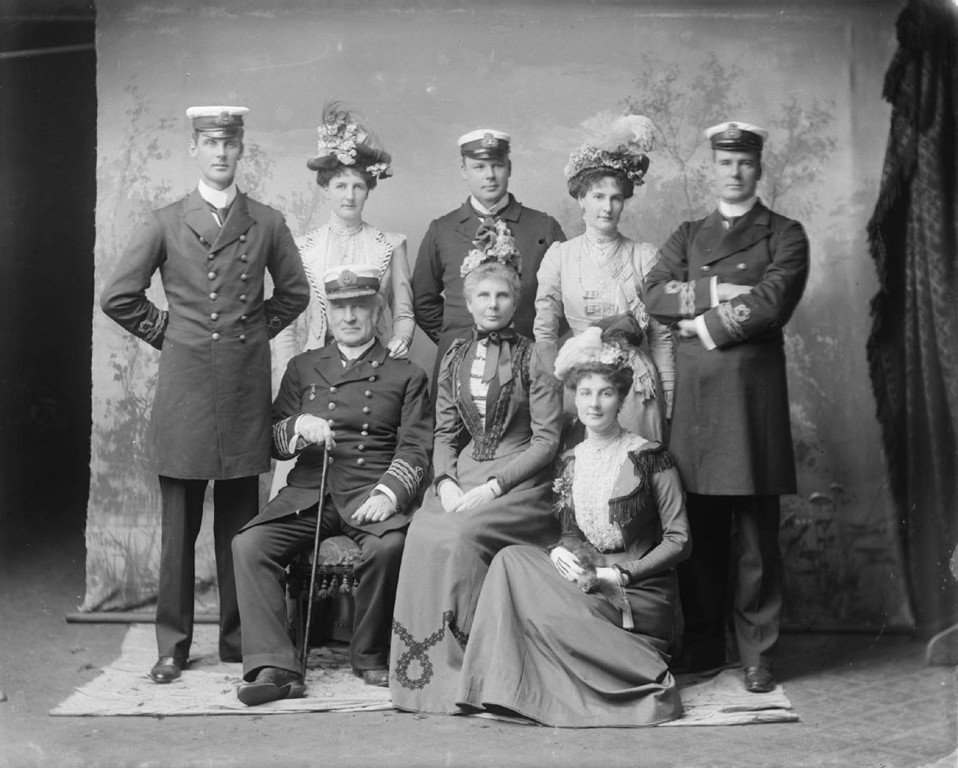
Image: Francis Hixson with his wife Sarah and three of their four surviving sons (all in the NSW Naval Brigade) and daughters Ann, Mabel and Florence. Taken just prior to leaving for Singapore - Boxer Uprising 1900 (Some sources state Edward was serving with the Queensland Naval Contingent, and this is why is is not present in this family photograph.) Back Row, Left to right - (Back): Harley, Annie, Herbert, Mabel Francis William. Front Row; Francis (Snr.), Sarah, Florence. Image courtesy State Library of NSW. State Library of NSW
In late 2015 Geoff Searl and John Illingsworth published their research into The Stewart Towers On Barrenjoey Headland
Unfortunately a tragedy caused a rethink on light keeping from Barrenjoey:
BROKEN BAY. TO THE EDITOR OF THE HERALD,
Sir, will you allow me to contradict a statement which was made at a magisterial inquiry held by Mr. G. Smith of Manly Beach, concerning the death of Henry Tucker, that no tights were in the lighthouse at Barranjuie, or the boat would have safely entered.' This statement is untrue ; the two Lights were both alight, but the boat happened to approach it from the back of the screen attached to the lighthouse from where it was impossible to see the lights. The fault, therefore, does not lie with us. We saw their light in the boat harbour at different times during the night. The screen is placed in a position to prevent vessels from approaching this part of the shore, as it is dangerous. Also, if the boat had been in proper waters, the lights would have been seen by them. Please allow me to state that the accident did not happen until the following day at 5 p.m. Our lights are well seen far out at sea, and any vessel can be and is guided by them; and we are confident of no omission of their being lit at night. Several gentlemen yachtsmen, who passed the Barranjuie lights on the night in question, saw the lights clear and bright, and are ready to come forward to testify the same,
I remain, Sir, your meet obedient servant,
GEORGE MULHALL, Jun
Assistant Light Keeper. Broken Bay, December 29. BROKEN BAY. (1871, December 30). The Sydney Morning Herald (NSW : 1842 - 1954), p. 7. Retrieved from http://nla.gov.au/nla.news-article28417116
BARRANJUIE LIGHTHOUSE. TO THE EDITOR OF THE HERALD.
Sir,-I was rather surprised to find in trio Herald of Saturday, a communication wherein " George Mu-hall, jun," contradicts the sworn evidence of myself, J. Walker, and G. Williams, given at the inquest held on the body of the late Henry Tucker, to the effect that up till quite dark on the night in question we were not within two miles of the land, so that if the lights had been there, we must have seen them.
They were anxiously looked for, our position being a most critical one, as we had either to risk running among the breakers on shore, or standing out to sea in a small boat on a "dark night"Â, in a fresh southerly wind. I have spoken to an experienced yachtsman, who entered Broken Bay the same night; he confirms our statement as to there being no light visible up till 9 o'clock', I am-convinced that Mr. Mulhall will fail to bring any evidence to the contrary. We did not expect to see any light from where we were camped. As this is a matter of the greatest importance, I trust that the proper authorities will cause a strict in
Investigation to be made, and not rest satisfied with the simple denial of Mr. Mulhall.
I remain, Sir, your obedient servant,
FRANK SMITH.
BARRANJUIE LIGHTHOUSE. (1872, January 2). The Sydney Morning Herald (NSW : 1842 - 1954), p. 2. Retrieved from http://nla.gov.au/nla.news-article2841693
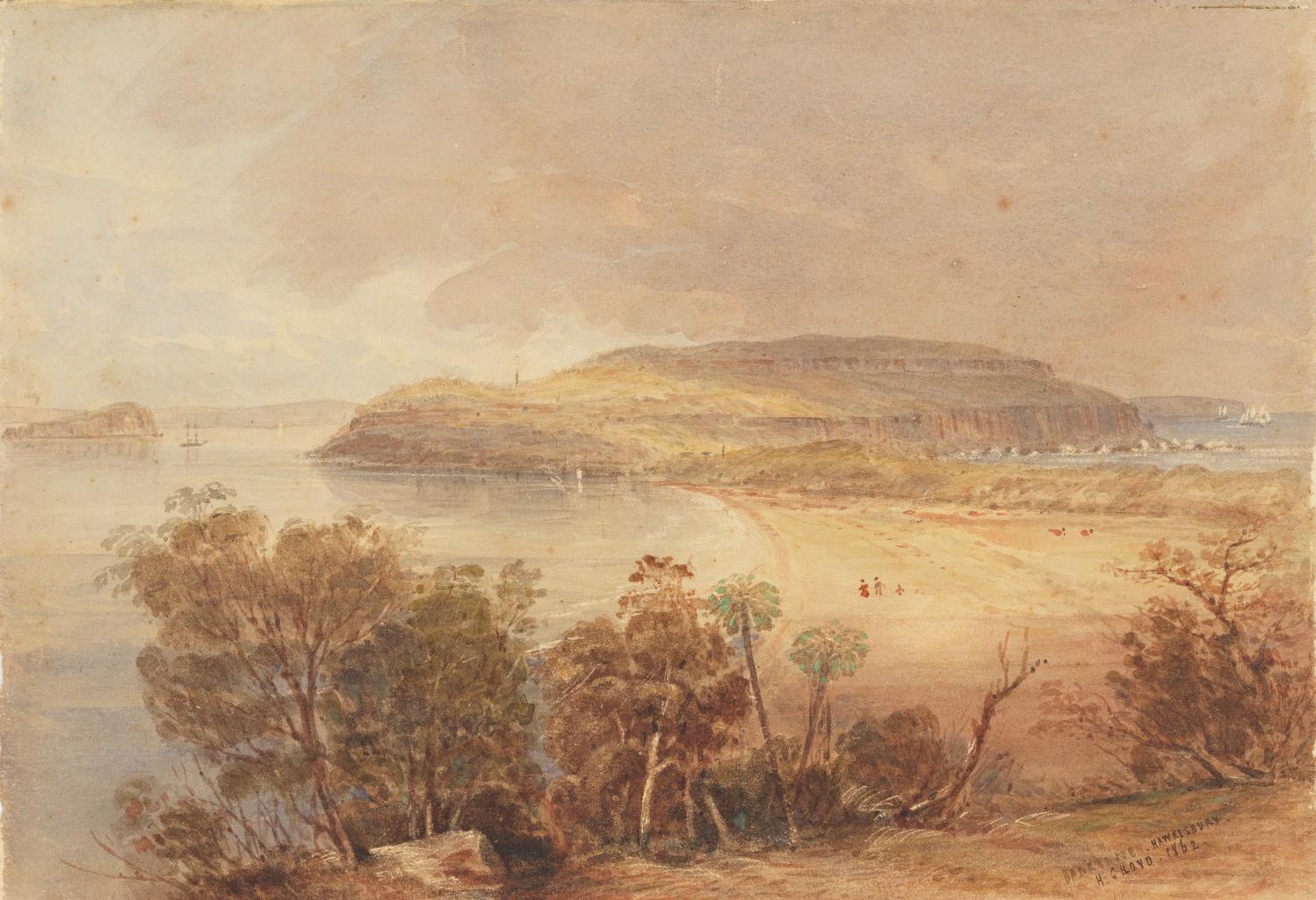
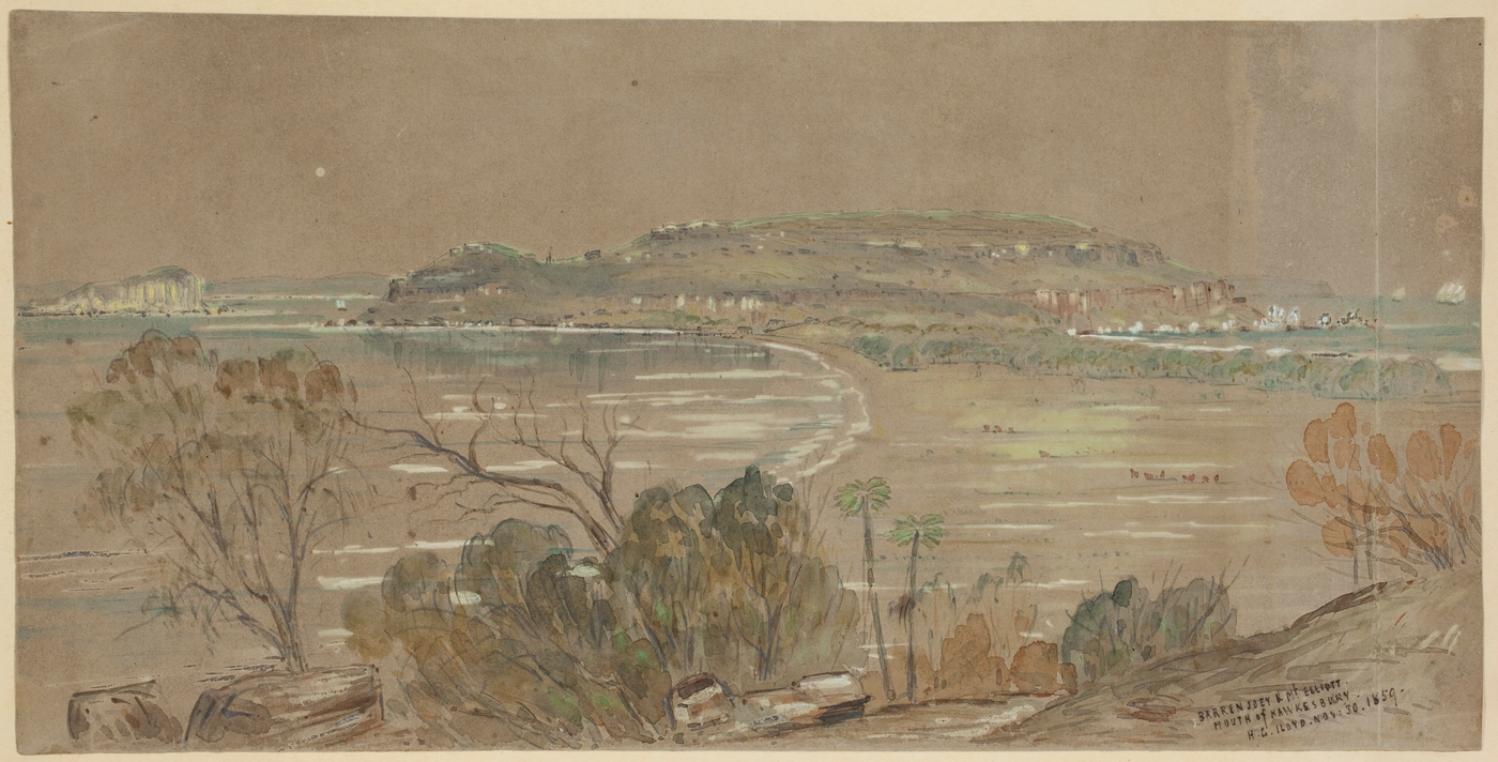
On The Opening:
THE BARRENJUEY LIGHTHOUSE.
The new lighthouse at Barrenjuey, an illustration of which appears in this issue, was lit up for the first time on Monday night, August 1, by Mr. George Mulhall, the lighthouse-keeper. On Friday an official visit was made to the lighthouse by Mr. James Barnet, and Captains Hixson. Jenkins, Broomfield, Robertson, M'Lean, and Lieut. Lindeman, R.N. The party left in the Captain Cook during the afternoon, and returned to town about 10 o'clock after a somewhat rough passage. At a conference of though principal officers of the Marine Departments of the colonies held in 1870, at which were present Captain Hixson (chairman), representing this colony, Captain Heath, R.N., for Queensland; Captain Ferguson, for South Australia and Western Australia ; Captain Payne, for "Victoria; and Mr. C. W. Maxwell for Tasmania, it was resolved to recommend the erection of one lighthouse at Barrenjuey, to take the place of the two temporary lights, with lights of the second order of fixed diopiric red lights ; and in the year 1871 plans for a permanent lighthouse and quarters were prepared, and the sum of £5000 was also voted towards the erection of the buildings. In October, 1879, the tender of Mr. Isaac Banks, amounting to £13 005, was accepted, and preparations were at once made for commencing the work. This tender, however, did not provide for the lantern light, and the light rooms, &c. The lantern was obtained from Messrs. Chance Bros., of England, at a cost of £2210. The entire work was completed by the contractor on the 20th ultimo. The lantern is capacious and well ventilated, having all modern improvements, placed on a substantial iron lightroom, the whole standing upon a strong tower, built with the excellent freestone of the locality. The height of the light is 371ft over high water mark, and is visible about 15 miles distant, latitudes 33deg 35 mins S., longitude 151deg 21min
The tower is fitted with an iron spiral stair, communicating with the upper floor. Adjoining the tower is an oil-room with passage and exterior stairway communicating with the principal quarters. The underkeepers' quarters are placed slightly lower on the hill to the south-west, and sheltered by the north-eastern cliff. The works were designed by Mr. James Barnet, the Colonial Architect, and under his direction they were carried out, the superintending officers being Mr. E. S. V. Spencer, clerk of works, and Mr. John Kelly, the mason foreman of the works. The latter loft for Montague Island lighthouse works in December, 1880, being succeeded by Mr. Archibald Murray, carpenter, from the South Solitary lighthouse works. The members of the Marine Board and Mr. S Barnet express themselves as very pleased with the manner in which Mr. Banks has carried out his contract. THE BARRENJUEY LIGHTHOUSE. (1881, August 6).Australian Town and Country Journal (Sydney, NSW : 1870 - 1907), p. 37. Retrieved from http://nla.gov.au/nla.news-article70958591
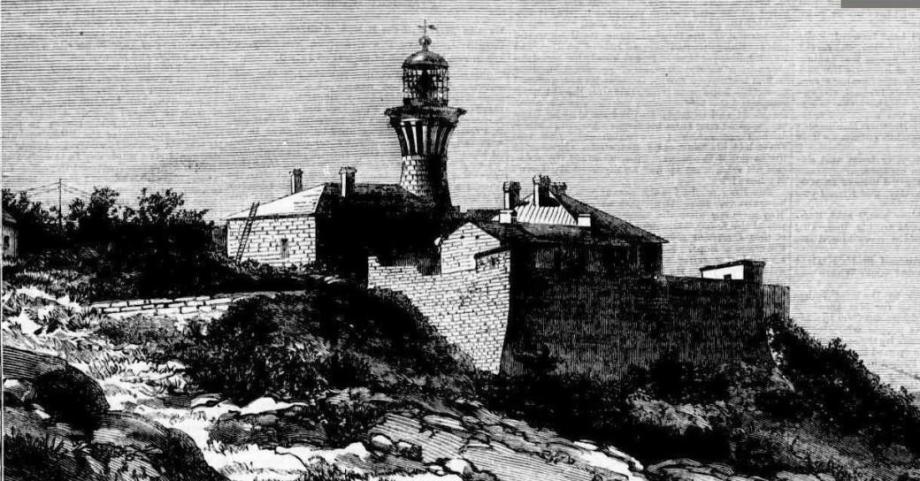
THE BARRENJUEY LIGHTHOUSE, BROKEN BAY.-OPENED ON MONDAY NIGHT. (SEE SHIPPING INTELLIGENCE.) THE BARRENJUEY LIGHTHOUSE, BROKEN BAY. OPENED ON MONDAY NIGHT. (SEE SHIPPING INTELLIGENCE.). (1881, August 6).Australian Town and Country Journal (Sydney, NSW : 1870 - 1907), p. 32. Retrieved from http://nla.gov.au/nla.news-article70958799
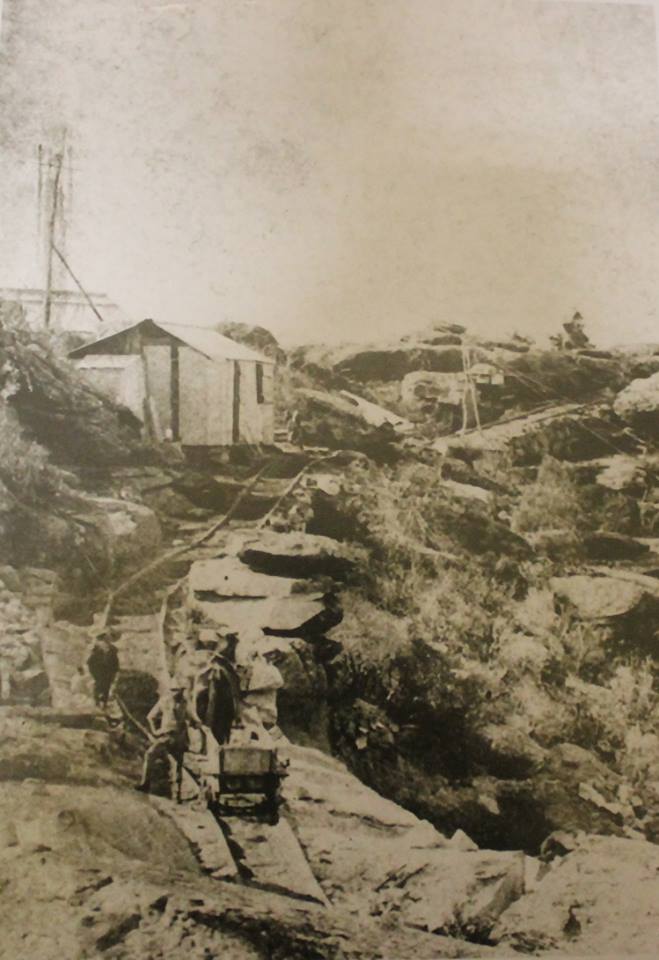
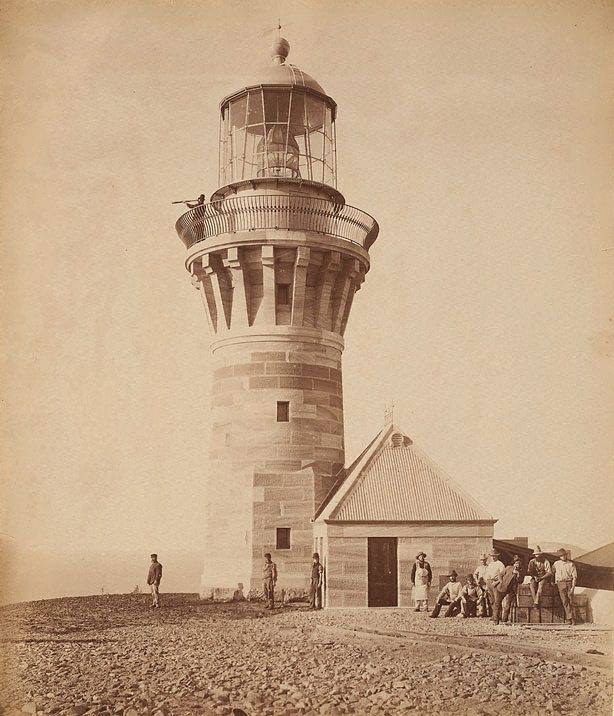
Barrenjoey July 1881, showing trolley track in use - from Australian National Archives and Barrenjoey Lighthouse, circa 1881 - contractors and workers - courtesy AGNSW
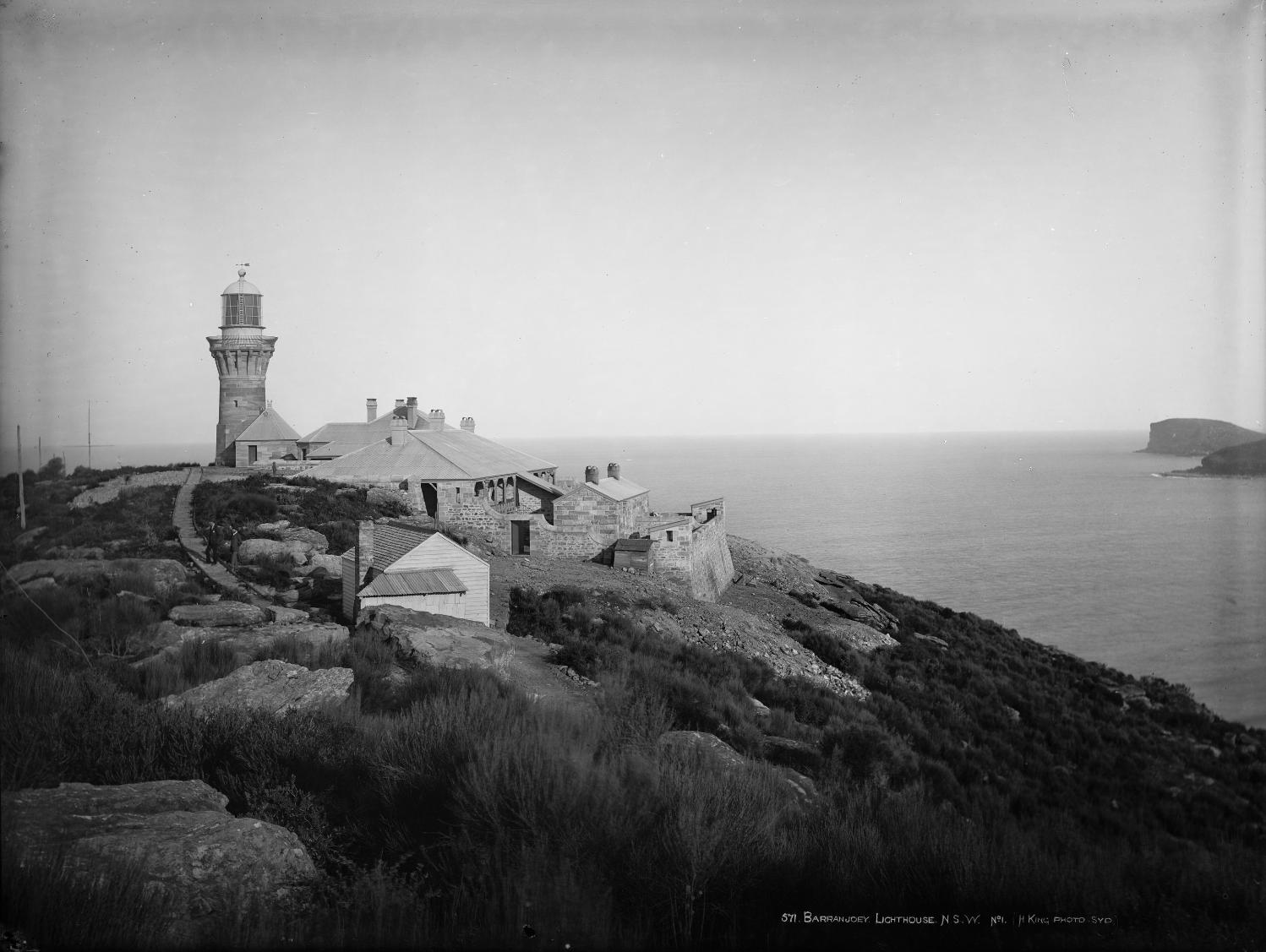
'Barranjoey Lighthouse' by Henry King, circa 1881-1888. From Tyrell Collection, courtesy Powerhouse Museum
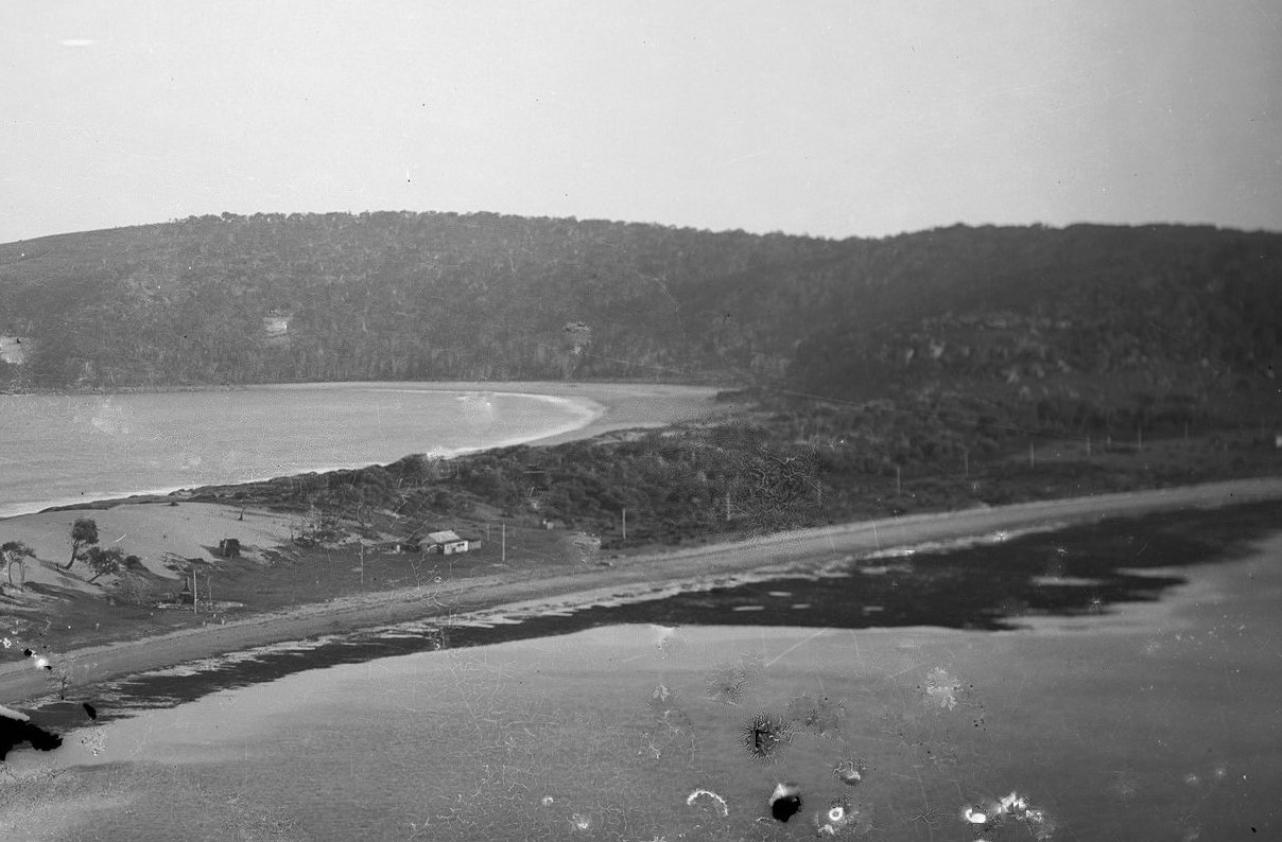
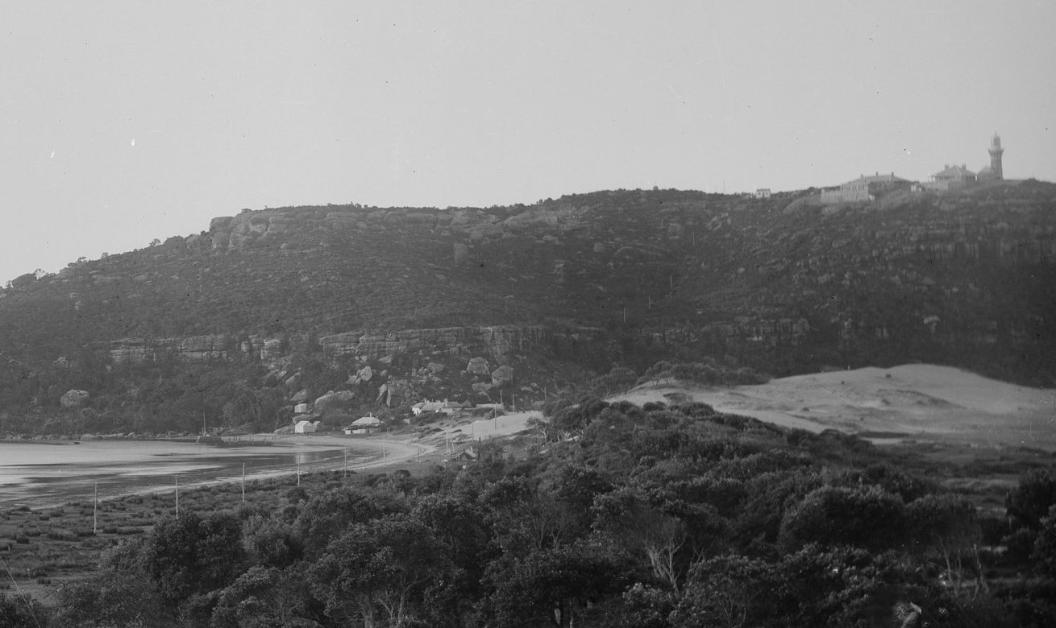
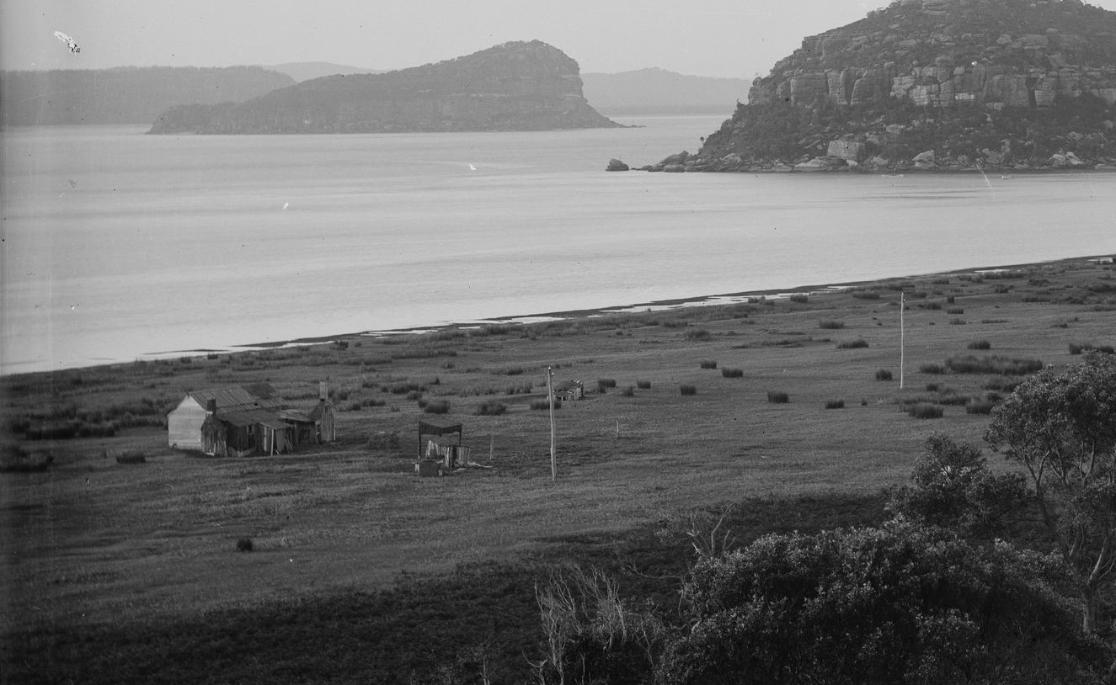
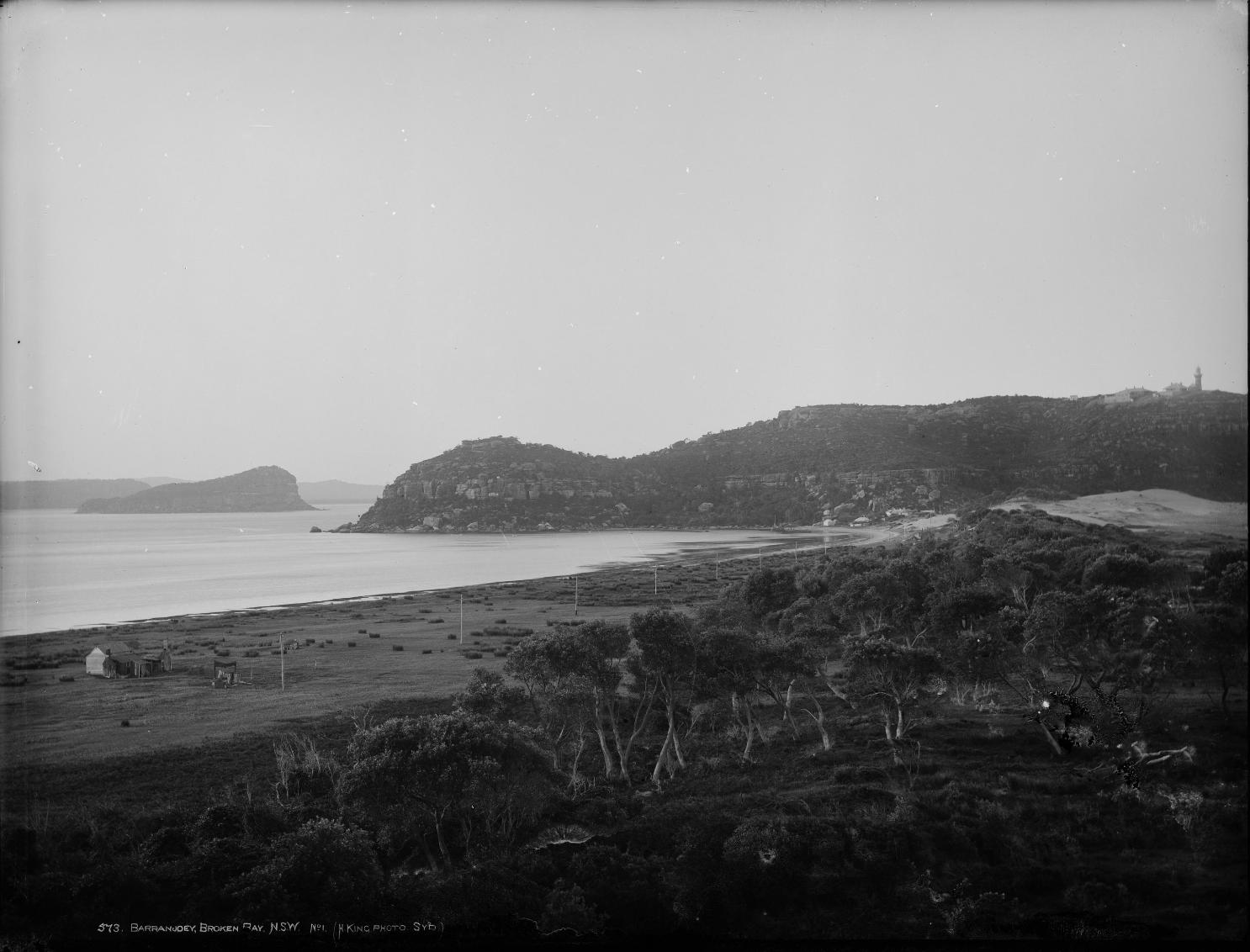
George Mulhall Senior would have been between 71 to 72 years of age by some accounts, and around 66 by others. He may have lied about his age to secure the post and keep his family where they could be housed and fed. He wasn't there for too long though, passing away from a stroke in 1885 and when he did, he was aged, according to numerous records, from 70 to 79!:
Deaths MULHALL. June 25, Mr. George Mulhall, sen., lighthouse-keeper, of Barrenjoey, Broken Bay. Family Notices. (1885, June 30). The Sydney Morning Herald(NSW : 1842 - 1954), p. 1. Retrieved from http://nla.gov.au/nla.news-article28362731
Mr, George Mulhall, the lighthouse-keeper at Barrenjoey, died on Thursday last and was buried yesterday. He was a long time in the service of the Government, and with his brother, was well-known as an aquatic man in the olden days at this Port. EXPORTS.ÂJUNE 27. (1885, June 29). The Sydney Morning Herald (NSW : 1842 - 1954), p. 6. Retrieved from http://nla.gov.au/nla.news-article13591869
What stayed with people who knew him was he was considered the First Champion though, the best of the best who took what was his tradecraft into what became the sporting arena where Australia's First World Champion was from. And that too, through James Punch, another Brisbane Water, Broken Bay and Pittwater man
AN EARLY SYDNEY CHAMPION. One of the pioneers of the oar was George Mulhall, who was born in Hunter street, Sydney, in 1810, but-removed with his family when very young to Brisbane Water. He grew up a grand stamp of man, about 6ft 1in in height, a raw-boned, wiry young follow, who scaled about 12st,in condition, but condition was seldom absent in one who led such a healthy, muscle-producing life as farming, woodcutting, and fishing. what is worthy of note, too, that so many of our subsequent champions Beach, Kemp, Searle, Stanbury, M'Lean all came from the country.
Mulhall, it Is said by one who knew him, never drank a glass of ale or spirits. He believed in lots of hard work for a race tree-chopping, rowing, and walking, with plenty of solid food. He came to Sydney as a waterman subsequently, and was champion in the forties in light and heavy boats. He was not beaten, in waterman's boats until May 24, 1855, and when he retired about 1860 became lighthouse-keeper at Barrenjoey, dying In 1885,. aged 75. His records are mostly gone, for the house he lived in was destroyed by lightning, and one of his sons was killed at the same time by the flash. I have known George Mulhall (nearly fifty years ago writes one who knew him), with a crew of fishermen, all his own mates, row twelve miles from- the north of Sydney to row in the regatta at Sydney the same day in the Whaleboat Race, which was a -great event in those days, when we would have the crews of 14 or 15 whale ships start in a race. I have seen him win after rowing that distance, and beat the picked crew of an American whaler. This vessel carried a broom at the masthead; that is to say, they swept the sea, and had never been beaten, until they came to Sydney. It would have been very hard to get a brow in any part of the world to beat them with the same appliances they utilised in those days, with ash oars, and all the whaling gear in the boat. WORLD'S SCULLERS. (1904, July 20). Referee (Sydney, NSW : 1886 - 1939), p. 1. Retrieved fromhttp://nla.gov.au/nla.news-article120128901
The fire that took his third surviving birth son:
SHOCKING DEATH BY LIGHTNING.
A HOUSE SET ON FIRE. [By Telegraph.] (From our own correspondent.)
BARRANJOEY, Sunday.
This afternoon, during the close of a severe storm which passed over Barrenjoey, ending about 6 p.m., a small two-roomed house near the lighthouse was struck by lightning, and instantly enveloped in flames from end to end. Within a few minutes it was reduced almost to ashes. It was then ascertained that the person occupying the house, a man named William Mulhall, was unfortunately inside at the time of the occurrence, and that he had lost his life. His remains were almost entirely consumed, a portion of the charred trunk being found lying in a natural position on the bed. The lighthouse officials, who were relatives of the deceased, were compelled almost passively to look on, as nothing whatever could be done, the building being a mass of flames when first seen by them. The deceased was a son of the late Mr. Geo. Mulhall, and brother of the present light-keeper. Information has been given to the Inspector-General of Police and the coroner, and the usual inquiry will be held. SHOCKING DEATH BY LIGHTNING. (1888, March 26). The Sydney Morning Herald (NSW : 1842 - 1954), p. 8. Retrieved from http://nla.gov.au/nla.news-article13666158
William was born to George and Mary Ann in 1846 according to the NSW Births, Deaths and marriage records. Possibly named to honour and as a token of his love for his elder brother.
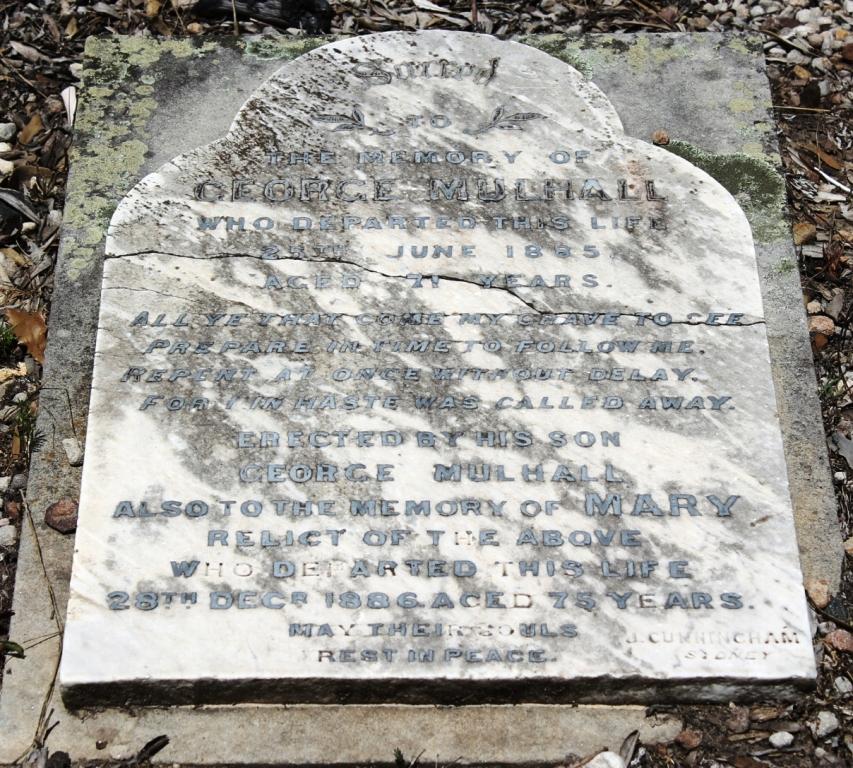
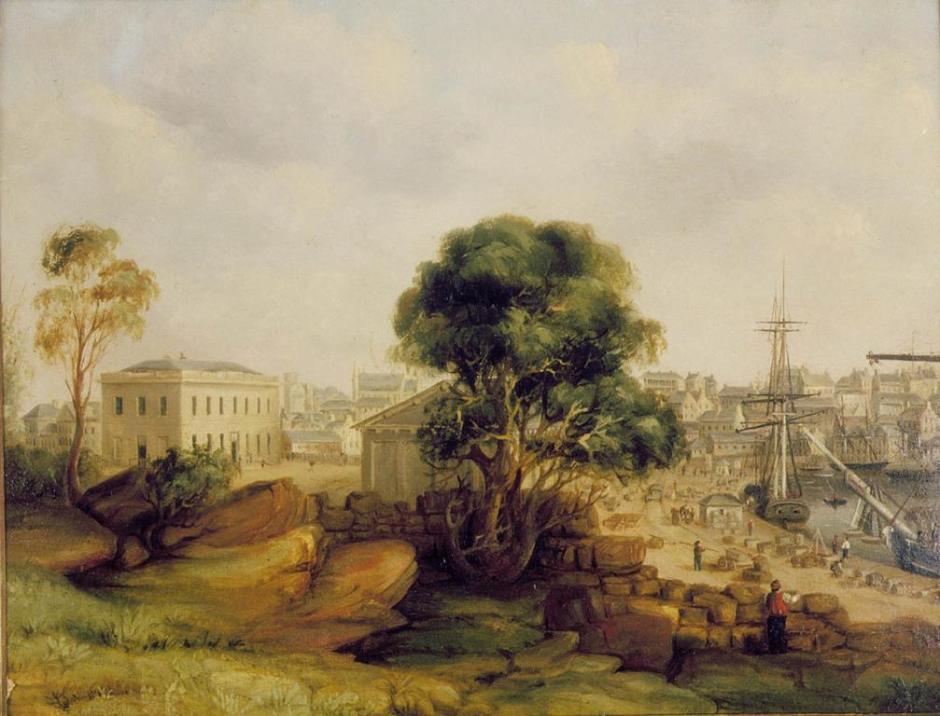
Custom House & part of Circular Wharf, Sydney N.S.W., 1845 / painted by G. E. Peacock - courtesy State Library of NSW - Image No.: a128019
William Mulhall - 1807/09 - to 1890
Records
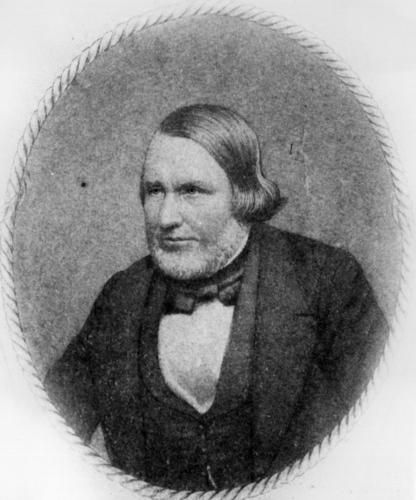
Right: William Mulhall, courtesy ~ State Library of Queensland : digital image collection ~ Portraits, Image No.: 195558
The oldest inhabitant of Pyrmont is Captain William Mulhall, who resides in Harris Street. Captain Mulhall is a native of Parramatta, and was born on 2nd May 1808. He has been a resident of Pyrmont for more than fifty years. He commanded the first steamer brought to this colony - the Sophia Jane - and traded with her up the Hunter. He subsequently entered the A.S.N. Company's service, in which he remained for eight and twenty years. The captain who is still as brisk as a bee, and in the full possession of his mental faculties, recollects the time, more than seventy years ago it is, when Pitt street and Castlereagh street were full of tree stumps, and many a time has he stood and watched the convicts grubbing them out of the soil. Black fellows about Pyrmont in those days? said the captain to the writer. 'Any amount. They most frequented Benelong's Point, where the battery now stands. They had a big camp up there. Oh! I remember them well'. PYRMONT. (1889, July 25). Illustrated Sydney News (NSW : 1881 - 1894), p. 19. Retrieved from http://nla.gov.au/nla.news-article63621825
Letters and Steamer Incidents:
Brisbane Water. Thistle, steamer, Mulhall, sundries, SHIPPING INTELLIGENCE. (1842, December 7). The Australian (Sydney, NSW : 1824 - 1848), p. 2. Retrieved from http://nla.gov.au/nla.news-article37115906
ARRIVALS. March 9.-Thistle, steamer, 127 tons, Captain Mulhall, from Moreton Bay the 6th instant. Passengers-Mrs. Wickham and child, Mr. and Mrs. Friel and four servants, Mr. Manning, Mr. Graham, Mr. White, Mr. Burgoyne, Mr. Beaver, Mr. Driscoll, Mr. Sheldon, and Mr. Jub. SHIPPING INTELLIGENCE. (1846, March 14). The Maitland Mercury and Hunter River General Advertiser (NSW : 1843 - 1893), p. 3. Retrieved from http://nla.gov.au/nla.news-article679884
THE STEAMBOAT ACCIDENT.-Pursuant to adjournment, the Coroner's enquiry as to the cause of the death of Nicholas Welsh, was resumed in the " Oraculum," public house, Phillip-street, yesterday, when it was proved by McDougall, engineer of the Thistle, iron steamer, that from the time of her entering the heads till her arrival at the wharf, the engine had been kept at less than half speed. Sergeant William Adson, of the Sydney police, also proved that Captain Mulhall had kept lights at the mast head, as well as at the bow of the vessel, from the time she came within the Heads till she reached the wharf in Darling Harbour, and that the bell had been kept ringing during the whole of the time the vessel was coming up the harbour. The chief officer deposed that he and two of the men on board the Thistle were forward on the look-out, from the time the vessel entered the Heads, that on seeing the wood-boat, in which Welch was, the words " boat a-head, close under the bow," were passed by them to the captain, by whose orders the engine was not only stopped but backed, and that the instant the wood-boat went down, the Thistle's boat was lowered from her quarter, and every possible exertion made to render assistance. B. Boyce proved, that had the steamer struck the boat with anything like force there could not have been any portion of the boat found, whereas only three of her upper planks had been broken by the concussion. The jury after a few minutes consultation returned a verdict of accidental death, And added, that in their opinion no blame whatever was attributable to any one on board the Thistle at the time the accident occurred. The Coroner said that he fully coincided in the view of the case taken by the jury, and that it was highly creditable to Captain Mulhall, the commander of the Thistle, that he had not only complied with the port regulations relative to steamers to the letter, but had used all the caution which it appeared possible the commander of any steam vessel could exercise in coming up the harbour. ABSTRACT OF SALES BY AUCTION THIS DAY. (1846, November 5). The Sydney Morning Herald (NSW : 1842 - 1954), p. 2. Retrieved from http://nla.gov.au/nla.news-article12900438
The Steamer 'Thistle.' An unfortunate occurrence took place on board this steamer on Tuesday, whilst on her passage from the Hunter to Sydney. When about two miles to the northward of Cape Three Points, cry of a person being overboard was heard from the forepart of the vessel, Captain Mulhall immediately stopped the engines, and then reversed them ; the boat was instantly lowered, and the vessel rounded to, but nothing could be seen of the person reported to be overboard. Upon enquiry, however, of the passengers forward, it was ascertained that a female, who had gone on board at Newcastle, had thrown herself over the side, that one or two of them had endeavoured to frustrate her purpose, but her shawl coming off in their hands, they were unable to do so. There is no doubt that the unfortunate woman was drowned but every exertion was made by the master, officers, and crew, to save her, to a statement bearing testimony of which the whole of the passengers on board have signed their names. TABLES OF RATES UPON VESSELS AT THE PORT OF SIDNEY. (1847, May 8). The Shipping Gazette and Sydney General Trade List (NSW : 1844 - 1860), p. 482. Retrieved from http://nla.gov.au/nla.news-article161164942
THE STEAMERS.-The quickest passage (yet on record) from Williams Town, Port Phillip, to this Port, was made some five years ago by the Thistle, steamer, Captain William Mulhall. This was done in 52 hours from that place to the A. S.N. Company's Wharf, Sydney, and including a detention of four hours at Twofold Bay, thus reducing the actual sailing time to forty eight hours independently of the time occupied by divorcing from her proper course. Captain Mulhall also made the trip from the bar of Moreton Bay to the Hunter River Wharf in 40 hours. These passages have never yet been beaten. SHIPS' MAILS. (1853, November 22). Empire (Sydney, NSW : 1850 - 1875), p. 2. Retrieved from http://nla.gov.au/nla.news-article60146490
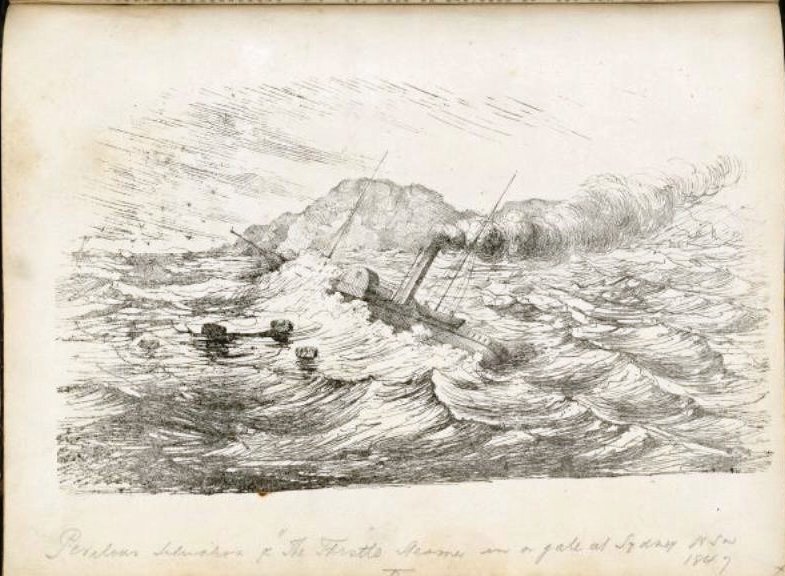
Perilous situation of 'Thistle' steamer in a gale at Sydney, N.S.W. (Sydney : W. Baker], 1848. 1 print : lithograph , Image No.: nla.pic-an8152973 courtesy National Library of Australia
It is in contemplation by the inhabitants of Newcastle and Maitland, to present Captain Mulhall, of the steamer Thistle,with a testimonial, as a mark of the esteem and respect in which he is held by the community; he has been master of different steamers on the coast for the last twenty years, and has made from 1500 to 2000 trips, between this port and Morpeth ; the zeal and ability which he has always evinced fully entitle him to some substantial reward. No title. (1854, January 23). The Shipping Gazette and Sydney General Trade List (NSW : 1844 - 1860), p. 13. Retrieved from http://nla.gov.au/nla.news-article161106333
WRECK ON THE COAST,-Captain William Mulhall of the A.S.N.C'o.'s steamer Collaroy, on ascertaining that a wreck was supposed to have taken place somewhere in the vicinity of Terrigal Beach, determined to examine the coast on his passage to Newcastle. When going down on Thursday last, he saw a spar sticking up on the surface of the water, but not having discovered it until he was some considerable distance from the place, he took the bearings of it, and determined to Inspect it minutely on his return to Sydney. When he came to the place on returning from Newcastle, he lowered a boat with the chief officer and four of the crew, who reported that it was the top-mast of a schooner or brig, but could not say which. The chief officer was of opinion that the spar was fast to the hull of the vessel at the bottom, but nothing that would lead to the name of the vessel was seen. The locality is about two miles from the shore off the rocks at Terrigal Head. Great praise is due to Captain Mulhall for his zeal In Investigating this matter, as it will no doubt be enquired into by the authorities. This is probably the vessel of which portions were seen floating between this port and Newcastle, and reported by the steamers trading to the Hunter, and also the same as that reported by the oyster boat some weeks since, portions of which were seen at Tuggerah Beach.-Empire, Aug. 29. SYDNEY SHIPPING. (1859, September 1). The Maitland Mercury and Hunter River General Advertiser (NSW : 1843 - 1893), p. 3. Retrieved from http://nla.gov.au/nla.news-article18642584
MATTER FURNISHED BY OUR Reporters and Correspondents. SUPREME COURT, CIVIL SIDE.WEDNESDAY, MARCH 25. - Before his Honour the CHIEF JUSTICE and a Special Jury. Wilson and others v. Grose and others.- This was an action on the case, for damages sustained by the negligence of the defendants' servants on board the steam-packet Sophia Jane, while on her passage from Sydney to Newcastle, on the 12th January,1835. Mr. Foster briefly stated the case for the plaintiffs, who are the proprietors of the Tamar, and called the captain of that vessel, who deposed, that on the day previous to the one mentioned in the declaration, he left Sydney in the Tamar, as her captain; that shortly after starting, the Sophia Jane also got under weigh, and appeared to be under a press of steam and canvas; that as he did not wish to reach his destination before day-light, he kept under easy sail, and a less press of steam than he otherwise would have done; that the captain of the Sophia Jane appeared to hang about him; he did not keep a direct course. The Sophia Jane had once crossed the Tamar's bow so closely, that he was obliged to alter the course of the Tamar, in order to prevent her from running foul of the Sophia Jane; the Sophia Jane had also twice crossed the track of the Tamar in her wake, about twelve at night. The Sophia Jane, which had previously shot some miles ahead, appeared to lose ground, and the Tamar came up with her ; he thought the reason why the Tamar gained on the Sophia Jane at this time, was, because they were cleaning out the Sophia Jane's fires ; had the Sophia Jane kept on her way, she must have reached Newcastle an hour and a half or two hours before the Tamar. After twelve o'clock the Sophia Jane again shot ahead, passing to wind-ward, close under the Tamar's stern ; she was abreast of the Tamar at about twenty minutes to one, and at one o'clock the Sophia Jane was about a mile ahead. He (witness) now called the mate, and gave him directions how to steer, and left the vessel to his charge, as it was his (witness's) watch below at twelve o'clock, and he had only stopped on deck, from seeing the Sophia Jane keep so close to him, for fear of an accident. He then turned in, but was awoke by hearing his mate call to the man at the helm, "hard a starboard," and guessing something must be wrong, he sprang on deck, and saw a vessel with a sail on her, but could not make out what she was at first - shortly after he discovered that she was the Sophia Jane bearing right down upon him ; he then hailed the captain by name, telling him to stop his engine ; the Tamar's engine had been previously stopped by the engineer. At that time, the man at the helm had been directed to put the helm a starboard, and the 'Tamar was rounding off her course, when the Sophia Jane's cut-water struck the Tamar on the starboard beam, about the centre of the paddle-box. At the instant of the collision, he saw Captain Mulhall standing at the bowsprit of the Sophia Jane, and again requested him to stop his engine, but received no answer. When he called out, the bowsprit of the Sophia Jane was tearing the netting of the Tamar; the bowsprit next came in contact with the Tamar's boat, which hung on her quarter; one of the davits was broken by the shock, and the boat torn off; when the davit gave way, he heard Mulhall sing out, "stop her, stop her."
A few seconds after this, Mullhall cried out " go on ahead" - when the Sophia Jane again struck the Tamar, and carried her taffrail away, with her bowsprit, which was broken by the shock ; the Sophia Jane then fell astern, and he saw no more of her till she arrived at Newcastle, a few minutes after the Tamar. After they got clear, his engineer asked him, whether he should set the engine on again? and witness told him to do so ;but when the engine was set on, it would not work, from the wreck of the paddle-box having got entangled with the wheel; he called all hands to clear the wreck, and the engine at last made way, by throwing off the broken part of the paddle box. It was about ten minutes after the Sophia Jane left them, before the engine could be set going ; he got into Newcastle a few minutes before the Sophia Jane. He also stated, that just before the collision, when he came on deck, the Tamar had Newcastle on her starboard -bow; her head was about N N W, and therefore her head must have been inclined a little to the land, while the head of the Sophia Jane was directly in to the land, on the westward. She appeared to be steering S S W. and when she neared the Tamar, he saw that her engine was going. The damage sustained by this vessel, was estimated at between £60 and £65 ; besides, she had been detained one trip in order that the damage might be repaired ; he was cross-examined by Mr. Wentworth, for the defence, and stated, that the Sophia Jane was to windward, and the Tamar being near the land, her due course was north by east, and he could not say, whether the Tamar overtook the Sophia Jane, or the Sophia Jane waited for the Tamar; supposing that the Sophia Jane was to windward if he had felt it necessary to pass her, both vessels being under weigh, he should have passed under her stern, and would have done the same. had she been lying to ; he did not think that this damage could have been done by the Tamar shearing against the Sophia Jane , so the Sophia Jane must have struck her farther forward than she did, but it might have happened had the Sophia Jane been forereaching. The bowsprit of the Sophia Jane was not carried away until after the beam of the Tamar had been broke by the concussion, it was very strong, and would resist great pressure. When he came out on deck, he found his men trimming the vessel ; it was a dark night ;there had been a moon, but not a full one ; there was thick weather, and it was not day-light till they reached Newcastle. In answer to a Juror, he said, there was a great flame from the funnel of the Tamar, but none, or very little, came from that of the other vessel.
Joseph Woodley, mate of the Tamar, deposed, that about ten minutes past twelve, he took charge of the deck of the Tamar, from Captain Ellis; the course given him was north by east - he kept this course till about a quarter to one, when he was obliged to alter it, by the Sophia Jane crossing the Tamar's bow. At this time, the course was altered a point and a half or two points ; the Tamar kept a direct course, while the Sophia Jane was sometimes to windward, and at other times to leeward; after clearing the Sophia Jane, he again brought up to the north by east course. About twenty-five minutes to three, he saw the Sophia Jane steering to the north-ward, when he altered the Tamar's course to north, which made Newcastle light bear north half west; he went forward at this time, and saw the Sophia Jane to windward - her distance might be a mile or a mile and a half. As the Tamar had a list, he called the men on deck to assist him to shift a cask to the other side of the vessel, and was holding a horse until they got it taken over and secured, when the steersman sung out "a sail ;' when deponent looked over the paddle-box to windward, and saw the Sophia Jane bearing right down upon them ;he instantly called out, to put the helm hard a star-board to which the helmsman instantly answered, and the Tamar rounded off three or four points from her course. Before the Sophia Jane struck her, he repeatedly called to Captain Mulhall to stop his engine, but did not receive any answer till after the shock, when he heard Mulhall call out "stop her," and after they were cleared, he heard him say, "goon," by which he understood he was ordering the engine to work again. After the vessels had cleared, he sounded, and found that his vessel did not make any water. On cross-examination, he stated, that he must have heard it if they had hailed, as the Sophia Jane was to windward ; it was blowing fresh at the time, and there was a considerable sea running. The Sophia Jane appeared under weigh; he did not believe that she was lying to when she struck the Tamar. His vessel (the Tamar) was going about eight miles an hour when they struck, one had a square sail on her. The Sophia Janet was also running at a good rate, her engine was going, and she had her fore and aft sail set, which completely hid her funnel until a few seconds before they struck. Both vessels were close in shore, which was distant about two miles.
Evan Owen - Was at the helm when the vessels struck, and had been so from two in the morning ;he was directed, when he went to the helm, to steer north by east, which was altered to north a little before the Sophia Jane crossed the bow of the Tamar, which was between two and three o'clock, when she went to windward. After this, he took his old course, and he then saw the same vessel about a mile distant, keeping the same course, with the Tamar on her weather bow ; he saw her alter her course about five minutes before she struck the Tamar. When the course of the Sophia Jane was altering, she was coming directly down on them ;he put the helm hard a starboard, and sung out, "a sail close on the weather bow." When the vessel struck, the course of the Tamar was altered, three points at least. Cross-examined - It was roughish at the time; could see no moon; the Tamar had a square sail set, but it did not prevent him seeing the Sophia Jane, which appeared to be coming down at full power, with her fore top sail full and her engine working ;she could not have come down so rapidly, had she been forereaching; she might have been close hauled. The rest of his testimony was corroborative of that of the captain.
William Orr, engineer of the Tamar, deposed, that during most of the night, he was on deck. When the Sophia Jane was coming down, the mate pointed her out to him, & he went to his station for fear of an accident ; he saw her about two minutes before she came up, and thought her a sailing craft; as her sail concealed her funnel, and the darkness of the night prevented him from seeing her more distinctly ; he supposed her engine was going from the rapidity with which she neared them ; he stopped the Tamar's engine before she came in contact; the Sophia Jane struck the Tamar at right angles; he did not think that two minutes would allow two steam-boats to clear each other in the circum-stances he had detailed, but a steamer would clear a sail-boat in that or even less time.
William Richards, seaman, detailed the circumstances in the same manner as the other witnesses, but would not swear as to the rate at which the Sophia Jane came down upon her and struck her.
William Anthony, passenger on board the Sophia Jane, deposed, that he was in his berth awake, and felt the shock; after the first stroke, he heard the captain calling out to stop the engine, and the word was passed along by some person calling out, "for God's sake - stop the engine ;" it was a little time after this that it did stop; he heard no word passed along about the engine before that shock; he must have heard it if it had passed; there was no one passed along the deck on his side. Before the accident, he was awake upwards of an hour; he thought the Sophia Jane had struck a rock, and when he sprung from his berth, he saw it was a steam-boat they had got foul of ; he knew this by seeing the funnel of the Tamar, which showed a good light.
William Frost, passenger on board the Tamar - was awake in his berth at the time they struck; heard a cry of "hand a starboard" after the shock; he sprang on deck, and thinking they were going to the bottom, he got hold of the Sophia Jane's bow-sprit ; he heard some one say "go on," after which the Sophia Jane crossed their stern; he called on her to stop, but they returned no answer. This closed the plainitiff's case.
Mr. Wentworth for the defendants stated, that he would not object to the evidence which the plaintiffs had produced to establish their claims ; on the contrary, he would maintain that it was generally true, in all those points relating to the Tamar ; and even in many things touching the Sophia Jane, the witnesses had managed to guess pretty correctly ;he should, however, offer a little evidence from on board the Sophia Jane, and also from other quarters, although he felt convinced, that he might rest his defence wholly on the plaintiff's' evidence; who had shown that it was a pure casualty, in so far as the Tamar was concerned, except, that while trimming their own vessel, with a view to her beating the Sophia Jane, they had kept no look-out, which led to the occurrence; and therefore if blame lay any where, it lay with the Tamar.
Captain Mullhall of the Sophia Jane deposed, that on the morning of the 13th January, it was his watch below from twelve till four ; he was awoke from his sleep by the cabin furniture tumbling in upon him ; he ran upon deck, and found that the tiller chains had snapped and the vessel was breached to; she was lying with her broadside to the sea, and her head was lying West South West ; the mate was forward calling the hands, and the others were busy getting blocks and tackles to secure the tiller; while this was being done, the Tamar ran right across their bow; he was forward and several of the men at the time of the accident ; his engine had been stopped for about ten or twelve minutes, and the fore sheet was haul'd to windward, which gave the Sophia Jane a little headway - not more than a mile in the hour; they saw the Tamar coming up, and thought she was coming to their assistance ;she was running right before the wind, having her square sail set; there were lights on board the Sophia Jane, besides which the cook's galley was open, which shewed a great light; there were two lanthorns on board, one of which had been at the mast-head, but having gone out, was taken down to be trimmed, and was afterwards used in looking for the blocks and tackle to secure the tiller, and steer the vessel by. The first intelligence he received of the Tamar's approach was from the mate, who cried out that a vessel was bearing down upon them; if the Tamar had passed astern as she ought, the accident might have been avoided ; the morning was cloudy and dark ; they were about two miles from the shore; if the Tamar had kept a good lookout, she might have avoided the Sophia Jane, either by going ahead or astern, or by taking a course in the direction in which the Sophia Jane was lying.
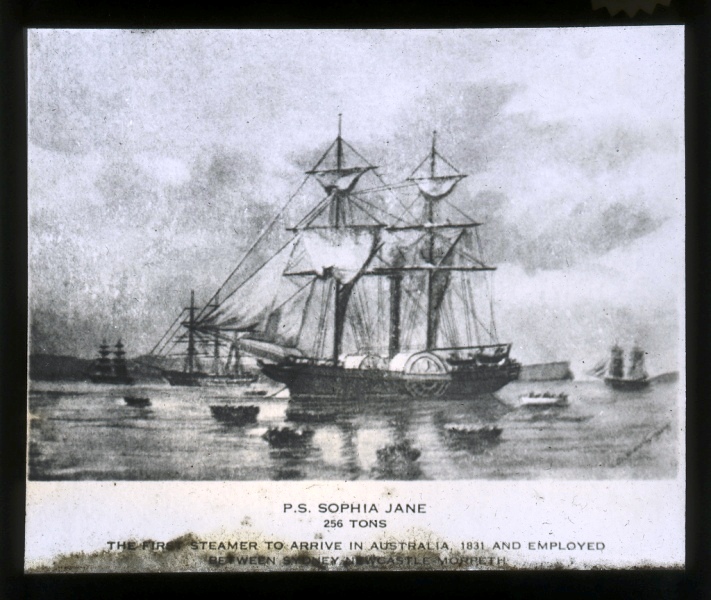
Sophia Jane, original plate, 1841.
Cross-examined by Mr. Foster - The vessel was quite unmanageable at the time ; it was the first time since he had been in her that the tiller-chains had broke; it would have taken a hour to shift the casing ; all the wood work on which the steersman stood having to be pulled down ; they never think it necessary to make provision at sea for such accidents, as they are of rare occurrence; the head of the Sophia Jane could not have been turned in any other direction ; the Tamar was about twenty or thirty rod off when he first saw her ; the Sophia Jane's engine was stopped ten minutes before the accident occurred ; the steering tackle was not hooked till after the collision had taken place ; did not recollect Mr. Ogilvie being present, when Ellis asked why the engine of the Sophia Jane was not stopt.
Re-examined - The engine was stopped to keep the Sophia Jane off the shore ; if he had backed the engine, he might have carried away his rudder; it was not safe to keep the engine going when a steam-boat broached to, and the jib would not have made her pay off, unless she had got head-way ; particularly as she was so long a vessel, being one hundred and twenty-five feet in length. Joseph Bryant deposed, that he was mate of the Sophia Jane on the night that she and the Tamar ran foul of each other ; when it occurred it was his watch on deck, and the tiller chains had broken ; he was forward when it broke; he went aft to see what had occurred, and called to the captain to get the tiller secured ; he did not see the Tamar above five minutes before she crossed the line in which the Sophia Jane was lying ; the engine had been stopt before they came in contact, and the sail was backed when the collision took place.
Charles Joliffe, clerk of the Sophia Jane, was on deck when the chain broke, but he could not swear that the engine had been stopped before they struck, but thinks it was, for the word was passed along to stop it when the Tamar came in sight, in order to prevent the mischief.
Alexander Mackie fire-man of the Sophia Jane, deposed that he was one who passed the word along to stop the engine, which he thinks was done four or five minutes before the vessels struck, but could not swear positively ; he recollects that the tiller had frequently broken, but the chain only once be-fore ; he thought it impossible to stop a steam-boat all at once.
John Goldfinch, a seaman, was a passenger and standing by the paddle-box when they struck ; he came up when the tiller-chain broke ; he first saw the Tamar about two or three lengths off, and the Sophia Jane was lying like a log on the water, and the engine was stopped; just as the vessels cane in contact he passed the word along to stop the engine; he also made a great noise, calling out to the people in the Tamar to stop their vessel ; the wind was from the southward, and the Sophia Jane was heading into the land.
Captain Church - Surveyed the Sophia Jane and the damage done to her was by the vessels shaving each other; his only reason for this judgment was, that the breaking of the bowsprit had been caused by the Tamar's running across the Sophia Jane's bow ; he also considered that the bowsprit might be broken in the same way by the Sophia Jane's coming in contact with the Tamar; he did not know that it was the usage of vessels, when lying-to on this coast to hoist a lanthern; if possible, when he had to pass a vessel which was lying-to, he would pass astern of her.
Mr. Foster for the plaintiffs contended, that the evidence of the defendants had only strengthened his case ; if they went unskilful men out in charge of their vessels, if they sent out these vessels ill prepared, or so constructed that an accident could not be instantly repaired, then there was negligence on their parts ; besides, all their witnesses had proved that the engine of the Sophia Jane was not stopt until she had run into the Tamar, which was running in her proper course.
The Chief Justice, in summing up stated, that it was a case in which he felt considerable difficulty; in England such cases were tried before the Admiralty Court; however, the Jury were to deal with it as a matter of common law. The law of the road was similar to that of the high sea; it was the duty of both parties to look out, and if there was a mere casualty, that could not have been avoided, they were bound to return a verdict for the defendant; who were as well as the plaintiffs, liable for the negligence of their hired servants. The Jury retired about an hour, and returned a verdict for the defendants. MATTER FURNISHED BY OUR Reporters and Correspondents. (1835, March 28).The Sydney Monitor (NSW : 1828 - 1838), p. 2 Edition: MORNING. Retrieved from http://nla.gov.au/nla.news-article32148587
TO CAPTAIN MULHALL, STEAMER COLLOROY.
[PER FAVOUR OF THE EMPIRE.]
Sir-Permit me thus publicly to tender you my most heartfelt acknowledgment, and warm admiration of the prompt humanity which brought you alongside the Nora Creina, steamer, in answer to our signals of distress. 'Tis true the night was calm-for which God be thanked-and the danger less; still there was imminent danger, we were within 150 yards of that dread rocky coast, where the Dunbar met her fearful doom ; we were powerless, you drew alongside, took us in tow, and brought us safe to our moorings at the Phoenix Wharf ;for which humanity and marked urbanity, I shall ever feel most grateful, and ever retain the most lively and sensitive recollection.
I would also express my admiration of the prompt action of the pilots. They answered our second signal and five boats were with us within half-an-hour, but alas !what fearful disasters might not have occurred within that short space of time-though short, an age in time of peril.
The proper authorities will no doubt enquire into the cause and nature of this accident; I am not competent to give any opinion on the subject, except upon report, which I seldom rely upon, but if report speak truly, there is very great blame attachable to the proper authorities-or the engineer and Government Inspectors.
I am, Sir,
Your most grateful and much obliged servant,
GEORGE UNDERWOOD ALLEY.
Sydney, September 20th, 1857.
TO CAPTAIN MULHALL, STEAMER COLLOROY. (1857, September 30). Empire (Sydney, NSW : 1850 - 1875), p. 5. Retrieved fromhttp://nla.gov.au/nla.news-article60267270
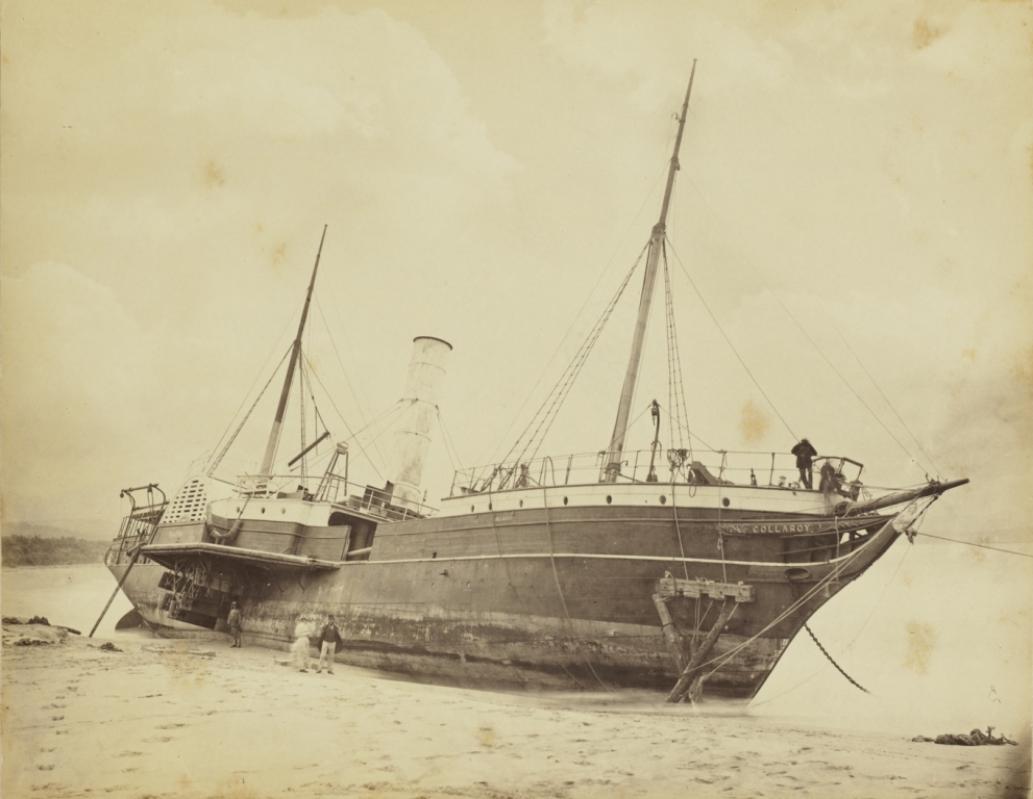
Wreck of the S.S. Collaroy, 1881 / photographer unknown. State Library of NSW Image No: a1528938: A passenger steamer owned by the Australian Steam Navigation Company, built in 1853, went ashore on Collaroy Beach in 1881 and remained there for 2 years, giving her name to the stretch of sand and ocean. When refloated she went back into service plying between Sydney and the Hunter River. She was withdrawn from duty in 1886, converted to a schooner, sailed to San Francisco, where she again ran ashore and broke her back on the Californian Coast in 1889.
TAMAR STEAMER. THE Public is -respectfully informed that the above vessel, being now completed, will resume her trips under the command of Captain Mulhall, on Monday evening next, the 26t instant, at 7 o'clock, and continue to ply between Sydney and the Green Hills, leaving the former place every Monday and Thursday evening, and the latter every Wednesday and Saturday morning at eight precisely. As the same punctuality in starting will be pursued as heretofore, it is requested that all persons may be on board at least 6 minutes before the hour appointed. Any further information may be obtained on application to Mr T. W. Ellis, on the Wharf,.or.to JNO). T. WILSON, Solo Osbher. N.B. The owner begs to give notice that he will not be accountable for any goods shipped in bad condition, for leakage, or for any parcel or package containing money, jewels, or other valuables, unless regularly paid for, and eitered accordingly. Wilson's Wharf,19th September, 1836. Advertising. (1836, September 21). The Sydney Monitor (NSW : 1828 - 1838), p. 3 Edition: MORNING. Retrieved from http://nla.gov.au/nla.news-article32152234
LOSS OF THE CUTTER " VULCAN."
The above vessel, the property of Mr Dawson, we regret to state on entering New-castle on Saturday last, was entirely lost, and the master, Mr Craven, three of the crew, and two men belonging to the Pilot's boat perished. The wind at the time was blowing strong from the South, and when the Vulcan came under the lee of Nobby's Island, she was becalmed and drifted rapidly over towards the opposite rocks. When about have way over the ballast shifted, she capsised and went down, carrying with her the master and crew and the two men in the pilot boat. Captain Mullhall of the Tamar, exerted himself to the utmost without effect to save the lives of the unfortunate Individuals. [This tragedy confirms us in the opinion which we had before formed of the urgent necessity of a lifeboat with a competent crew being placed at this dangerous part. We trust the authorities will lose no time in attending to this matter.]Â Ed. LOSS OF THE CUTTER "VULCAN.". (1837, December 29). The Australian (Sydney, NSW : 1824 - 1848), p. 2. Retrieved fromhttp://nla.gov.au/nla.news-article36858328
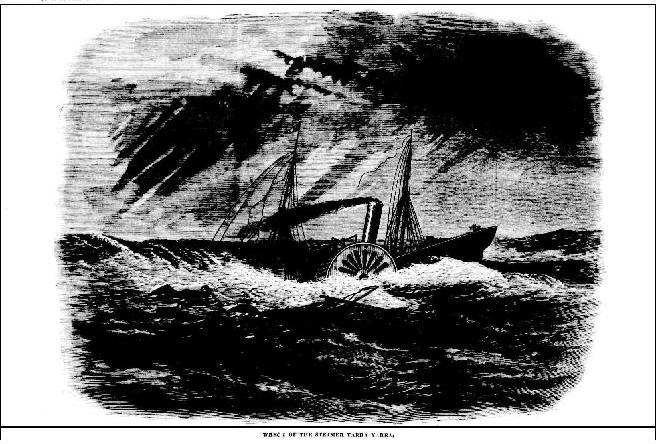 Original Correspondence.
Original Correspondence.
To the Editor of the SYDNEY MONITOR.
SIR,-Yesterday, on my return from the Green-hills, (as master of the Tamar) we passed the Sophie Jane, but observed nothing in her appearance indicative of distress, nor did we see or hear any signals. Late in the evening, a boy on board said, he thought he observed a light flash on board the Sophie Jane, as if some one were firing a gun ; but as no report reached us, and it was not repeated, no notice was taken, particularly as several times on occasion of their running upon the flats, they had fired their swivel by way of humour. Had I had the least suspicion that she was disabled, or required help, I should have considered myself wanting in the common feelings of humanity, if I had not returned immediately, and rendered every assistance in my power ; for who can answer, but that a similar accident may next occur to myself ?Trusting you will give publicity to this statement, and thus furnish me with the means of vindication, I am, Sir, Your very obed't Serv't, WILLIAM MULHALL. Tamar Steam-boat, Thursday evening, June 14, 1838. Original Correspondence. (1838, June 18). The Sydney Monitor(NSW : 1828 - 1838), p. 2 Edition: MORNING. Retrieved from http://nla.gov.au/nla.news-article32160412
'THE TAMAR AND SOPHIA JANE'.
TO THE EDITOR OF THE COLONIST.
Sydney, June 19, 1838.
SIR.-"I find my absence from Sydney has been made use of for the unrestrained indulgence of very harsh reflections upon my character with respect to the accident that occurred to the Sophia Jane on her last return from the Greenhills, and in a letter appearing in your columns on the 16th instant, signed "A Passenger by the Sophia Jane," the writer states, "in my opinion it is perfectly impossible that our distress should not have been observed by that good Samaritan the Tamar;" and follows up that uncharitable remark by an invidious sneer that could only have emanated from a bosom devoid of all charity. I beg, most unequivocally and distinctly, to state, I was not aware of the accident, nor were any signals heard or seen by any on board the Tamar ; and I should have considered myself beneath the brutes of the creation, if, knowing her distress, I could have abandoned her to her fate. You will, I trust, give insertion to this letter, to enable me to refute the caluminious reports so unsparingly propagated.
I am, Sir, Your most obedient Servant,
WILLIAM MULHALL
Master of the Tamar.
THE TAMAR AND SOPHIA JANE. (1838, June 20). The Colonist(Sydney, NSW : 1835 - 1840), p. 2. Retrieved from http://nla.gov.au/nla.news-article31721202
To the Editors of the Maitland Mercury.
GENTLEMEN-It is pretty extensively known that I have been in command of one of the Hunter River line of steamers over twenty years, the whole of which time it has been my study to avoid making statements of a personal nature; and by the observance of every possible precaution to prevent injury to others, have successfully passed through the whole above period without having occasion to solicit the favours of Messieurs Editors for a corner in their paper until the present, and will there-fore, without further apology, trouble you to give insertion to the following particulars of the collision-not having seen, or having any previous knowledge of the paragraph referred to, what Captain Barnes, of steam-ship Williams, has attempted lo do in his letter, but failed. On Saturday last, 7th instant, the two steamers arrived at Newcastle from Morpeth about the same time-the Collaroy at the new, and the Williams at the old wharf, blowing fresh from the W.N.W. After landing passengers and cargo, the Collaroy turned ahead, but, could not clear the wharf-reversed the engines, and was going out astern, and would easily have cleared everything ; when, strange to say, the Williams steamed down the channel, and came in collision with the Collaroy (although our engines were stopped), striking us on the starboard quarter, injuring the life-boat, splitting the quarter-deck rail, bending the awning stanchions, and doing other slight damage, which could easily have been avoided if common precaution had been observed.
It is well Captain B. mentions that be got a lead of 10 miles, as probably it will account for the surprise expressed at his being first in, although the Collaroy was nearly 2 feet deeper laden
I am, gentlemen, your obedient servant, WILLIAM MULHALL, Commander of steam-ship Collaroy. Morpeth, 13th June, 1856. To the Editors of the Maitland Mercury. (1856, June 14). The Maitland Mercury and Hunter River General Advertiser (NSW : 1843 - 1893), p. 2. Retrieved from http://nla.gov.au/nla.news-article18649780
To the Editor of the Empire
Sir- a letter signed James M'Clune, of the schooner Perseverance, reflecting upon my character, appeared In your Friday's publication, and as all such assertions should bear the stamp of truth, I took the first opportunity of communicating the real facts of the case. Perceiving on my going to Newcastle that the vessel was in distress, I went within hail and asked if they wished to be towed into port, the reply was Yes ; a warp was then sent on board. I then said you must give up charge of the vessel to me whilst towing you, otherwise I cannot take you. Captain M'Clune said he would not do so, and let go the warp. The Collaroy again steamed within hail, and the hawser was again sent on board. Captain M'Clune asked me what I would charge to tow him in. I said that would be settled by the directors or arbitration; he Indignantly objected and let go the hawser.
As to his statement that he offered very reasonable compensation, if he did so he must have spoke in a very low tone of voice, us no one on board the vessel heard him ; and I distinctly deny that I made any demand for salvage. I beg also to state that my orders from the Directors are that I am not to tow vessels at sea without their express orders ; and, therefore, what I did was on my own responsibility, and for the purpose of assisting the vessel, which appeared in distress, and consequently it was not in my power to fix any price. Trusting you will report this, I am your's obediently,
WILLIAM MULHALL.
Steamer Collaroy,
2nd September, 1854
To the Editor of the Empire. (1854, September 4). Empire(Sydney, NSW : 1850 - 1875), p. 4. Retrieved from http://nla.gov.au/nla.news-article60194585
The Illalong (s ), for Morpeth, brought down a number of visitors to view the regatta, &c. The Collaroy came in at one o'clock, and at the request of several parties residing at Morpeth and Raymond Terrace, Captain Mulhall kindly consented to stay at the wharf for two hours, so as to enable those parties to witness several other races and enjoy more of the amusements of the day. The kindness of Captain Mulhall in complying with the request to delay his boat was highly and deservedly appreciated. NEWCASTLE. (1863, January 3). The Sydney Morning Herald(NSW : 1842 - 1954), p. 5. Retrieved from http://nla.gov.au/nla.news-article13071944
IRON STEAMER TO THE HUNTER. REDUCED FARES. The NO T I C E. THISTLE, Iron steamer, W. Mulhall, Commander, will resume her trips to the Hunter, leaving Sydney for Morpeth on Thursday next, the 17th instant, at ten o'Âclock r. M. FARES. Cabin. Steerage,s. d. s. d. To Newcastle . 6 0 3 0 Raymond Terrace...... 7 0 3 6 Morpeth. 8 0 4 0Freight, dead weight, per ton, 8s. 'Ditto measurement, ditto, 12s. 6d. FRANCIS CLARKE, Manager. Hunter River Steam Navigation Company, Sydney, 11th October. 1844 Advertising. (1844, October 16). The Sydney Morning Herald(NSW : 1842 - 1954), p. 1. Retrieved from http://nla.gov.au/nla.news-article12417206
Charge of Larceny. Tuesday last: Peter Onslow, a seaman on board the steamer the Thistle
Charged under the entinen, was brought before the bench, charged by Captain Mulhall with stealing ale. It appeared that on Friday, the 20th ult., Onslow was found by -Mr. Beale, the chief officer of the Thistle, catching ale in a bucket from a cask, a portion of the cargo, the ale being running from the tap-hole, the cork in which was loose; Mr. Beale said "What are you doing there, are you broaching the cargo'. Onslow said the cask was leaking, and the after running away ; Mr. Beale had shortly before seen the cask apparently all right, and he said ''I'll make you pay for that," or "I'll charge you for it;" Onslow said " Very well," and he subsequently remarked that the ale had better be drunk than run to waste, and he proceeded to draw more and give some to his shipmates ;Captain Mulhall, on hearing of this, stopped it, and gave Onslow into custody on a charge of stealing the ale. The case was postponed till yesterday for evidence as to who was the owner of the ale. Yesterday Mr. Beale deposed that the ale was shipped by Mr. Wright, of Sydney, and consigned to Mr. Wade, of Maitland ; he could not say how much of the ale was deficient. Mr. Turner, who appeared yesterday for the prisoner, contended that he had committed no larceny in taking what the chief officer had sold to him. The bench differed somewhat in opinion on the case, two magistrates thinking it was not a case of larceny, and the third thinking it ought to go to a jury to decide. Ultimately the depositions were forwarded to the Attorney General for his opinion, and Onslow was remanded, with liberty to procure bail. COMMERCIAL AND MARKETS. (1852, April 3). The Maitland Mercury and Hunter River General Advertiser (NSW : 1843 - 1893), p. 2. Retrieved from http://nla.gov.au/nla.news-article671386
His Excellency's Visit to the Hunter Departure for Sydney. - On Saturday morning last Sir George Gipps and parry left government cottage, East Maitland, for Morpeth, escorted by twenty or thirty gentlemen on horseback, and five or six gigs. On reaching the steamer (Thistle),three cheers were given for Sir George by the assembled crowd, and at eight o'clock the steamer left for Sydney. Sir George was accompanied to Newcastle by Mr. Day and Captain Day, and on the passage down handed Mr. Day a cheque for £10, as his Excellency's donation towards the completion of the Episcopalian church at Paterson, which had been inspected in its unfinished state by him the day previous. The Thistle left Newcastle about noon, but the weather getting bad towards night, Captain Mulhall put into Broken Bay, and left again for Sydney early on Sunday morning, where she arrived about ten o'clock. In consequence of the unexpected return of his Excellency at that hour, but few persons could assemble in time to meet him at the Circular Wharf. INSOLVENCY PROCEEDINGS. (1844, November 16). The Maitland Mercury and Hunter River General Advertiser (NSW : 1843 - 1893), p. 2. Retrieved from http://nla.gov.au/nla.news-article670268
The Steamer ' Thistle.'The Thistle left Newcastle on Saturday last at noon, having on board His Excellency the Governor, Lady Gipps, and suite, together with several other cabin passengers. Upon leaving Newcastle the wind was blowing fresh from the southward, but at nine p.m. it increased to a gale, and a heavy sea springing up, Captain Mulhall deemed it advisable to take shelter in Broken Bay, for which he bore up. Upon entering, the vessel shipped a sea, which washed one of the horses on deck with such force against the bulwarks that he died a few minutes after. The schooner Mary Ann and several cutters were at anchor in Broken Bay wind bound; the Thistle left there at six a.m. yesterday, arriving at the Hunter River Wharf at ten a.m. Arrangements had been made that in the event of the Governor being on board, the ensign should be hoisted at the main; it was therefore known prior to the steamer entering the Heads, and the union-jack was hoisted above the steamer's flag at Fort Phillip. The Governor's barge pulled off to Pinchgut to meet the Thistle, on board which His Excellency and Lady Gipps embarked, and afterwards landed at the Circular Wharf, contrary to the expectations of many who had assembled at the Hunter River Wharf. H.M-S Vestal fired a salute of twelve guns, and a military guard of honour, with the band of the 99th regiment, escorted His Excellency from the Circular Wharf to Government House. H. M. S. VESTAL. (1844, November 16). The Shipping Gazette and Sydney General Trade List (NSW : 1844 - 1860), p. 231. Retrieved from http://nla.gov.au/nla.news-article161167071
CAUTION. THE Public are hereby cautioned against giving Credit to any Person whatsoever on my account, without my written authority.WM. R. MULHALL. Kent-street South, 6th March, 1840. Classified Advertising. (1840, March 7). The Sydney Gazette and New South Wales Advertiser (NSW : 1803 - 1842), p. 3. Retrieved from http://nla.gov.au/nla.news-article2548582
THE Public is hereby cautioned against giving Credit to my Wife ELIZAETH REID, otherwise MULHALL, as I will not be responsible for any Debts she may convict, the having left my residence. W. Mulhall, Kent-street South, March 11. 18 40. Advertising. (1840, March 17). The Australian (Sydney, NSW : 1824 - 1848), p. 3. Retrieved from http://nla.gov.au/nla.news-article36861993
NOTICE. -My daughter ELIZABETH READ MULHALL having left her home on the 25th instance, any person found harbouring her after this date, will be prosecuted; and any debts that she may contract I will not be responsible for W. R. MULHALL. Advertising. (1857, December 29). The Sydney Morning Herald(NSW : 1842 - 1954), p. 1. Retrieved from http://nla.gov.au/nla.news-article13004492
On the 26th July, Mary Jane, aged 26 years and 11 months, after painful suffering, of congestion of the lungs, youngest daughter of Captain Mulhall, Luddenham, late of Pyrmont, and relict of the late George Tracy, leaving many relatives and friends to mourn their loss. Family Notices. (1871, August 5). Australian Town and Country Journal (Sydney, NSW : 1870 - 1907), p. 28. Retrieved from http://nla.gov.au/nla.news-article70468210
Son of: his children and wife lived here (needing woman in country to look after children Notice below)? ;
PUBLIC SCHOOL BOARDS.-The undermentioned gentlemen have been appointed additional members of the Public School Boards in connection with the Public schools established at the places specified, viz. :-Bendemeer, Mr. Frederick George Perry, J.P. ; Luddenham, Messrs. John Colburn Mayne, J.P., and William Mulhall. THE GOVERNMENT GAZETTE. (1871, June 10). The Sydney Morning Herald (NSW : 1842 - 1954), p. 7. Retrieved from http://nla.gov.au/nla.news-article13240092
MULHALL Nov. 20, Pyrmont, Elizabeth, wife of Captain Mulhall, aged 58 years. Family Notices. (1874, November 28). The Sydney Morning Herald (NSW : 1842 - 1954), p. 7. Retrieved from http://nla.gov.au/nla.news-article13340183
Smith sisters Birth records from NSW Births, Deaths Marriages:
Georges wife 3595/1815 V18153595 1A SMITH MARY A WILLIAM SARAH
William's wife 1039/1817 V18171039 148 SMITH ELIZABETH WILLIAM SARAH
MULHALL. November 20, at her residence, Harris-street, Pyrmont, Elizabeth, the beloved wife of Captain Mulhall, after eighteen months painful suffering, which she bore without a murmur, leaving two daughters, one son, and seven grandchildren to mourn the loss of a loving mother and grandmother; the youngest daughter of Mrs. Weavers, of Bathurst, and only sister of Mrs. George Mulhall, sen., in her 58th year, loved by all near and dear to her. She calmly fell asleep in Jesus. Family Notices. (1874, November 23). The Sydney Morning Herald (NSW : 1842 - 1954), p. 1. Retrieved from http://nla.gov.au/nla.news-article13336881
WEAVERS. July 21, at her residence, Stewart-street, Bathurst, Mrs. Weavers, relict of the late J. Weavers, Esq., dearly beloved mother of the late Mrs. W. Mulhall, sen., of Harris-street, Pyrmont, leaving three sons and one surviving daughter, Mrs. George Mulhall sen., Broken Bay Lighthouse, and eighty grandchildren, great-grandchildren, and great great-grand-children, in her 91st year; seventy-one years in the colony, beloved by all that was near and dear to her and all that knew her. Family Notices. (1876, August 16).The Sydney Morning Herald(NSW : 1842 - 1954), p. 1. Retrieved from http://nla.gov.au/nla.news-article13378372
CHILDREN's MARRIAGES.
MULHALL August 4th, by special licence, by the Rev. John Reid, of the Mariners' Church, at the residence of her father,Miss Mary Jane Reid, youngest daughter of Captain Reid Mulhall, of Pyrmont, to Mr. George Frederick Trasey, eldest son of Arthur Trasey, Esq., Pyrmont, Sydney, New South Wales. Family Notices. (1864, August 20). The Sydney Morning Herald(NSW : 1842 - 1954), p. 9. Retrieved from http://nla.gov.au/nla.news-article13111476
On the 3rd instant, by special license, at St. Andrew's Scotch Church, by the Rev. John Dougall, THEOPHILUS, youngest son of Mr.JAMES NOAKES, of Camden, to CHARLOTTE READ, second daughter of Captain MULHALL, of Pyrmont, both natives of the colony. No cards. Family Notices. (1866, September 10). The Sydney Morning Herald (NSW : 1842 - 1954), p. 1. Retrieved fromhttp://nla.gov.au/nla.news-article13136534
MULHALL-WILLIS September 25, 1869, by the Rev. Dr. Fullerton, William Read, son of Captain Mulhall, Pyrmont, to Jennet, third daughter of J. W. Wills, Ashfield. Family Notices. (1870, September 7). The Sydney Morning Herald (NSW : 1842 - 1954), p. 6. Retrieved from http://nla.gov.au/nla.news-article13223113
MULHALL September 12, at her father's residence, Harlyn Cottage, Ashfield, the wife of W. B. Mulhall, Esq., Luddenham Estate, near Penrith, of a daughter. Family Notices. (1870, October 15). Sydney Mail (NSW : 1860 - 1871), p. 13. Retrieved fromhttp://nla.gov.au/nla.news-article166809854
BAKER- MULHALL.-October 23. by special license, at the residence of the bride, by the Rev. R. S. Paterson, Benjamin John Baker, youngest son of the late Benjamin Baker, of Pyrmont, to Elizabeth Sarah Rachel, eldest daughter of Captain Mulhall, of Harris-street, Pyrmont. Family Notices. (1878, November 2). The Sydney Morning Herald (NSW : 1842 - 1954), p. 1. Retrieved fromhttp://nla.gov.au/nla.news-article13415065
WANTED, by a respectable woman, a SITUATION in the country, to look after children; also, one for a Boy, 18, in a store; open for a week. Apply to Mr. Mullhall, Harris street, Pyrmont. Advertising. (1880, February 18). The Sydney Morning Herald(NSW : 1842 - 1954), p. 12. Retrieved from http://nla.gov.au/nla.news-article13453421
BAKER- MULHALL.-October 23. by special license, at the residence of the bride, by the Rev. R. S. Paterson, Benjamin John Baker, youngest son of the late Benjamin Baker, of Pyrmont, to Elizabeth Sarah Rachel, eldest daughter of Captain Mulhall, of Harris-street, Pyrmont. Family Notices. (1878, November 2). The Sydney Morning Herald (NSW : 1842 - 1954), p. 1. Retrieved fromhttp://nla.gov.au/nla.news-article13415065
READ-MULHALL. May 22, at his late residence, Harris-street, Pyrmont, Captain W. Read-Mulhall, in his 83rd year. Family Notices. (1890, May 23). Evening News (Sydney, NSW : 1869 - 1931), p. 5. Retrieved from http://nla.gov.au/nla.news-article128778238
THE FRIENDS of Captain READ MULHALL are respectfully invited to attend his Funeral ; to move from his late residence, No. 95 Harris-street, Pyrmont, THIS (Saturday) AFTERNOON, at half-past 1 o'clock, to Necropolis. HENRY HART, Undertaker, 195 Devonshire-street, Surry Hills, Sydney, Ashfield. THE FRIEND of Mr. WILLIAM REID are respectfully invited to attend the Funeral of his late FATHER, Captain Reid Mulhall; to move from his residence, No. 95 Harris-street, Pyrmont, THIS (Saturday) AFTERNOON, at half-past 1 o'clock, to Necropolis. HENRY HART, Undertaker, 195 Devonshire-street, Surry Hills. THE FRIENDS of Mr. T. NOAKES are respectfully invited to attend the Funeral of his late FATHER-IN-LAW, Captain Reid Mulhall ; to move from his late residence, No. 95 Harris-street, Pyrmont, THIS (Saturday) AFTERNOON, at half-past 1 o'clock, for Necropolis. HENRYHART, Undertaker, 195 Devonshire-street, Sydney. THE FRIENDS of Mr. B. BAKER are respectfully invited to attend the Funeral of his late FATHER- IN-LAW, Captain Reid Mulhall; to move from his residence, No. 95 Harris-street, Pyrmont, THIS (Saturday) AFTERNOON, at half-post 1 o'clock, to Necropolis. HENRY HART, Undertaker, 195 Devonshire-street, Sydney. Family Notices. (1890, May 24). The Sydney Morning Herald(NSW : 1842 - 1954), p. 16. Retrieved from http://nla.gov.au/nla.news-article13794114
STOLEN OR STRAYED, a Dark Bay Mare, with black points, branded y, under the saddle near side, and No.20 on the off side ; also another brand illegible, a small star on forehead, about sixteen hands high, and rising six years old. The above mare was lost from the residence of the undersigned, Pyrmont. Whoever will return the same to the owner will be rewarded for his trouble. WILLIAM MULHALL, Pyrmont January 25. Advertising. (1849, January 26). The Sydney Morning Herald(NSW : 1842 - 1954), p. 4. Retrieved from http://nla.gov.au/nla.news-article28647968
WANTED, a Boy to drive a Pony and Cart. Apply to Captain MULLHALL, Pyrmont. Advertising. (1853, July 28). The Sydney Morning Herald (NSW : 1842 - 1954), p. 1. Retrieved from http://nla.gov.au/nla.news-article28644616
A VERY FINE BOAT for SALE, 22 foot long, copper-fastened, nearly new, in good order to be had a bargain; to be seen at Mr. Stevens' boat-shed, at Pyrmont, or apply to Captain MULLHALL, No. 94, Harris-street, Pyrmont. Advertising. (1878, December 17). The Sydney Morning Herald(NSW : 1842 - 1954), p. 1. Retrieved from http://nla.gov.au/nla.news-article13426377
Thomas Mulhall Snr. (1816-1897) - and Thomas Jnr.
MULHALL September 16, at her father's residence, 175 Victoria-street, Catherine Mary, youngest beloved daughter of Thomas Mulhall, sen. R.I. P. Family Notices. (1892, September 24). Freeman's Journal(Sydney, NSW : 1850 - 1932), p. 11. Retrieved from http://nla.gov.au/nla.news-article111322712
MULHALL. December .20, at her cousin's residence (Mrs. Steere), 108 Liverpool-street, Paddington, Miss Margaret Mulhall, aged 67 years. Family Notices. (1906, January 3). Australian Town and Country Journal (Sydney, NSW : 1870 - 1907), p. 18. Retrieved from http://nla.gov.au/nla.news-article71526034
Sarah's Husband: MULHALL.-The Friends of the late Miss MARGARET MULHALL are invited to attend her Funeral; to move from her cousin's (Mr. W. J. Steere) residence. Uralla, 108 Liverpool-street, Paddington, at 3 o'clock, THIS (Saturday) AFTERNOON, for Waverley Cemetery. W. .1. DIXON and CO., 120 Oxford-street. Family Notices. (1905, December 30). The Sydney Morning Herald (NSW : 1842 - 1954), p. 20. Retrieved from http://nla.gov.au/nla.news-article14718860
MULHALL. -December 29, at her cousin's (Mr W. J. Steere) residence, Uralla, 108 Liverpool-street Paddington, Margaret, eldest daughter of the late Thomas Mulhall, aged 69 years. R.I.P. Family Notices. (1905, December 30). The Sydney Morning Herald (NSW : 1842 - 1954), p. 10. Retrieved from http://nla.gov.au/nla.news-article14718632
MULHALL. December 15, at his residence, 72 William- street. Thomas Mulhall, aged 65 years, connected with S. M. Herald for 20 years. Family Notices. (1896, December 16). The Sydney Morning Herald (NSW : 1842 - 1954), p. 1. Retrieved fromhttp://nla.gov.au/nla.news-article14079932
MULHALL. ÂApril 6, at his residence, 8 Stephen-street, Woolloomooloo, Thomas Mulhall, late Inspector of Fisheries, aged 80 years.R.I.P. Family Notices. (1897, April 7). The Sydney Morning Herald(NSW : 1842 - 1954), p. 1. Retrieved from http://nla.gov.au/nla.news-article14109821
MULHALL -The FRIENDS of the deceased, Mr. THOMAS MULHALL, late Inspector of Fisheries, are kindly invited to attend his Funeral , to move from his residence, 8 Stephen-street, Woolloomooloo, THIS WEDNESDAY, at ... for the Waverley Cemetery. Mrs. P KIRBY and SON, Undertakers, 7 Elizabeth-street, and .11 Darlinghurst-road. Telephone, <!7i Family Notices. (1897, April 7). The Sydney Morning Herald(NSW : 1842 - 1954), p. 10. Retrieved from http://nla.gov.au/nla.news-article14109907
MULHALL April 12, at his residence, 36 Prospect road, Summer Hill, Roger Bede, aged 22, only son of the late Henry Mulhall, of Wagga,and grandson of the late Thos. Mulhall, of Sydney. Family Notices. (1899, April 13). Evening News (Sydney, NSW : 1869 - 1931), p. 6. Retrieved from http://nla.gov.au/nla.news-article113274665
MULHALL. The friends of Miss M. MULHALL are kindly invited lo attend the Funeral of her dearly beloved NEPHEW, Roger Bede Mulhall ; t o move from her residence, 36 Prospect-road Summer Hill THIS FRIDAY at 1.30 pm for the Waverly Cemetery. Family Notices. (1899, April 14). The Sydney Morning Herald(NSW : 1842 - 1954), p. 8. Retrieved from http://nla.gov.au/nla.news-article14209462
both:
PRINCE ALFRED HOSPITAL FUND. SIXTY-NINTH LIST.
Collected by the Rev. John Dwyer and.Mr. W.M. ALDERSON.
Stephen-street.
T. Mulhall .. O IO O
H. Mulhall .. O 3 6
Miss Mulhall .. 0 2 6
I Miss R. Mulhall 0 2 6
I Miss K. Mulhall 0 2 6
T. Mulhall, jun. 0 fi 0
Mrs. Mulhall .. 0 2 6 Advertising. (1868, August 29). Empire (Sydney, NSW : 1850 - 1875), p. 8. Retrieved May 17, 2015, from http://nla.gov.au/nla.news-article60856613
Births Search Results
Registration Number Family Name Given Name(s) Father's Given Name(s) Mother's Given Name(s)
1728/1851 V18511728 141 MULHALL FRANCIS THOMAS ELLEN
305/1849 V1849305 138 MULHALL CATHARINE THOMAS ELLEN
1306/1849 V18491306 66 MULHALL CATHARINE THOMAS ELLEN
2311/1848 V18482311 64 MULHALL HENRY THOMAS ELLEN
814/1836 V1836814 126 MULHALL MARGARET THOMAS ELLEN
1194/1851 V18511194 68 MULHALL FRANCIS THOMAS ELLEN
Thomas Jnr and Elizabeth:
SAILING. HE PAID! T. L. Mulhall Tells a Tale - SAILING SUPPORTER
'THOUGH not exactly the chief event in the programme of the Pittwater Regatta, the T. L. Mulhall Handicap for all yachts rates a big race.
You may ask Who is T. L. .Mulhall? Well, 'Tom,' as he is best known to his intimates, has been associated with the sport of sailing well over 40 years, starting on' with a grueling education among the hard heads who then comprised the crews of the canvas dinghies. He became the owner of a champion 14-footer the Thomas Punch, if memory serves and had many successes among the 'rag' and wooden dinghies of the period. After giving up active service in the boats. Tom turned his attention to reporting, and for many years was associated with the 'Daily Telegraph' and also the 'Sun.' He has rendered long service to the sport in all sorts of capacities at regattas, and has: been connected with the Pittwater Regatta since its inception.
Tom, who is in the wool business, tells a good one of how he tried to educate a friend into the mysteries of finding out which direction the wind was blowing. On the steps of the old 'Telegraph' building he told his friend to wet the index finger and hold it up; the lightest zephyr would cool the digit on the windward side. Up went the finger, and almost immediately a cabman pulled up at the kerb and said, 'Where to, sir?' ''I don't want a cab!' said the surprised man. 'But you put up your finger and called me off the rank,' said the cabby, 'and it'll cost you half a dollar, too!' He paid; and Tom Mullhall couldn't stop laughing for a week. SAILING. (1929, December 31). Sydney Sportsman (Surry Hills, NSW : 1900 - 1954), p. 13. Retrieved from http://nla.gov.au/nla.news-article166465102
Pioneer Yachtsman Passes
AUSTRALIA has lost one of its best-known yachting officials in Thomas Lindsay Mulhall, who died at Chatswood on Friday. His remains were cremated at the Northern Suburbs Cemetery yesterday. Tom Mulhall was a skilful pilot in his young days, and his best performances were achieved with the Tom Thumb. For over 50 years he was an official at the Anniversary regatta, and was one of the founders of the Pittwater Regatta 30 years ago. A member of the Royal Prince Alfred Yacht Club, he will be sadly missed on the waterfront. Pioneer Yachtsman Passes. (1938, May 15). Truth (Sydney, NSW : 1894 - 1954), p. 9. Retrieved from http://nla.gov.au/nla.news-article169091406
MR. T. L. MULHALL.
Mr. Thomas Lindsay Mulhall, who died at his home in Chatswood recently, had been associated with the Anniversary Regatta for 53 years, first as a competitor, and later as an official
Mr Mulhall became a member of the Anniversary Regatta committee in 1890, and at the time of his death was senior sailing Judge He was also an active member of the executive of the Pittwater Regatta since Its foundation in 1906 and was starter and judge of the Royal Prince Alfred Yacht Club. For 42 years Mr Mulhall was a member of the staff of the wool department of Goldsbrough Mort and Co Ltd He retired in 1930 He is survived by his widow, a son, Mr Lindsay Mulhall, of Melbourne, a brother Mr Harry Mulhall,and two sisters. MR. T. L. MULHALL. (1938, May 20). The Sydney Morning Herald (NSW : 1842 - 1954), p. 9. Retrieved from http://nla.gov.au/nla.news-article17467200
Son of Thomas- MULHALL On the 7th September, at her residence, No 8, Stephen-street, Woolloomooloo, Mrs. T. Mulhall, of a son. Family Notices. (1866, September 8). Empire (Sydney, NSW : 1850 - 1875), p. 1. Retrieved from http://nla.gov.au/nla.news-article60599429
On the 9th instant, at her residence, Stephen-street, Woolloomooloo, Mrs. T. MULHALL, of a son. Family Notices. (1868, October 10).The Sydney Morning Herald (NSW : 1842 - 1954), p. 1. Retrieved from http://nla.gov.au/nla.news-article13174084
MULHALL. At her parents residence, Stephen street Woolloomooloo, Eleanor Ruth, infant daughter of T and M. Mulhall. Family Notices. (1875, August 23). Evening News (Sydney, NSW : 1869 - 1931), p. 2. Retrieved from http://nla.gov.au/nla.news-article130497136
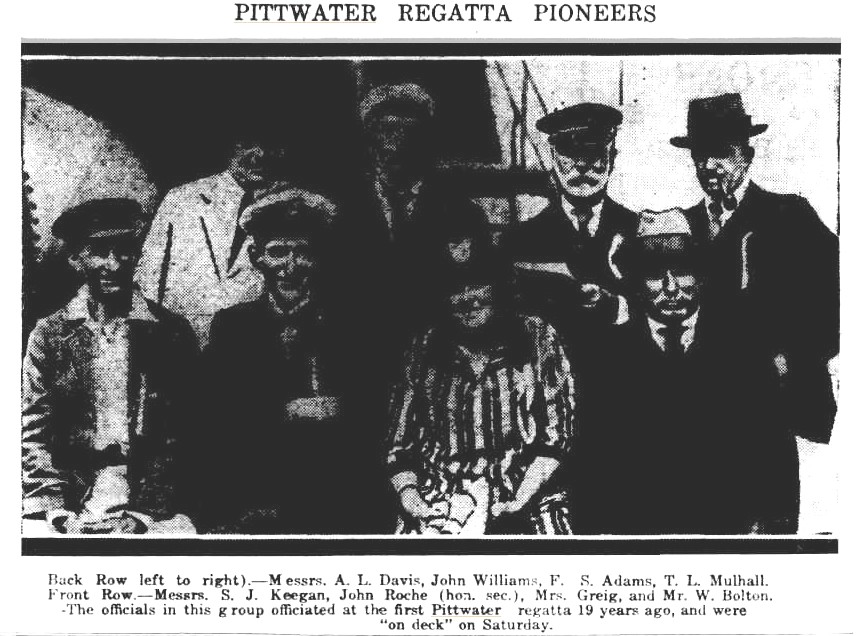
PITTWATER REGATTA PIONEERS
Back Row (left to right). Messrs. A. L. Davis, John Williams, F. S. Adams, T. L. Mulhall. Front Row. Messrs. S. J. Keegan, John Roche (hon. sec), Mrs. Greig, and Mr. W. Bolton.-The officials in this group officiated at the first Pittwater regatta 19 years ago, and were 'on deck' on Saturday. PITTWATER REGATTA PIONEERS. (1926, January 1). Arrow(Sydney, NSW : 1916 - 1933), p. 13. Retrieved from http://nla.gov.au/nla.news-article105944548
Patrick Mulhall Jnr 1811 - 1875
Two Pounds Reward. WHEREAS PATRICK MULHALL stands committed for an assault, and the undersigned having become his bail, the said Mulhall, having been called to stand his trial at the present Quarter Sessions, and made default, we therefore offer the above Reward for his apprehension. ANDREW MELVILLE. JAMES BRADLEY. at P. Murphy's Bard's Legacy, Queen's Wharf. April 7, 1840. Advertising. (1840, April 8). The Sydney Monitor and Commercial Advertiser (NSW : 1838 - 1841), p. 2 Edition: MORNING. Retrieved from http://nla.gov.au/nla.news-article32167824
Court of Quarter Sessions. MONDAY, JULY. 6,:1880. 'Before the Chairman, -- Manning. PATRICK MULHALL for assaulting 'Robert Carter, fined £20. one half to the Queen; and the remainder to the prosecution In default of payment, to be imprisoned in Sydney' jail for six calendar months. Court of Quarter Sessions. (1840, July 7). The Sydney Monitor and Commercial Advertiser (NSW : 1838 - 1841), p. 2 Edition: MORNING. Retrieved from http://nla.gov.au/nla.news-article32183796
John Mulhall - (1818 - 1859)
MULHALL January 30th, at his residence, Pyrmont, Mr. John Mulhall, aged 39 years. Family Notices. (1859, February 11). The Sydney Morning Herald (NSW : 1842 - 1954), p. 6. Retrieved from http://nla.gov.au/nla.news-article28630538
FUNERAL. The Friends of the deceased Mr. JOHN MULHALL are invited to attend his Funeral. To move from his late residence, Pyrmont, TOMORROW(Wednesday) MORNING, at 9 o'clock. JAMES CURTIS, undertaker. No. 59, Hunter-street. Family Notices. (1859, February 1). The Sydney Morning Herald (NSW : 1842 - 1954), p. 8. Retrieved from http://nla.gov.au/nla.news-article13013283

Inside The Lighthouse On Barrenjoey Headland
Tours generally run every Sunday. Tour times: 11am to 11.30am, 12pm to 12.30pm, 1pm to 1.30pm, 2pm to 2.30pm and 3pm to 3.30pm. Price: Adult $10 per person. Concession $8 per person. Child $5 per person. Children must be accompanied by an adult. Accompanying adults need to book and pay.
Meeting point: Barrenjoey Lighthouse. Give yourself at least 40mins to walk from the carpark to the lighthouse before your tour departs.
Bookings: Bookings required. Phone 1300 072 757 or book online here: www.nationalparks.nsw.gov.au/things-to-do/guided-tours/barrenjoey-lighthouse-tour
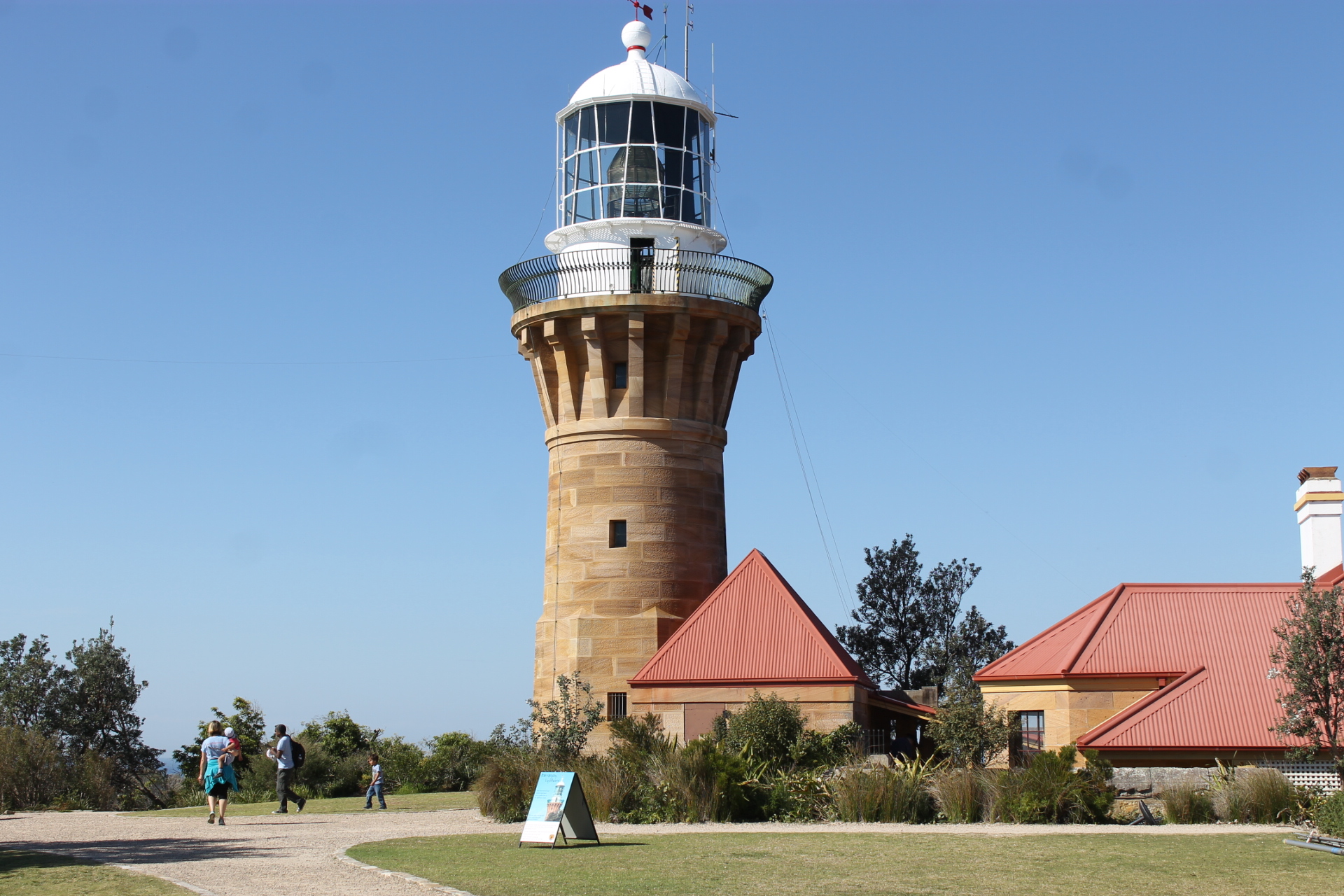
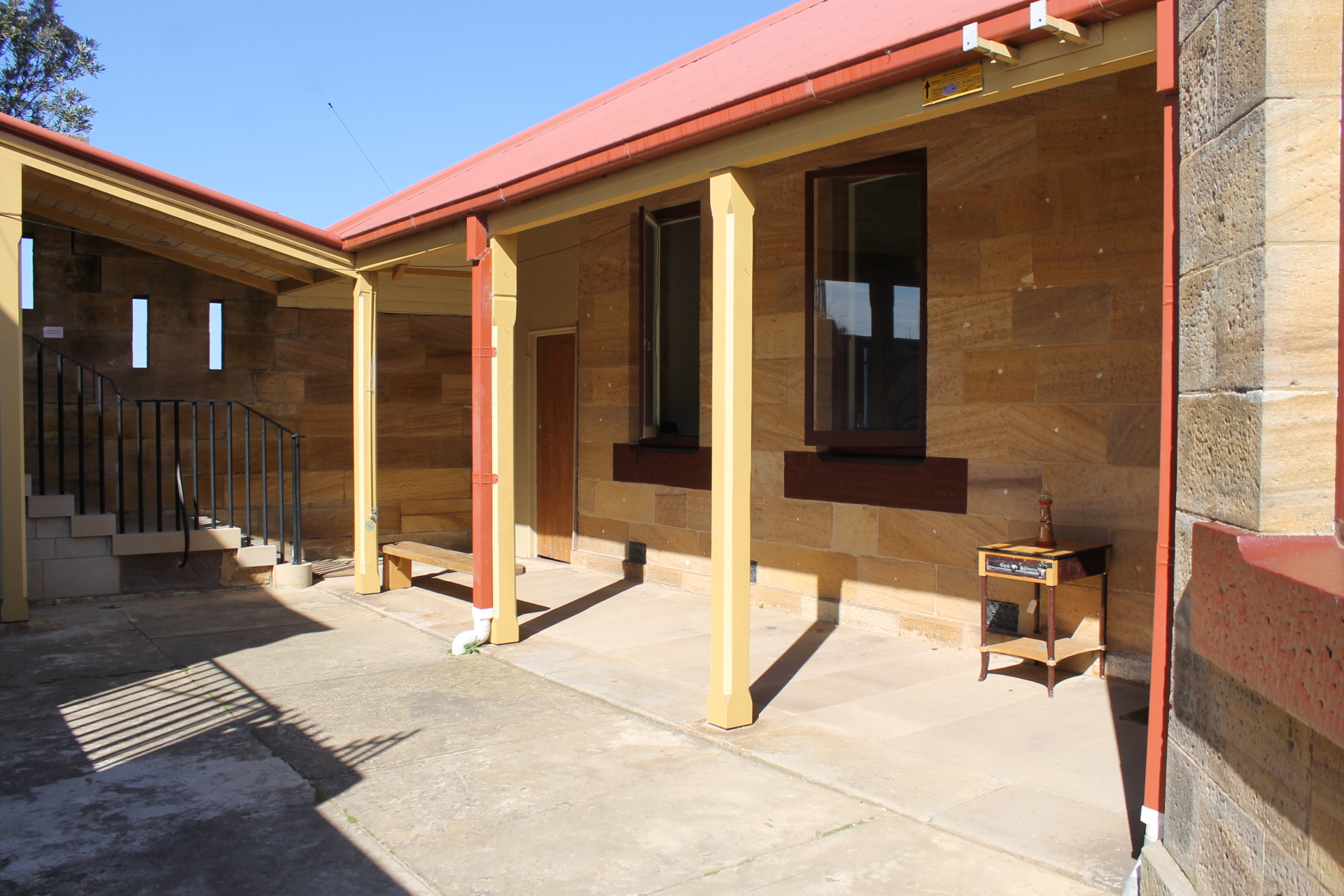
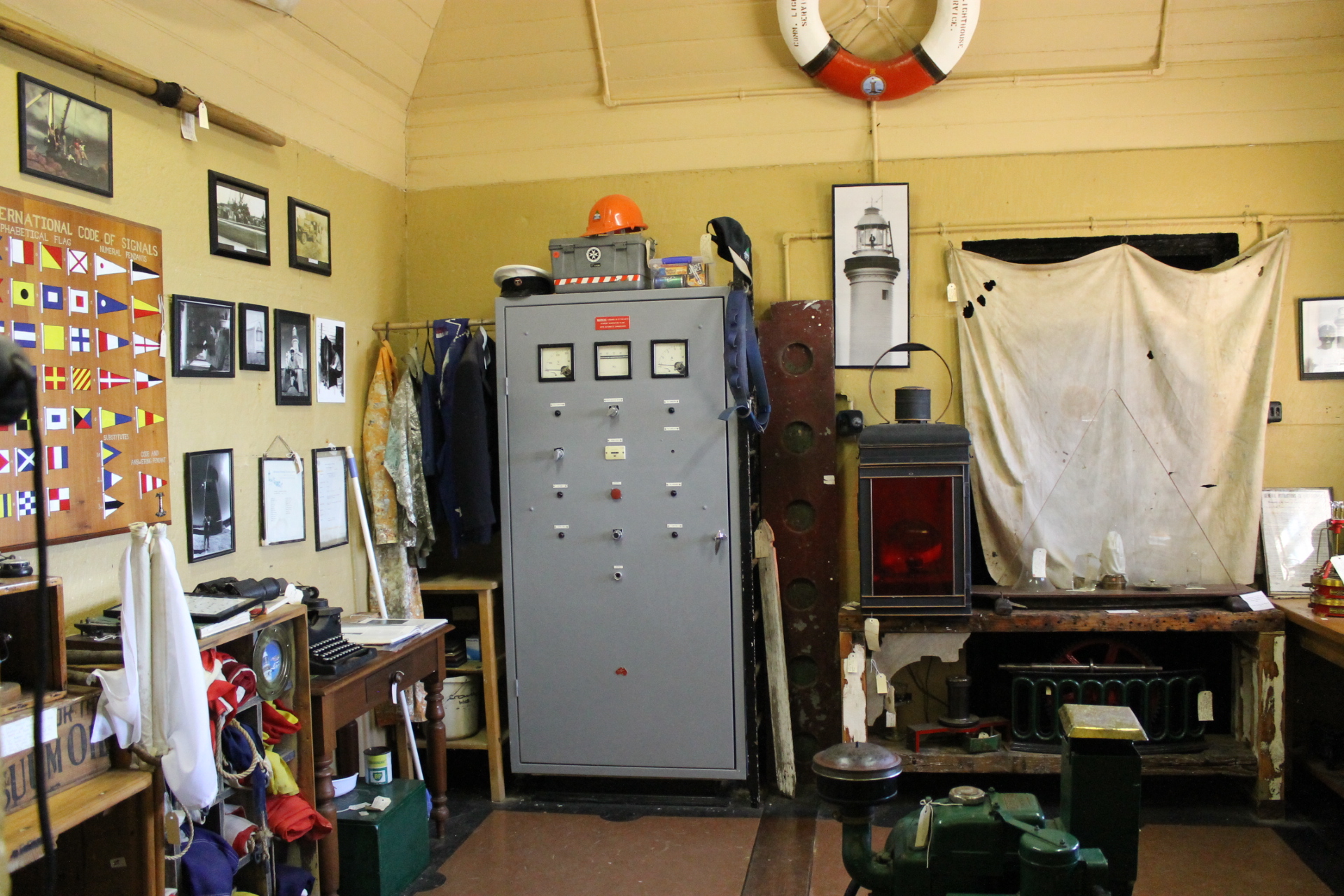
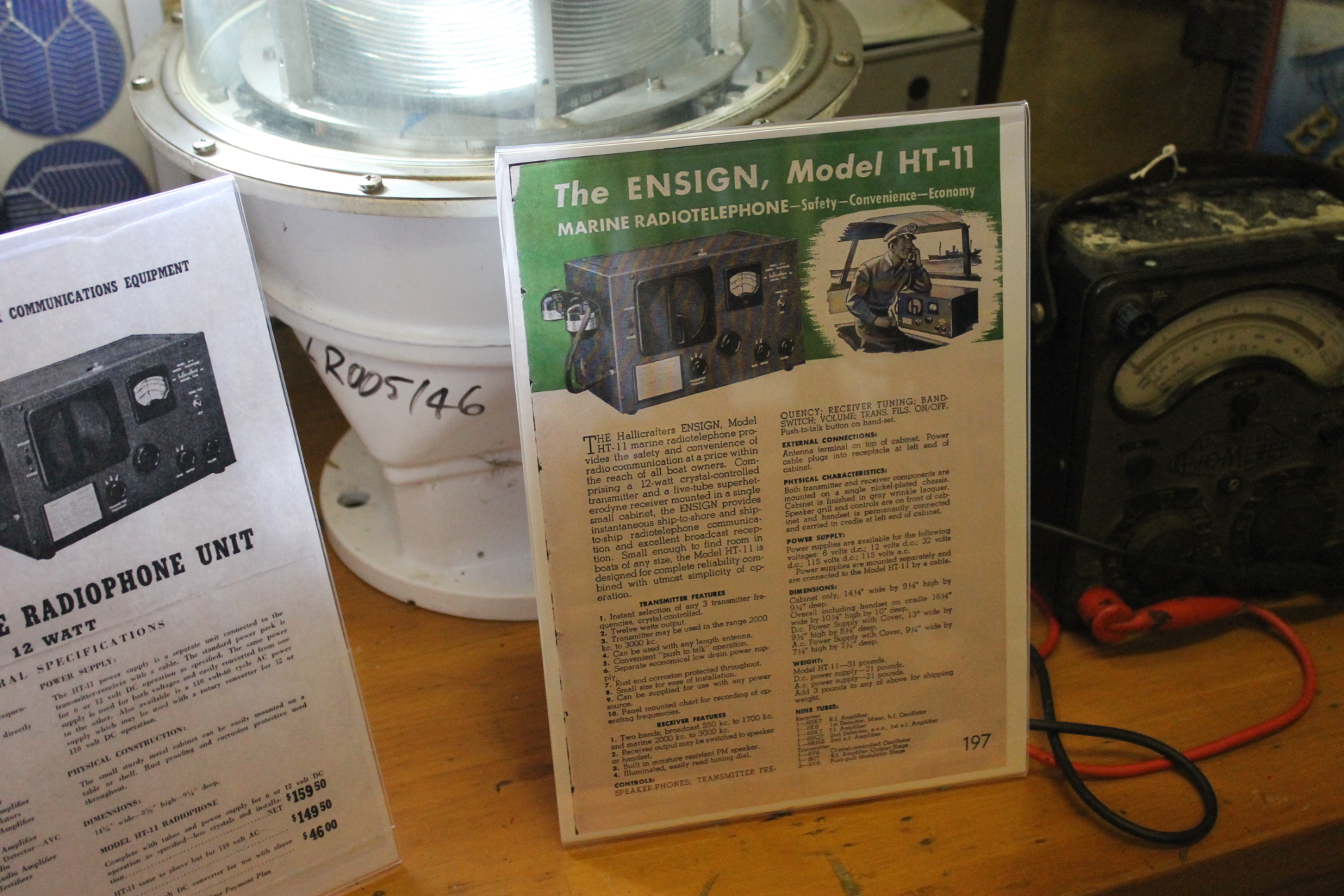
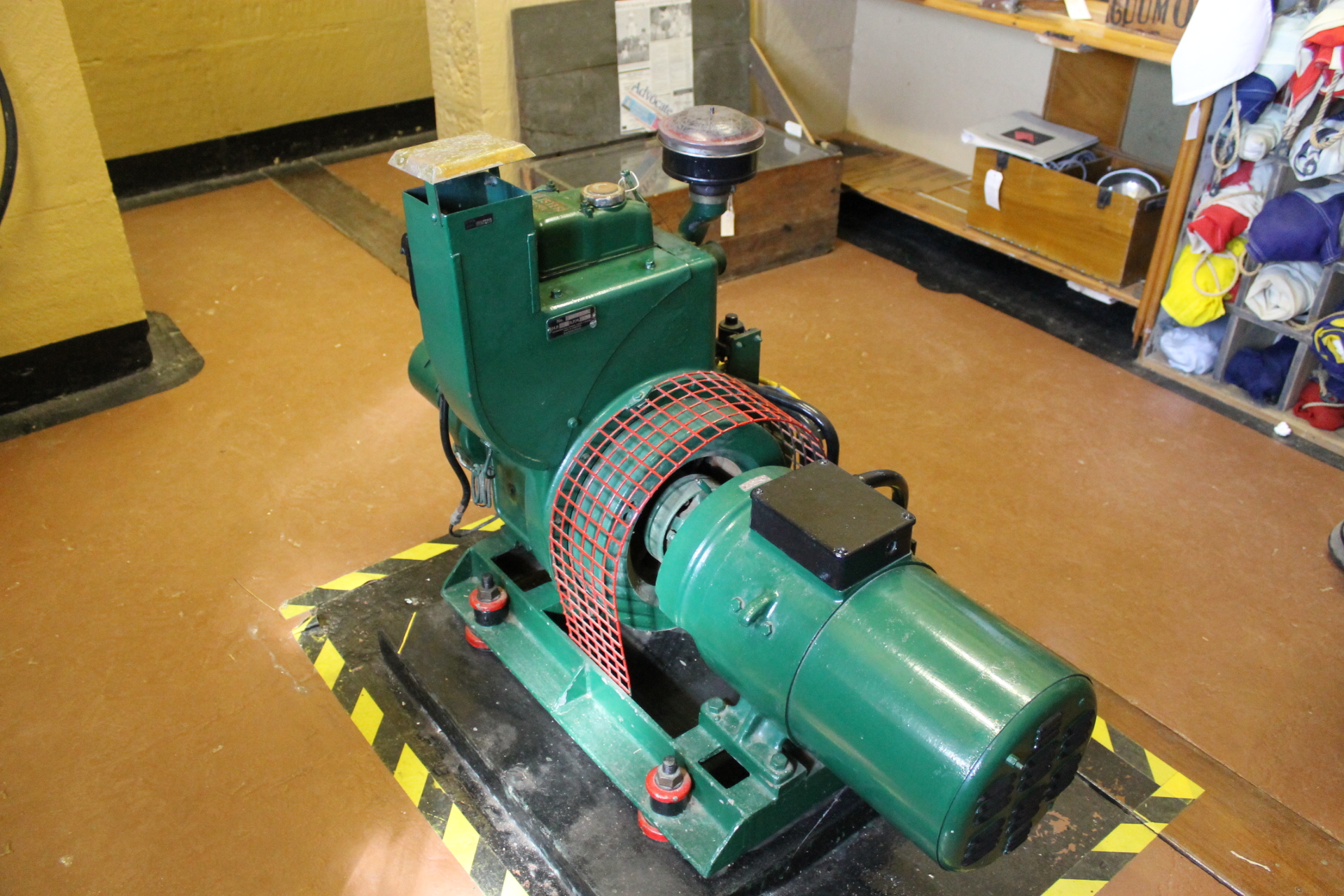
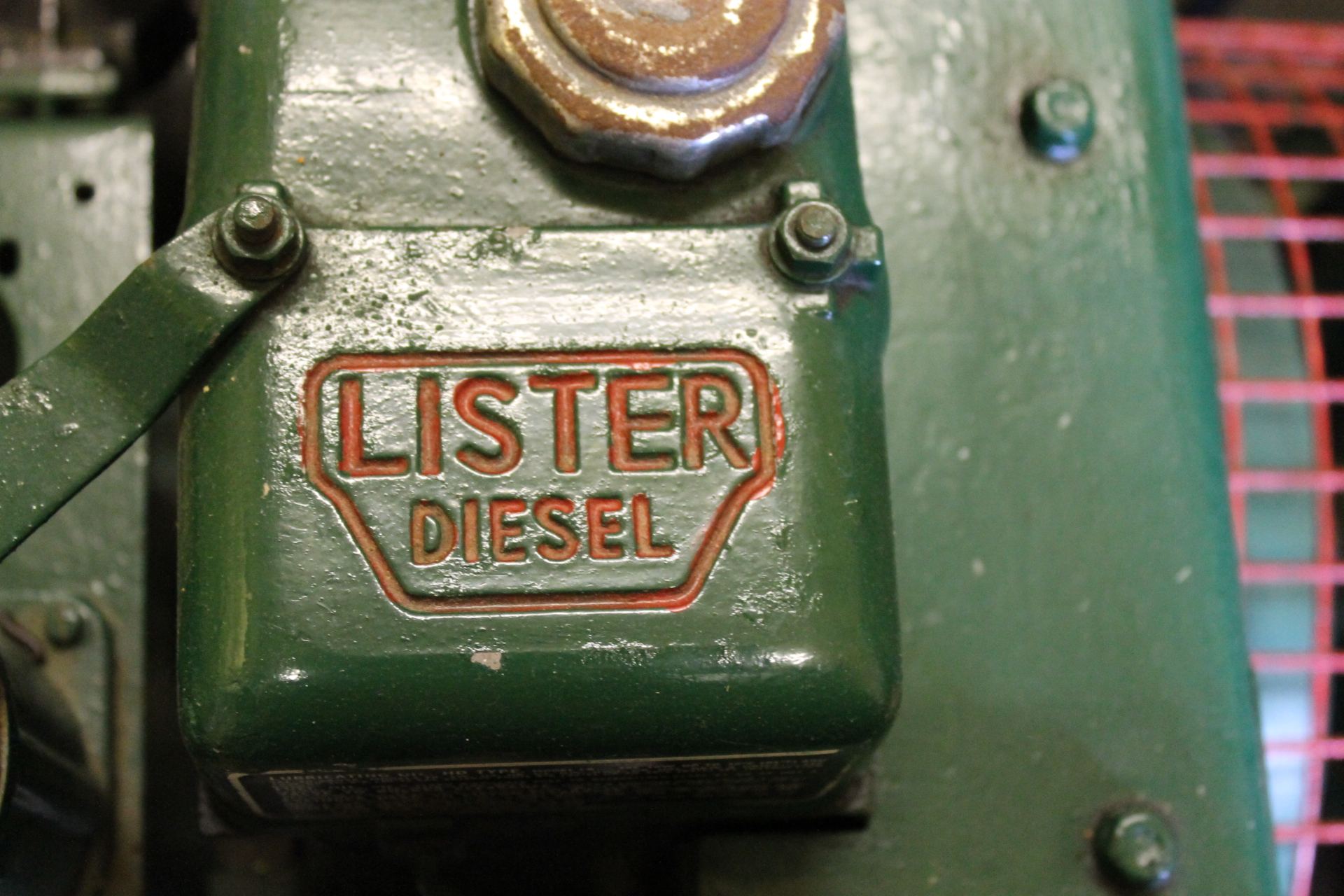
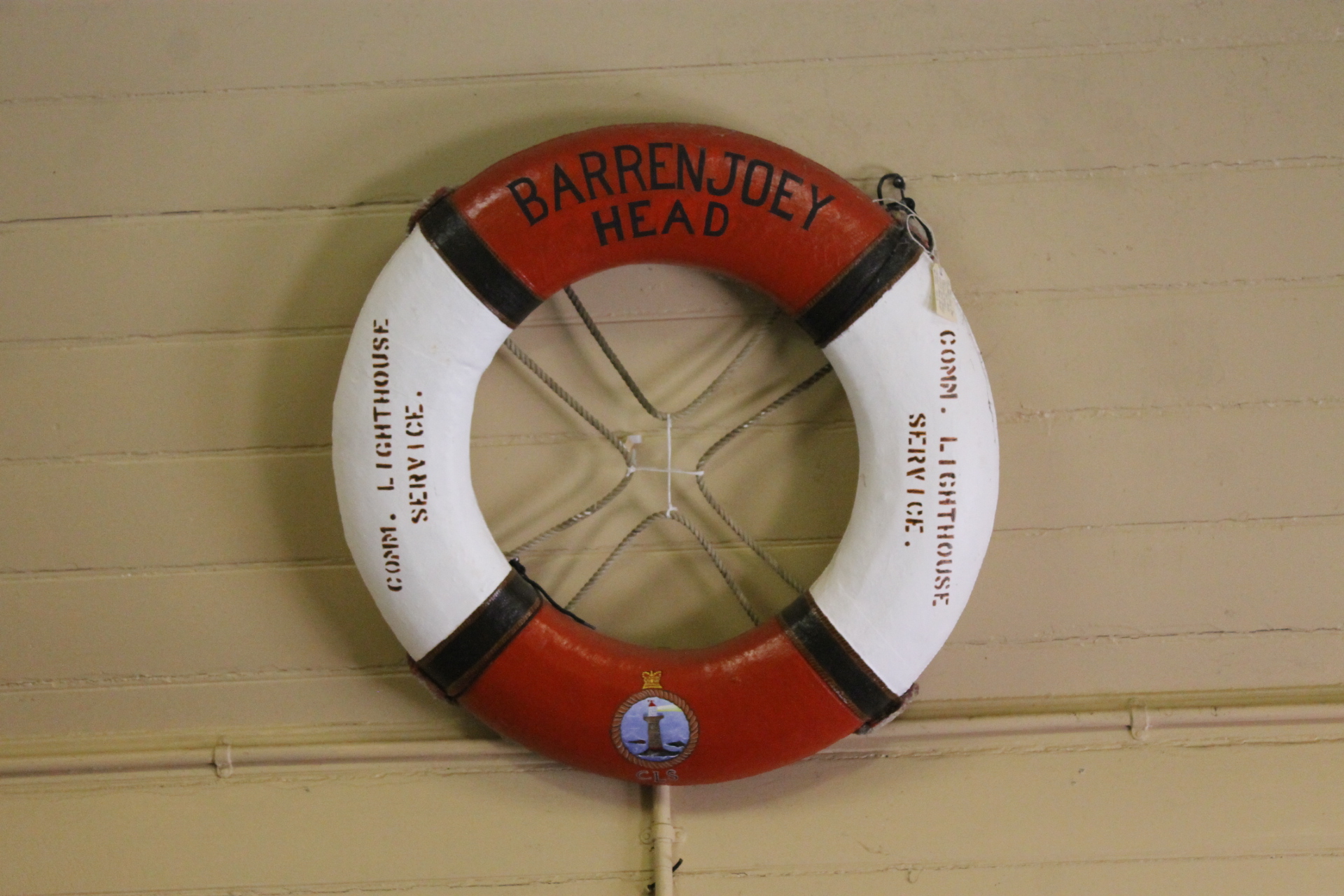
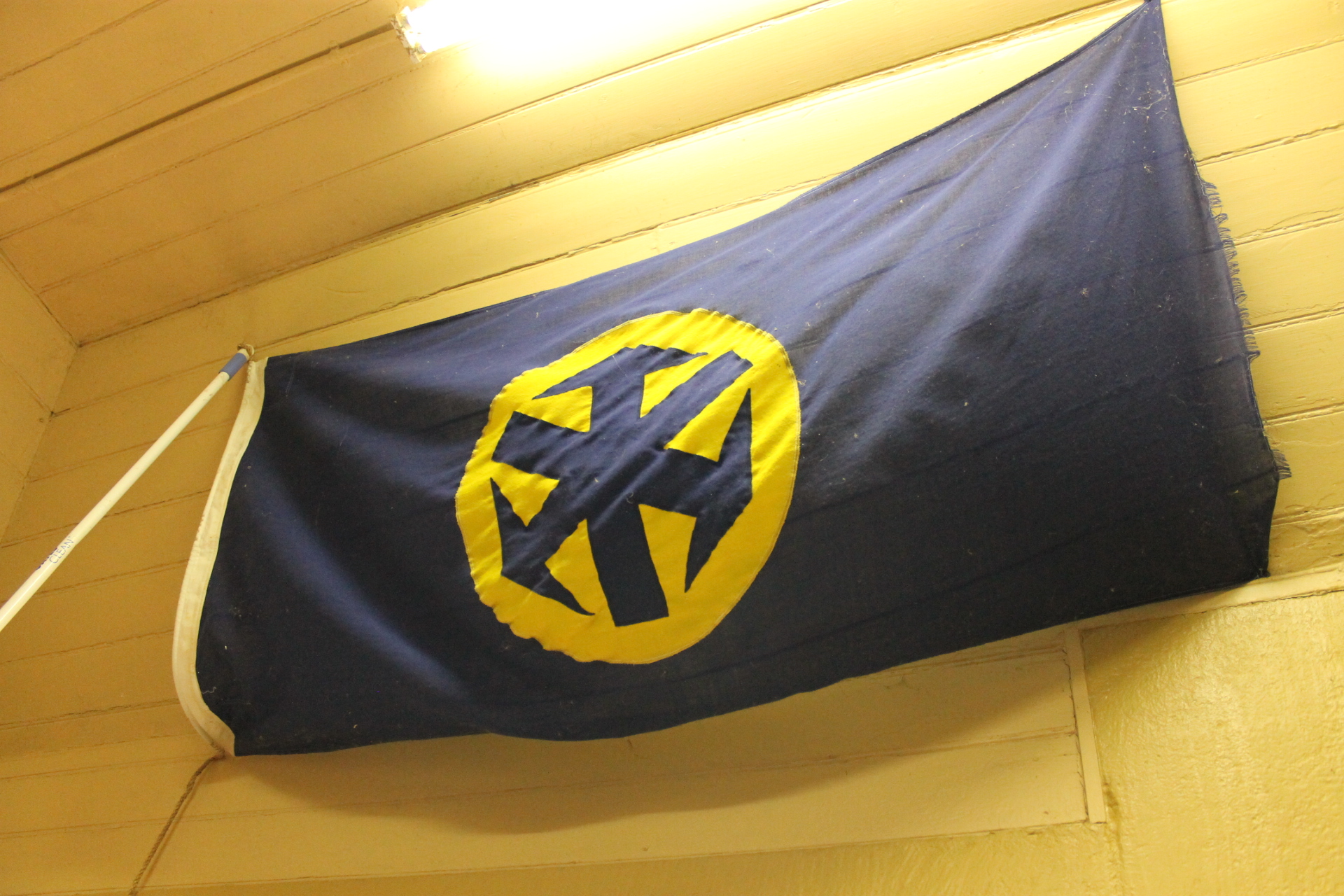
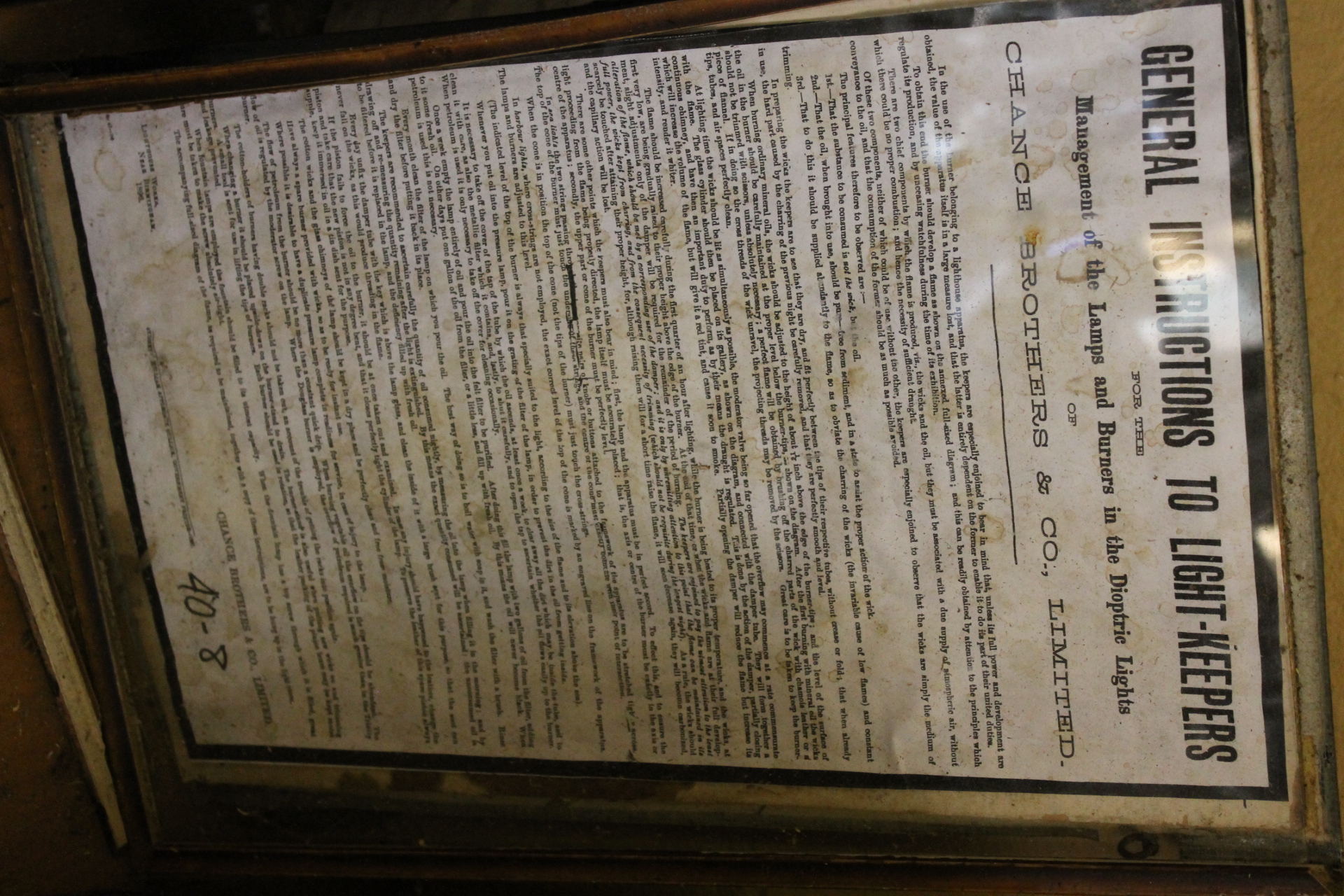
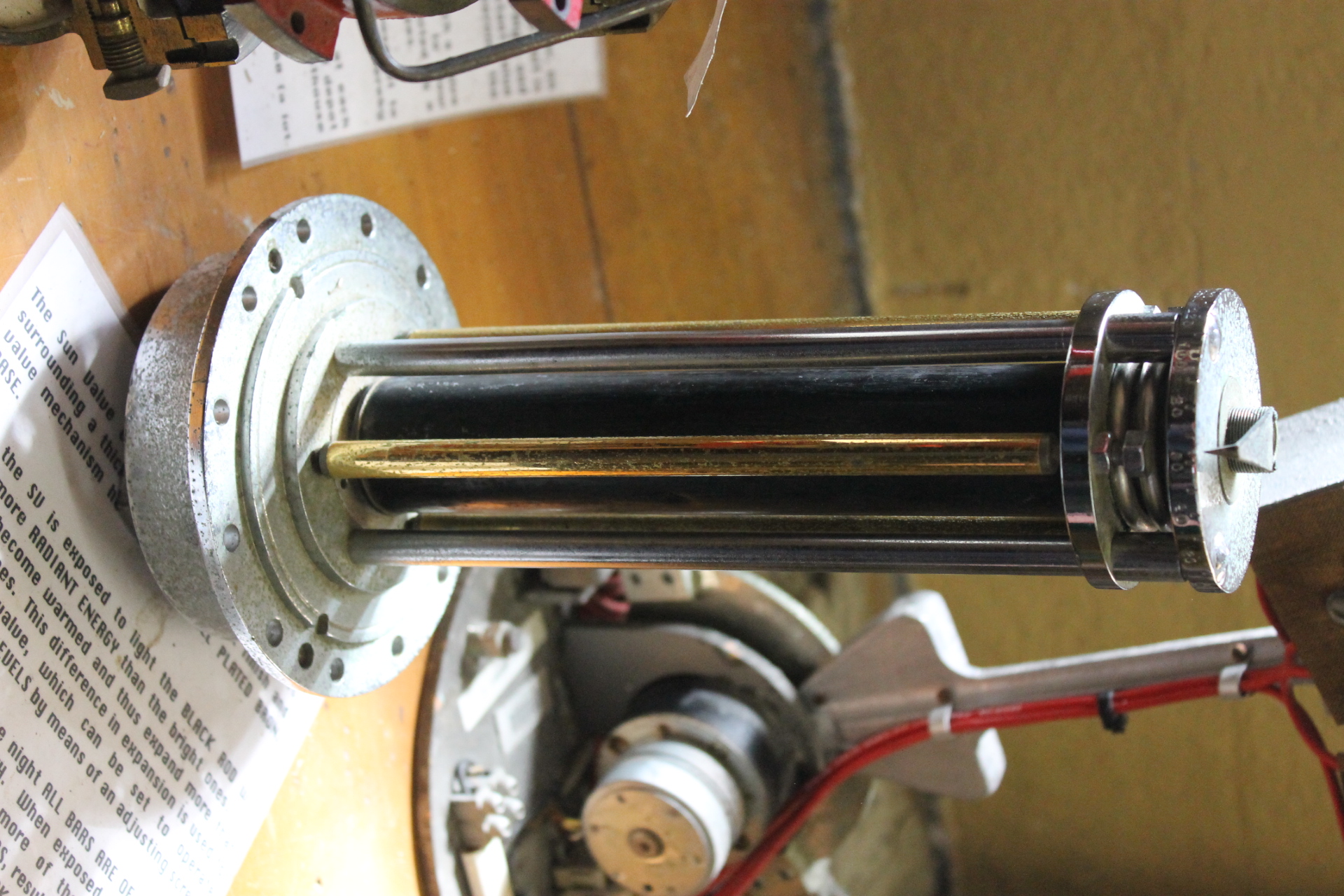
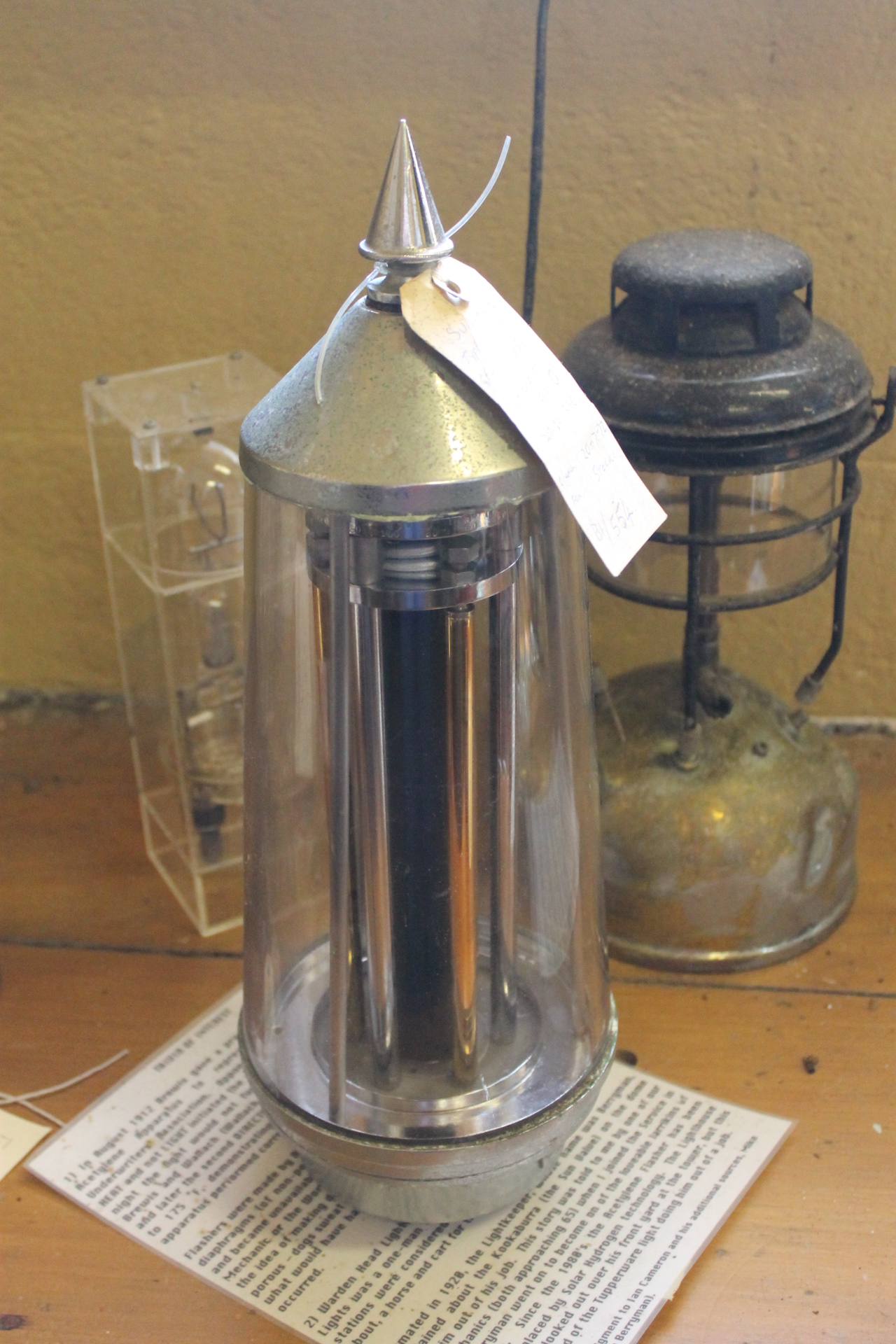
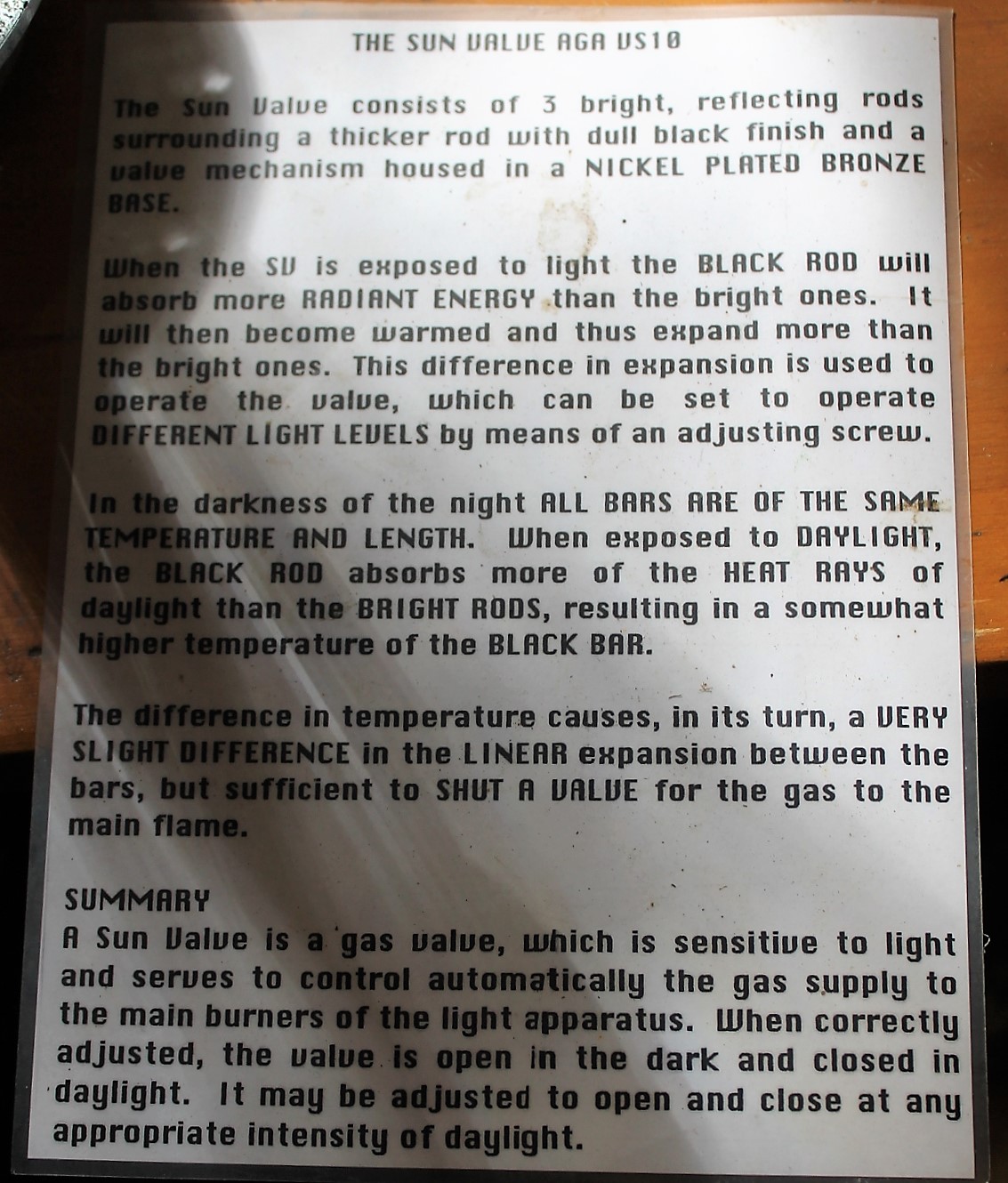
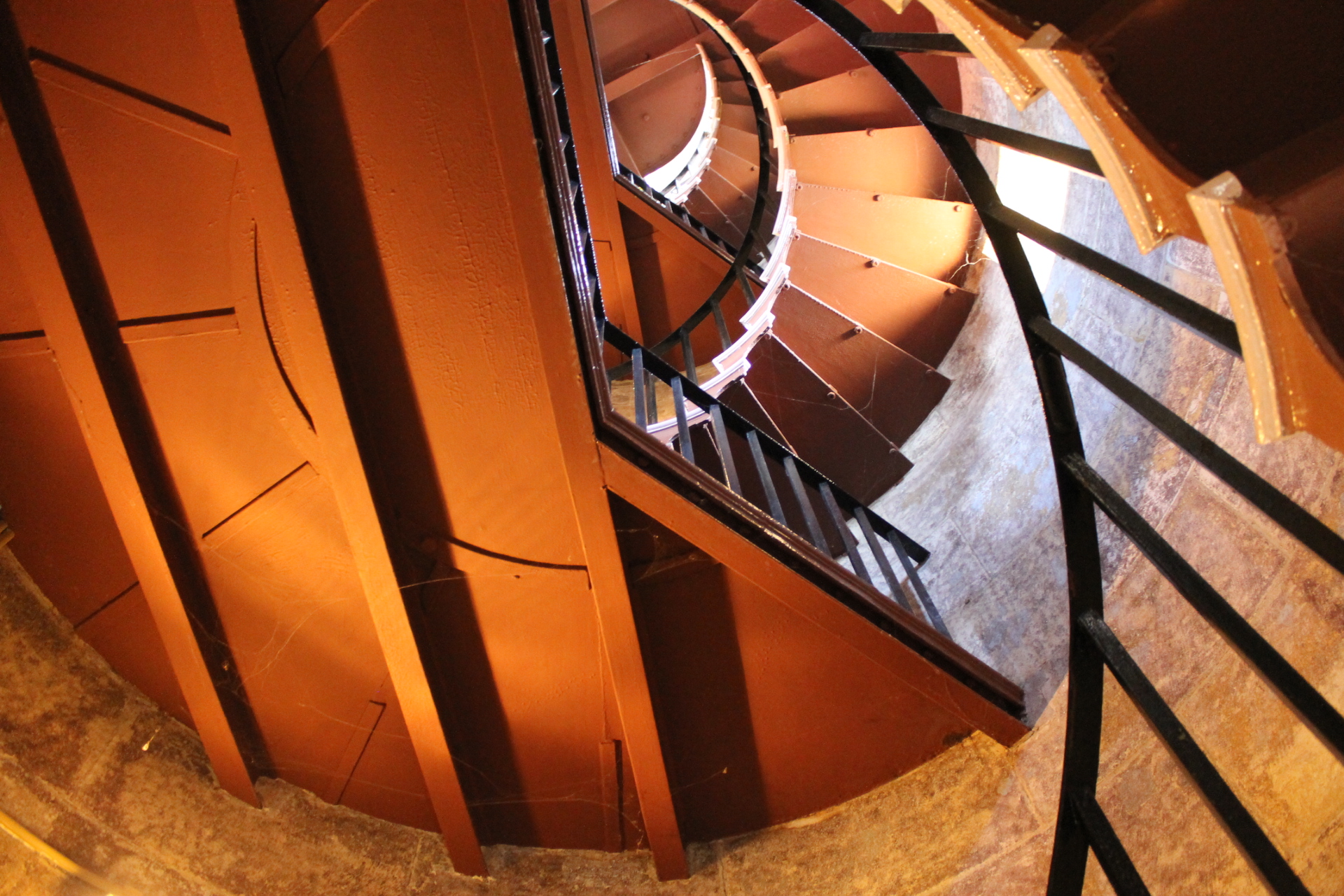
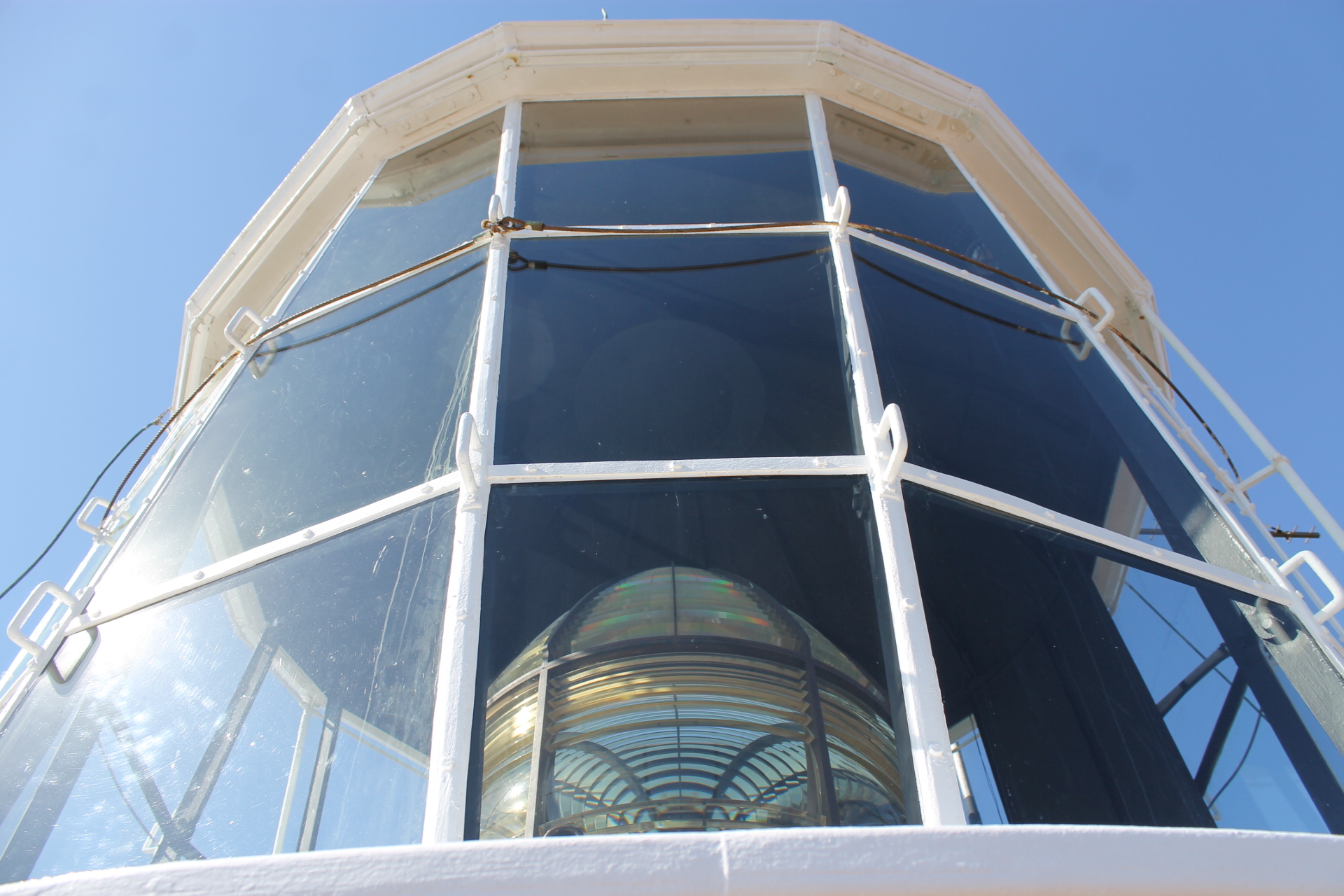
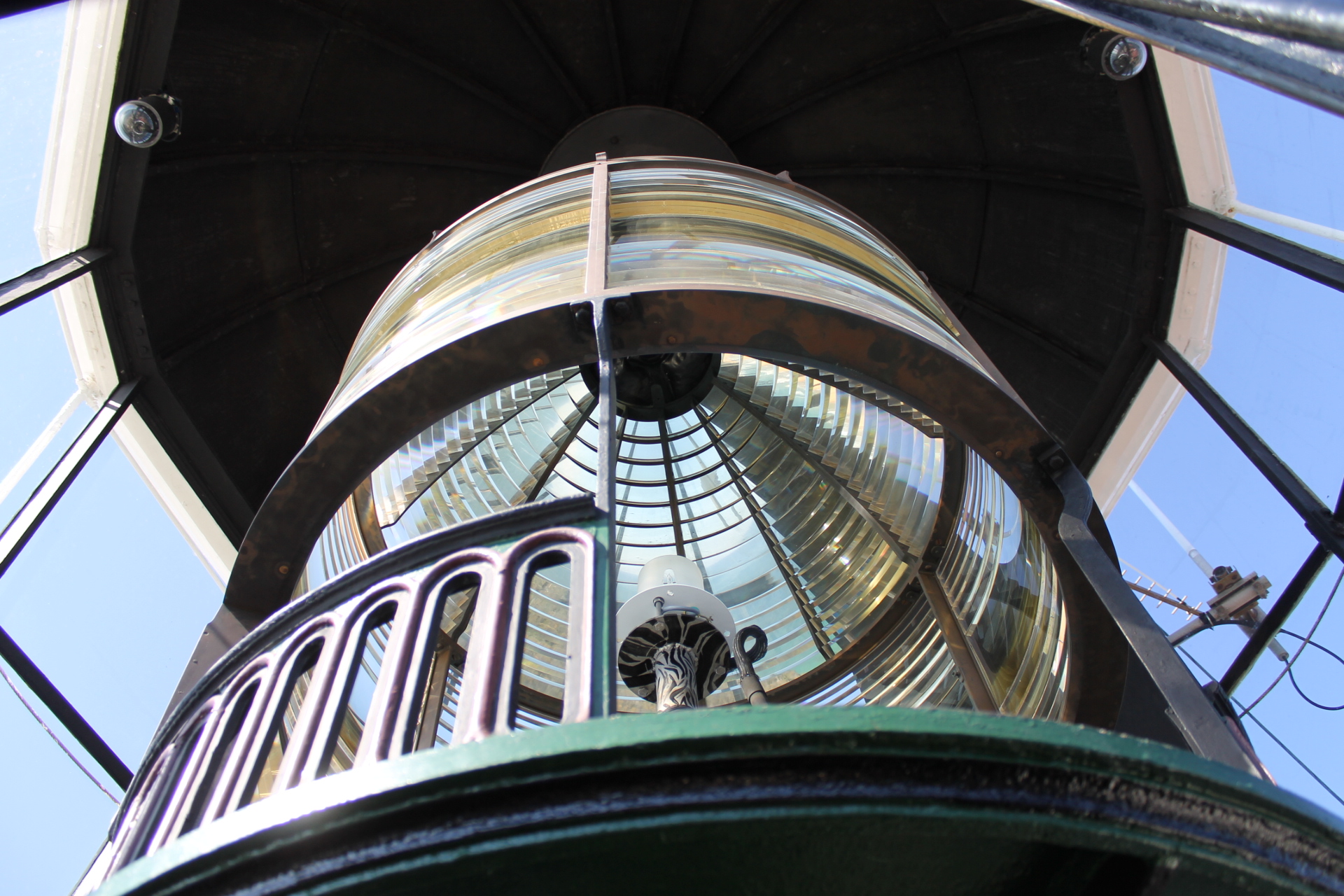
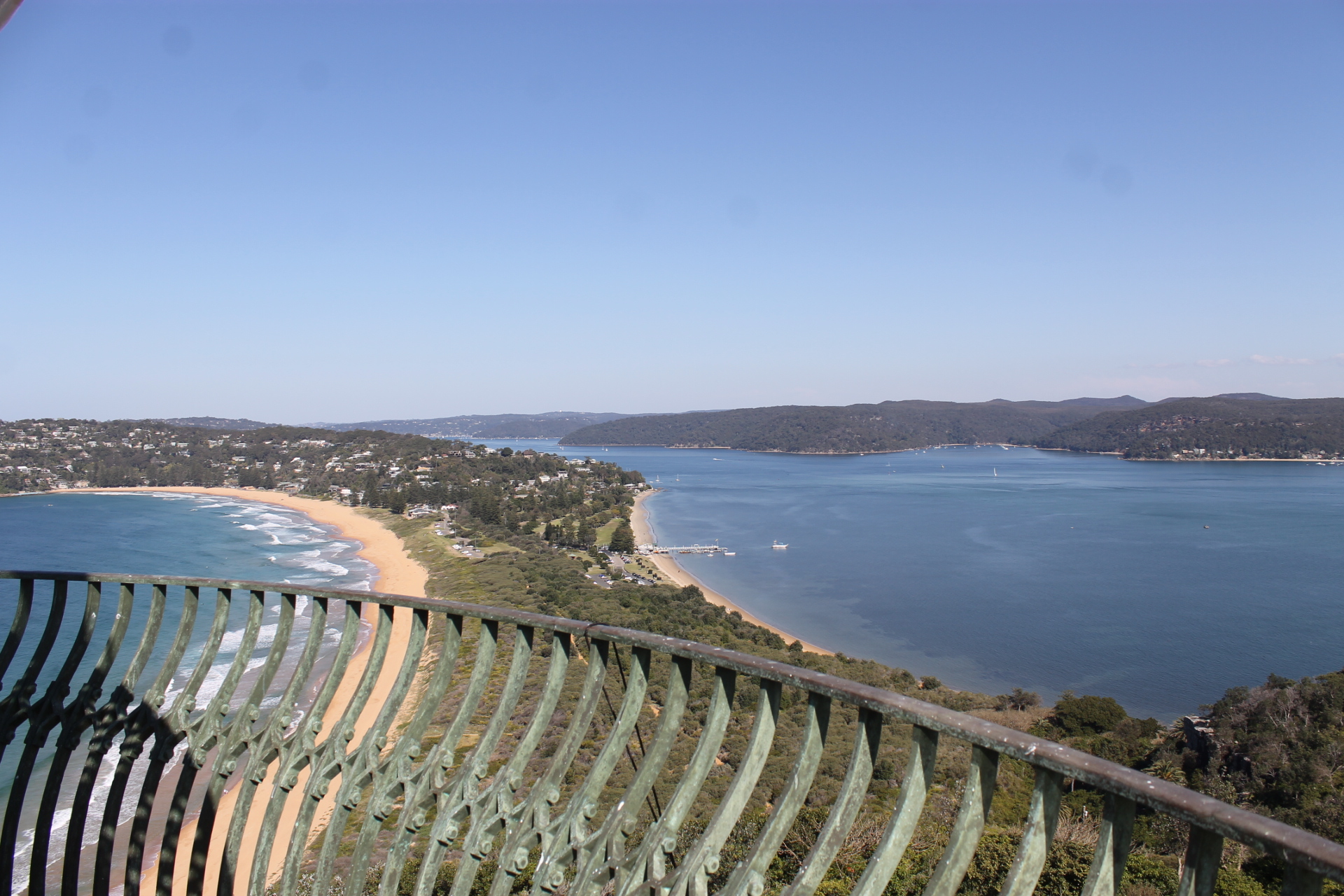
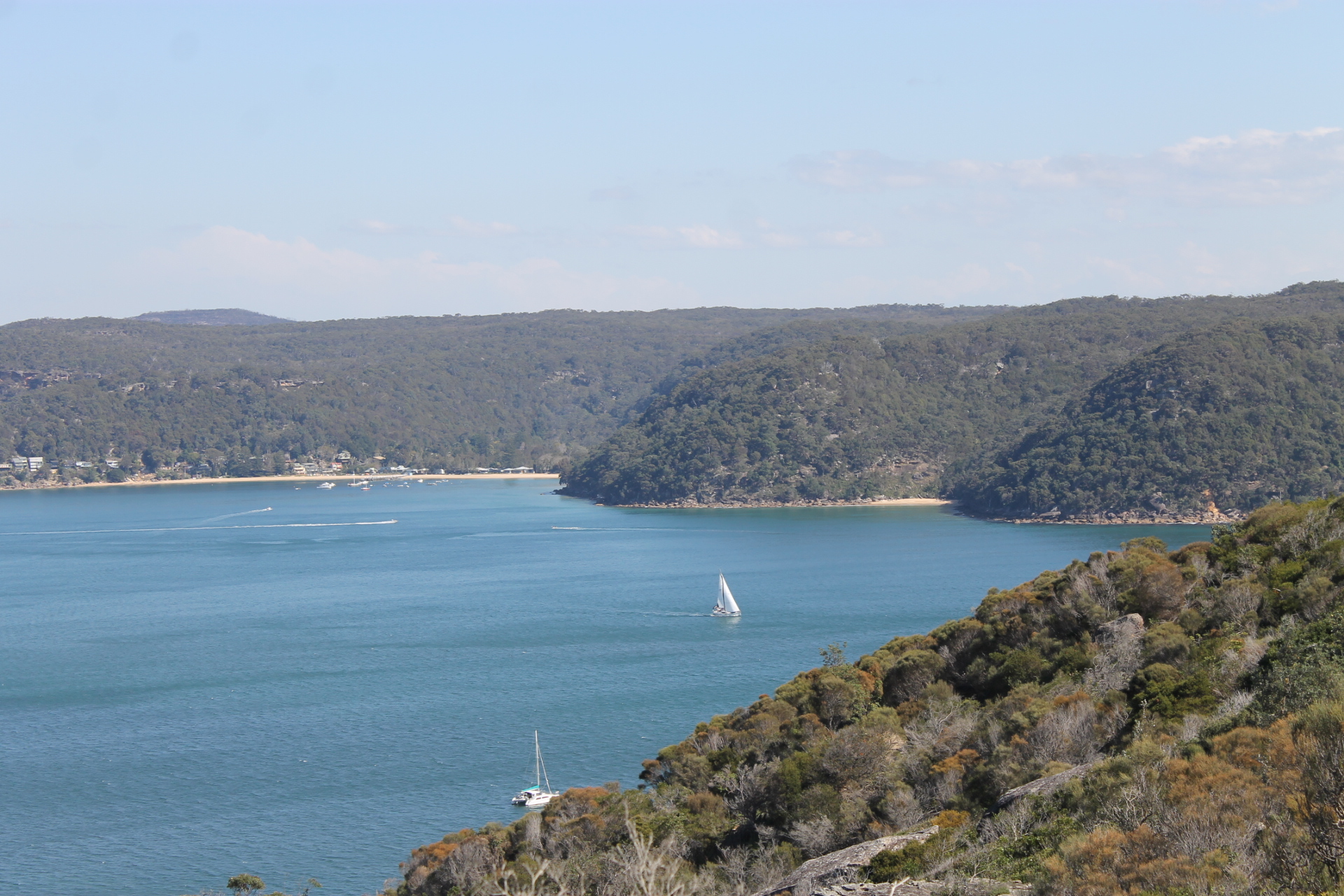
Photos; AJG/PON - International Lighthouse and Lightship weekend 2013
International Lighthouse Heritage Weekend
August appears to have become Lighthouse month around the world – here in the southern hemisphere in Spring while in Autumn in the Northern Hemisphere. Both seasons are wonderful for visiting a lighthouse and its surrounds. As part of the Lighthouses of Australia's Charter to Promote, Protect and Preserve Australia’s lighthouse heritage, the organisation are proud to promote the weekend celebrations of Lighthouse Heritage.
International Lighthouse and Lightship Weekend (ILLW) is an annual 48 hour amateur radio event held on the third full weekend in August where Radio groups operate from Lighthouses around the world with the aim to communicate with as many other Lighthouse based radio operator groups over the duration of one weekend. It is very much through the role of Kevin Mulcahy’s work (with Mike Dalrymple [dec]) in promoting this world wide popular radio event, that other groups associated with Lighthouses are adopting August as Lighthouse Month. See also the ILLW Facebook page.
Many of our own Australian Lighthouses now also use that weekend to run special events at sites where towers are already open to the public as well as the few extra towers that gain permission to open a tower for just that weekend. Some, but not all of these Lighthouse Heritage celebrations are accompanied by radio operators.
GEORGE MULHALL Snr.: Some More Races Won and family
Births Search Results - NSW Records - (those registered)
Registration Number Family Name Given Name(s) Father's Given Name(s) Mother's Given Name(s)
1053/1850 V18501053 67 MULHALL JAMES GEORGE MARY A
198/1848 V1848198 65 MULHALL SARAH E GEORGE MARY A
105/1846 V1846105 63 MULHALL WILLIAM GEORGE MARY A
972/1840 V1840972 133 MULHALL GEORGE GEORGE MARY A
596/1835 V1835596 129 MULHALL ELIZABETH J GEORGE MARY A
1228/1837 V18371228 126 MULHALL GEORGE GEORGE MARY A
2451/1852 V18522451 69 MULHALL ELLEN GEORGE MARY A
619/1850 V1850619 141 MULHALL JAMES GEORGE MARY A
WATER POLICE. MONDAY.
BEFORE the Water Police Magistrates, Mr. J. Shoobert, and Mr. A. Lenehan. George Mulhall, and Patrick Mulhall, father and son, were charged with having assaulted Thomas Dawson Mr. Driver appeared for defendants. Complainant, who is a shipping clerk In the employ of Mr. Uhde, butcher, George street, stated in evidence, that between eight and nine o'clock last Thursday morning, he had been " out for a pull," and having placed the paddles he had been using against the watermen's hut on the Circular Quay, the elder defendant (George Mulhall), who is a waterman, came up and asked him why he had interfered with his son and another party. Complainant replied that ha had endeavoured to prevent them from fighting. Whilst complainant was thus talking to the father, the son came up and struck him two blows on the back of the neck, a struggle ensued, and the father also struck complainant on the mouth ; complainant, besides being bruised, retired with a black eye. George Mulhall (the father), from further evidence, appeared to have struck no blow, and he was discharged; Patrick Mulhall was fined 30s, with costs. WATER POLICE. (1860, November 13). The Sydney Morning Herald (NSW : 1842 - 1954), p. 8. Retrieved from http://nla.gov.au/nla.news-article13048594
ANNIVERSARY OF THE COLONY.
The 61st anniversary of the foundation of the colony of New South Wales occurred on the 26th ultimo. We have witnessed the celebration of many anniversaries we have described them nor did we see aught in this to lessen our opinion of the enthusiasm with which all .... birthday of their native or adopted country. The morning of Friday was dull and lowering, but at an early hour the holiday folks were a foot wending their way to the shores of the harbour. The booths erected were more numerous than on any former occasion. About 11 o'clock, a fine breeze sprung up, most favourable for the yacht matches, and shortly after noon the sun shone forth in as bright and serene a sky as ever cast its glow over even Australian waters. At such a time the attempt to describe a scene so often described before would be tame and futile, but the spectacle, see it often as you may, is never the same. The ever-changing positions of the bouts, the ever-varying degrees of excitement as to the result of the matches, will always afford attraction to the visitors of the Regatta. We trust at least they always will do so, and even should they fail, we do hope that the thought that on one long ago 26th of January a colony was founded which, in. spite of prejudice, in spite of circumstance, still bids fair to be the Empire of the South will still cause that day to be held a day of rejoicing amongst us. We give below on account of The Regatta, first match. For all gigs pulling four oars. To start from the flag vessel, and proceed round the flag boat moored .off Goat Island, passing it on the south, and rounding it on the north, then rounding Pinchgut Island, passing it on the north and rounding it on the south side, back to the starting vessel, First prize, £10; second boat to receive back her entrance fee. Rover , . . . ., Mr. Green, Jeebong , Mr. Goodman Gazelle , Mr. J. NairnIn. This race there was a good start, and a sharp contest between the Rover and Gazelle, until coming off Hulk Bay, after rounding the boat off Goat Island, when the Rover took the lead, and maintained the same throughout, beating the Gazelle by thirty seconds. The Jeebong coming in one minute after the Gazelle.
SECOND MATCH For Licensed Watermen, pulling a pair of sculls, in skiffs. Same course .as match No. 1.First Prize, £8 ; second boat to receive back her entrance. Harriet, Mr. Mulhall Hover .... ...... Mr. Currie Sarah Jane , Mr. Joseph Mulhall Esther , ....... Mr. James Rice The Esther at the start took the lead ; the Harriet being second, and the Rover third maintaining the same places until after rounding Goat Island, and opening Hulk Bay, when the Harriet passed the Esther, and gradually increased her distance, rounding Pinchgut thirty-five seconds before the Esther, and coming in first boat by thirty-eight seconds. The Sarah Jane from the beginning was all behind.
THIRD MATCH.For fourth class yachts not exceeding fifteen feet on the keel. To start from a warp off the Cove and proceed round the boat moored off the Gas Works, passing it on the east and rounding on the west side, then round Clark's Island, passing it on the north and rounding on the south side, back to the starting vessel.First prize, £10; second prize, £3.Phantom , Mr. Catlin Shepherdess , Mr. Hodges Will Watch , Mr. Anderson Susan , ,. , Mr. Curtis Shamrock ..... ......Mr. Ash Madge Wildfire , Mr. Harnett Mickey Free , Mr. Love The whole of the boats in this race got away well together, and in passing the flag-ship after rounding the boat off the Gas Works, Mickey Free was first, closely followed by the Will Watch, Susan, and Shepherdess ; Mickey Free kept her vantage throughout, coming in first by two minutes of the Will Watch second boat; 'the Shepherdess being third, and the remainder of the fleet at so unequal distances that they were not placed. FOURTH MATCH. For skiffs pulling two oars, to be rowed by amateurs only. Same course as match No. 1. -First prize, £10 ; second prize, £3. Blue Bell , Mr. Smith. Sons of the Soil, Mr. Green Flirt , Mr. Smith. The Blue Bell led, closely waited on by -the Sane of the Soil. The Flirt having entered and started merely to make up a race, the -contest lay between the two former boats. 'The Belle maintained her distance throughout, and rounded Goat Island 30 seconds before -her competitor; Pinchgut was rounded with an advance of time, as she was first round by a minute, and increased distance and time, ]by being in one minute thirty seconds in advance of the Sons of the Soil. FIFTH MATCH. For all Yachts. To start from off the Cove, proceeding round the boat moored off the Gas Works, passing it on the east and rounding it Ion the west side; then round Shark Island, passing it on the north and rounding on the south side ; back again round the starting vessel, passing it on the south and rounding on the north side; then proceed round a boat moored off Big Manly Beach in North Harbour, -passing it on the west and rounding it on the east side, back to the starting vessel. First prize. £60 ; Second prize, £20. Boomerang , Mr. Donnelly Phantom , Mr Pike Alarm , Mr. Green Eclipse , Mr. Atkinson Champion , Mr. Thornton Sylph , Mr. Green. A race never came off in the harbour of Port Jackson which excited such great interest as this did, inasmuch as the Phantom had a *reputation to lose ; and it was understood that it was to be closely contested by the Eclipse and Alarm two new boats. Five out of the entrances, however, only started, viz., the Phantom, Boomerang, Champion, Alarm, and Sylph, the Eclipse not coming up at time. The five yachts had a fair start ; but in proceeding up Darling Harbour the Phantom got ahead, and rounded the boat off the Gas Works first by one minute of the Champion which was followed by the Boomerang third, Alarm fourth, and Sylph last a minute elapsing between each of their respective turnings of the first point of the race. The Phantom and Champion maintained their relative positions in working down to the flag- ship, and whilst they were thus progressing the Alarm overhauled the Boomerang off Boyd's Wharf, and the Sylph did the same within a few cables length afterwards, and the yachts in their down harbour course passed the flag-ship in the following order Phantom, Champion, Alarm, Sylph, and Boomerang. In working towards Shark Island the Champion gained and rounded the island first, closely followed by the Alarm, which had been making good play, the Phantom being third, and the Sylph fourth, the Boomerang by this time being nowhere, having in her course capsized a boat. After rounding the island the Phantom had the advantage in setting her square-sail, and quickly overhauled both the Alarm and Champion, rounding the flagship first by seven seconds of the Champion, which was five minutes in advance of the Alarm. The Sylph another eight minutes behind, and fast becoming a partner in the race with the Boomerang. The next tack -brought out the sailing qualities of the Champion, as her prowess was displayed ]against a wind, and the Phantom was passed by her before arriving at the Big Manly Beach boat, which was rounded by her two minutes *before the Alarm, which also overhauled the -Phantom, and was on her return four minutes 'before that vessel. The Boomerang, after 'rounding Bradley's Head, gave up, an example 'which the Sylph, at the South Reef, followed, The return home was now all that remained to be done, and here the interest became great. -The boats were, as we have already stated, Champion two minutes advance of the Alarm, and four minutes of the Phantom. The wind at this time was a capital up-harbour one, It was everything to the Phantom, and out went square- sail; still the failing qualities of the Champion made it hard work, the Alarm was overhauled between the turn and Bradley's Head by the Phantom, where she contrived to get slightly, but very lightly, ahead of the Champion. The race low fee came evidently between these two yachts, and its closeness may be well conceived)y the fact of the Phantom coming in first by only one minute and ten seconds. The Champion was followed by the Alarm in four minutes and thirty seconds afterwards. The race was completed by the Phantom in four hours and twenty-one minutes. A great deal of regret was expressed at the new boat Eclipse not running, as great expectations were formed of her from the new model on which she was built, which competent judges considered one that must secure\er beating everything at present afloat on the waters of Port Jackson. Her keel was laid down only sixteen days hence, and on her being launched the day previous to the Regatta, it was found the teams had not taken up. She has been built by Mr. Holdsworth, of Balmain, for Dr. Atkinson, a member of the Royal Yacht Club, who lately arrived in this colony by the Agincourt. Her build is on the principle of the Enchantress and Phantom, two of the Royal Yacht Squadron, which were designed by Warner, of Poole, a well known naval architect. Her dimensions are 39 feet overall, 10 feet 4 inches breadth, and 8 feet 6 inches depth; rigged to carry 680 yards of canvass. SIXTH MATCH. For bona fide Whaleboats, pulling five oars, with tubs and usual line, say 260 lbs. To start from off the Cove, proceed round the boat off the Gas Works, passing it on the east and winding it on the west side ; then round Clark's Island, passing it on the north and rounding on the south side, back to the starting vessel. First prize, £15 ; Second prize, £3.Louisa , Mr. Mulhall Wallaby . . . * , Mr. Harnett Thistle, Mr. Redgrave
This race did not create the interest we have seen ere now attendant on it, there being only three entrances. The Louisa took the lead, followed by the Wallaby, but when off Dawes Battery they fouled, which allowed the Thistle to get headway of the Wallaby ; and which position the boats kept in rounding the Gas Works boat, and passing the flag ship. The Wallaby here became nowhere. The Louisa and Thistle kept throughout the race the same, and the former came in 55 seconds ahead of her competitor. SEVENTH MATCH. For Third Class Yachts, five tons and under. To start from off the Cove, proceed round the-boat moored off the Gas Works, passing it on the east and rounding on the west side ; then proceed round the Light Vessel and Sow and Pigs, pasting them on the west and rounding on the east side, back to the starting vessel.First prize, £15 ; Second prize. £5.Pirate , Mr. Wright.Susan , ' Mr. Munro.Midge , .....Mr. Underwood.Eagle , Mr. Howard. Madge Wildfire. . . . Mr. Harnett. *Rock of Casliel . . . Mr. M'Donoghue. This was a well contested race. The Eagle gained the advantage of the start, the Susan being second and the Midge third. The Eagle kept her lead in rounding the Gas Works boat, and in parsing the flag-ship the Susan and Midge still in the same position ; the three other boats keeping together, like luggers after cutters,- the Madge if anything slightly in advance. On their return up the harbour, after rounding the Sow and Pigs, the Susan had the advantage, coming in one minute before the Midge, which was minute before the Eagle. The other boats were nowhere. The Eagle is anew boat, built by Howard. Much was expected of her; but expectations in boats as well as in other matters, are often doomed to disappointment. EIGHTH MATCH. For a Gig and Dingy, the gig not under 20 Feet. The race to be decided in twenty minutes. The man in the dingy must be caught by the bowman of the gig. Prize £3. 1 Gig , ..Sam Slick , Mr. Bawn Dingy, Dodger , Mr. Currie. This race was, as usual, the race of fun and sport. After there had been the due allowance of artful dodging in and out, pulling, tearing, sudden catching and shooting ahead, not forgetting a swim or two, the whole of which exploits occupied seven minutes and a half, the gig was declared the winner.
Second Day. On Saturday, there was no detraction on the reputation of Friday's matches. It was not the tame, dull display of a second day 'b meet. There was the same exertion of sinew and muscle in pulling ; the same skill and ability in sailing, As many as on Friday congregated to see the opening day of the Regatta, were present on Saturday, to witness its closing one ; and those who competed for prizes were equally as desirous for attaining them. The following matches,were contended for : FIRST MATCH. For licensed watermen in skiffs pulling two oars. To start from the flag vessel, and proceed round the flag boat moored off Goat Island, passing it on the south and rounding it on the north, then round Pinchgut Island, passing it on the north and Toun'ing it on the south side, back to the starting vessel. First prize, £10: Second prize, £3.Satellite, Mr. Rice Sarah Jane, Mulhall Esther, Thompson. The Sarah Jane took the lead at the start, the Esther second, and the third her 'Satellite' close up. In rounding the flag-boat, off Goat Island, the Satellite was observed to have outshot her competitors by half a cable's length. The Esther having closely followed, and so changed positions as to render Sarah Jane half a distance behind her, all struggling well for the first place. In passing the flag ship Satellite was first in exactly fourteen minutes from the start, Sarah Jane having, when closeup to this point passed the Esther, which boat was 50 seconds after the Satellite, and 20 seconds after the Sarah Jane. Still all struggling, the Satellite, gradually increasing her distance, and after rounding Pinchgut, came in first boat by 3 minutes 25 seconds. The Sarah Jane, a decent second of the Esther, which was nowhere. SECOND MATCH. For all Licensed Wood Boats. To start from a warp off the Core, proceeding round the boat moored off the Gas Works, passing it on the east, and rounding on the west side ; then round Shark Island, posing it on the north and rounding it on the south side, back to the Starting ship, passing it on the south, and rounding it on the north side; then proceed round Shark Island, passing it on the north and rounding on the south side, back to the starting vessel .First Prize, £10, second prize £3.Jane, Mr. Allen Hannah , Mr. Ross Champion , Robert Kellie Maria , Mr. Jacobs Sally , Mr. Hartland' Fly , Mr. Waterhouse Defiance , Mr, Cook Improvement , Honeymoon Harriet , Mr.Rostron William , Mr. Sullivan Charlotte , Mr. Lee. In this race ten boats out of the eleven entered started. Harriet was first off, closely followed by the Defiance, Maria, William, and lmprovement. The other boats like a convoy huddled together, and close astern. They maintained their relative positions until after rounding the boat off the Gas Company's Wharf, and passing the flag ship, and so kept until after rounding Shark Island, when the William crawled from out of her sluggish companions, and got the lead, closely followed by the Jane, Sally, and Defiance. In making the second turn round Shark Island the Jane took the lead, and came in first boat, closely followed by the William, Sally, Fly, and Maria. The other boats no where.
THIRD MATCH. For second class yachts, 10 tons and under. To start from off the Cove, proceed round the boat moored off the Gas Works, passing i ton the east and rounding on the west side ;then proceed round the Light Vessel and Sow and Pigs, passing them on the west, and rounding on the east side, back to the starting vessel. First prize, £30 ; second prize, £10.Susan , Mr. Munro Alarm , Mr. Green Eclipse , Mr. Atkinson Champion , Mr. Thornton Eagle , Mr. Howard Midge , Mr. Underwood This was regarded as the race of the day, and on its result the greatest interest prevailed. The Eclipse and Eagle were withdrawn, leaving the match to be sailed for by four yachts. They had a capital start all off well together. Before the Gas Company's boat was reached, the Champion stretched out and got the lead, and with this advantage rounded it. The others well together. In coming down to the pass of the flag-ship, the Midge and the Susan got greatly astern, and when they passed, it was palpable their chance was gone, and that the race lay between the Champion and Alarm, the latter then a cable's length astern. On fetching Garden Island, the Alarm got a slight advantage of her rival, and gradually increased it, coming in 55 seconds in advance. The Midge and Susan were left all behind at the flag-ship, and as they had no chance for first or second places, they had a little match of their own until nearing Bradley's Head, when the Susan,which had been gradually getting behind, declined the contest. The Midge sailed on, and after rounding the Sow and Pigs seemed to get emulous of a second place; but this was not achieved. Nevertheless, good work left her only 4 minutes and 4 seconds behind the Champion. The race was completed by the Alarm in 1 hour and 58 minutes. The Alarm is a new yacht, built by Mr. Green. FOURTH MATCH. For coasters not exceeding 25 tons. To start from a warp off the Cove, and proceed round the boat moored off the Gas Works, passing it on the east and rounding on the west side ; then proceed round the Light Vessel and Sow and Pigs, passing them on the west and rounding on the east side, back to the starting vessel. First prize, £20 ; second prize £10.Victory, Mr. Crause Ellen, Mr. Lihr Newport Packet . . Mr. Woodhouse Trial, Mr. Wright. Three boats only started, and it may be said only two went off at gun fire, as the 'Newport Packet could not heave up her anchor. The Victory went off fully intent to realize her name, closely followed by the fair Ellen, and on passing the Flag Ship after doing the turn of the Gas Company'8 Wharf, was at least a quarter of a mile a-head. When passing the Flag Ship she was increasing her distance. u On ! On ! ! sped the Victory ' every headland showed her progress. The light- vessel, and Sow and Pigs were so sped round that the Ellen became a mere spec, unless viewed through a telescope, and the Victory arrived at the flag-ship 18 minutes before the fair girl made her appearance. FIFTH MATCH. For coasters not exceeding 50 tons. To start from off the Cove, proceeding round the boat moored off the Gas Works, passing it on the east and rounding it on the west side ; then round Shark Island, passing it on the north and rounding on the south side ; back again round the starling vessel, passing it on the south and rounding on the north side ; then proceed round a boat moored off Big Manly Beach in North Harbour, passing it on the west and rounding it on the east side, back to the starting vessel, First prize, £30 ; second prize, £15.Edward ........ . Mr. Davis.Neptune , Mr. Venteman. Sister , Mr. Korff. All well off Neptune leading, Sister second, and Edward third, but the latter worked up well, and had gained a second place before reaching the Gas Company's Wharf which
they rounded, Neptune leading, Edward following, and the Sister a third place. In working down to the flag-ship, the Edward kept gaining, and closely followed the Neptune, whilst the Sister was a good quarter of a mile in the worst place of a race. Between this and Shark Island the Edward gave the Neptune the go-by, and in returning came round the flag-ship one minute in advance of her. The Sister kept up, but it was the drowning man catching at straws. The boats then made for Big Manly Beach, Edward gaining ground of Neptune, and the Sister having lost so much that a declination was made of rounding the boat.The Edward rounded the boat first by a considerable distance. Neptune followed, and from the Sister refusing company, was of course the only competitor This position was kept up the harbour, and Edward dropped anchor thirteen minutes before Neptune let go his chain. SIXTH MATCH. *,-For a Gig and Dingy, the Gig not under twenty feet. The match to be decided in twenty minutes ; the man in the dingy to be caught by the bowman in the Gig.Prize, £3.Gig, Jane , Mr. Currie Dingy, Champion, Mr. Richards The gun fired for the start; within two minutes afterwards the dingy was caught at the stern by the gig, and the cap of the rower was brought to the flag ship as the trophy of victory. With this race ended the aquatic sports of the 61st Anniversary, evidently to the satisfaction of all parties.
Anniversary Regatta. At a meeting of the Committee, held on Tuesday afternoon, at the Custom House Hotel, the following prizes were awarded : For gigs : the sum of £10, to Mr. Green, as owner of the Rover; Mr, Nairn, as owner of the Gazelle, receiving back his entrance money. For licensed Watermen, pulling a pair of sculls in skiffs : the sum of £8, to Mr. G. Mulhall, owner of the Harriet ; Mr. James Rice, of the Esther, receiving back his entrance. For fourth-class yachts: the sum of £10, to Mr. Love, of the Mickey Free; and £3 to Mr. Anderson, of the Will Watch. For skiffs, pulling two oars, rowed by amateurs :the sum of £10, to Mr. Smith, of the Blue Bell ; and £3 to Mr. Green, of the Sons of the Soil. For all yachts : the sum of £60, to Mr. G. Pike, of the Phantom; and £20 to Mr. G. Thornton, of the Champion. For whaleboats: the sum of £15, to Mr. G. Mulhall, of the Louisa ; and £3 to Mr. Redgrave, of the Thistle. For third class yachts: the sum of £15 to Mr. Munro, of the Susan ; and £5 to Mr.Underwood, of the Midge, For a gig and dingy, (first day) : the sum. of £3,to Mr. Bawn, of the gig. For licensed watermen in skiffs pulling two oars : the sum of £10,to Mr. Rice, as owner of the Satellite; and £3 to Mr. Mulhall, of the Sarah Jane. For woodboats : £10 to Mr. Allen, of the Jane; and £3 to Mr. Sullivan, of the William. For second class yachts : the sum of £30, to Mr. Green, of the Alarm ; and £10 to Mr. Thornton, of the Champion. For coasters not exceeding 25 tons : £20 to Mr. Crause, of the Victory ; and £10 to Mr. Lihr, of the Ellen. For coasters not exceeding 60 tons: £30 to Mr. Davis, of the Edward ; and £15 to Mr. Venteman, of the Neptune. For a gig and dingy, (second day):£3 to Mr. Richards, of the dingy Champion, Total amount, £312 11s. 6d., being the largest sum ever paid as prizes at any previous regatta in this colony. ANNIVERSARY OF THE COLONY. (1849, February 3). The Shipping Gazette and Sydney General Trade List (NSW : 1844 - 1860), p. 30. Retrieved from http://nla.gov.au/nla.news-article161036642
1855 North Shore Regatta: Yesterday, the 36th anniversary of Her Majesty's birth and the 18th of her accession to the throne, was celebrated by the good people of Sydney with becoming spirit and loyalty. After 10 o'clock business was entirely suspended, and amusements became the order of the .day. The principal attraction was the North Shore Regatta. The Tom Tough, schooner, was placed at the disposal of the committee by Mr. G. T. Thornton. The results were: Â Pair Sculls, for all amateurs: George Green, 1; D. Healy, 2. Champion Race: Isaac Howard, 1;James Edwards, 2; G. Green, 3. Sailing Boats not exceeding 13ft: Annie S. (Somerbell), 1; ;Sea Belle (Conlon), 2; Will Watch -Turner), i3. Two Pair Sculls, for amateurs un,1er 17; .R. and J. Green, 1; C. Grimes and L. Younger, 2. All Persons pulling a pair of sculls in licensed boats; first prize £40, second £15:R. Green, 1; G. Mulhall 2. OLD TIMES. (1905, May 27).Evening News (Sydney, NSW : 1869 - 1931), p. 7. Retrieved from http://nla.gov.au/nla.news-article114058803
RACE.-To start at half-past 2. For all whaleboats not exceeding 28 feet overall, pulling five oars. Course : Three times round No. 1. : First prize, £16; second, £7 10s. Entrance, £1 ls. Louisa, blue, with red cross, G. Mulhall .... 1 Dora, white, N. Johnston .... .... .... 2Star, blue, with star, G. Barnett .... .... 0 Flying Fish, light blue, E. Lawrence .. .... A good deal of excitement was manifested on board the flagship and in all quarters where a view could be obtained, as these whaleboats ranged alongside of the starter's boat. The interest in this race was not diminished throughout. The fact that the competitors were all well known as stalwart oarsmen, and had all at different times distinguished them-selves as victors on various previous occasions, caused this race to be closely and keenly watched. Away they went with a capital start, the Greens getting a slight advantage for the first half-mile, which was, however, reversed by the Mulhalls, whose efforts to win the race showed that they had lost none of their ancient prowess, the two boats pulling the greater part of the course paddle to paddle. Eventually they passed the flagship in the following order, amid the enthusiastic plaudits of the spectators :
Louisa Mulhall .... . 3 25 .45 Johnston .... .... .... 8 20 25 Green's .... .'.. 3 27. 85 1 This was decidedly one of the best struggles for aquatic honours ever witnessed in tho colony. . " THE PYRMONT REGATTA. (1858, March 18). Empire (Sydney, NSW : 1850 - 1875), p. 4. Retrieved from http://nla.gov.au/nla.news-article60423167
ANNIVERSARY REGATTA, 1860.
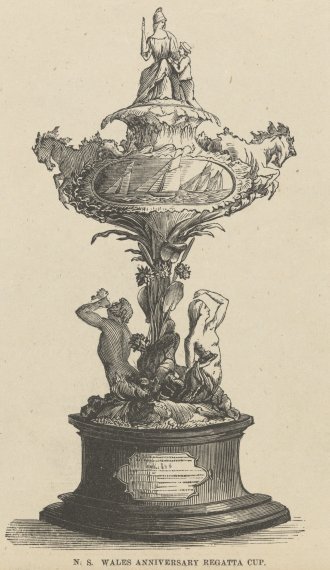 FOREMOST amongst the festivities of yesterday stood the Regatta ; and assuredly a more successful or better conducted one has never been witnessed in the waters of Fort Jackson. The whole affair, from first to lost indeed, redounded to the credit of the Yacht Club and those other gentlemen who participated in the management of the day's business. The festival was appropriate in every respect, and well worthy of the important event which it was designed to commemorate. From an early hour in the morning, a continuous stream of holiday folk, all dressed in their best attire, were to be seen wending their way toward those various beautiful spots along the shores of the harbour whence a prospect of the sports was to be secured ; and, as usual on such occasions, Dawes' Point, Fort Macquarie. Lady Macquarie's Point, and other well-known and picturesque localities, were crowded with spectators, citizens of every grade and position, mingling together, and joining harmoniously in the celebration of our national holiday.
FOREMOST amongst the festivities of yesterday stood the Regatta ; and assuredly a more successful or better conducted one has never been witnessed in the waters of Fort Jackson. The whole affair, from first to lost indeed, redounded to the credit of the Yacht Club and those other gentlemen who participated in the management of the day's business. The festival was appropriate in every respect, and well worthy of the important event which it was designed to commemorate. From an early hour in the morning, a continuous stream of holiday folk, all dressed in their best attire, were to be seen wending their way toward those various beautiful spots along the shores of the harbour whence a prospect of the sports was to be secured ; and, as usual on such occasions, Dawes' Point, Fort Macquarie. Lady Macquarie's Point, and other well-known and picturesque localities, were crowded with spectators, citizens of every grade and position, mingling together, and joining harmoniously in the celebration of our national holiday.
Right: 1853 Anniversary Regatta Cup, Image No.: an8004025, courtesy National Library of Australia.
The weather was all that could be wished by the most enthusiastic admirer of a fine day. The wind was, perhaps, a little too strong-boisterous, indeed, so far as the skiff races went-but admirably adapted for the sailing matches. Hence the additional interest created in the first-class yacht race-the issue of which, by the Way, took many by surprise, the general impression prior to the start being that the Annie Ogle would carry off the prize. Mr. Dean's lucky star was again in the ascendant, however, and he succeeded in adding another to the many handsome trophies of success which he previously possessed. The Champion Race in wager boats proved a comparative failure, three of the competitors capsizing shortly after starting. In the water men's race (one of the best contests of the day) the ex-champion, M'Grath, defeated the Melbourne puller, De Ward, in gallant style, although in the four-oared gig match, the latter, in company with White, Candlish, and Day, succeeded in wresting the palm from the natives. The whaleboat race was, however, the great event of the day, and terminating as it did in a victory for the Mulhalls crew, considerably softened down the defeat in the former case. So far as the issue of the regatta is concerned, it is satisfactory to notice that the prize money was pretty fairly distributed, the various wharves being represented in the list of winners. Through the kindness of the A. S. N. Company the committee (to whom every praise is justly due) were favoured with the use of the steamer Governor-General as flagship, and, with the attraction of the military band, it is hardly necessary to state that the company on board, numbering at least four hundred ladies and gentlemen, were enabled to enjoy themselves moat thoroughly. During the early part of the morning, his Excellency the Governor-general honoured the committee with his presence on board the vessel, together with several members of his family, and on leaving complimented them on the admirable arrangements which they had made. Sir William subsequently took a turn up and down the harbour, watching with apparent interest the gig-race and other matches. While talking of the flagship, we must not omit to say a word or two of the splendid dinners prepared by Messrs. Hampton and Cunningham; a more elegantly furnished table we have rarely seen-the viands being of the very best description, and served up in a style which spoke well for the taste of the contractors. The charge, too, was reasonable, which is a consideration that is sometimes lost sight of on such occasions. In fact, in every sense of the word, the thing was a credit to those connected with it, and it is to be hoped so good an example will not be lost sight of in the future. Without pausing to chronicle all the little events which took place ashore and afloat, but simply contenting ourselves with recording the fact of the celebration being a marked success, we proceed to a detail of the various races, in the starting and superintendence of which Mr. G. Thornton acquitted himself to the satisfaction of all concerned. We should perhaps award a word of praise to Mr. Cowell and the water police, for their efficient service in keeping a clear course for the boats. This Was the only duty they had to perform, however, and it required little exertion, everyone readily assuring TO secure a fair field and no favour for the respective competitors. We append the result of the different matches, and trust that the same spirit of harmony which characterised them throughout may prevail in all future Regattas.
FIRST RACE.-For all dingies not exceeding 12 feet on the keel, to be pulled with a pair of sculls _ by youths fifteen years of age and under....
THIRTEENTH RACE. - For all bona fide whaleboats, pulling five oars, that have been used for or are actually fit for whaling purposes, and to be approved of by the committee. First prize, £50 ; second prize, £10. Entrance, £3 3s. Course, same as No. 3.
Susan - Light blue - George Mulhall ..... 1 Freak - Blue and white - R. Love ...... 2 No Joke - Dark blue - T. Day.
Opinion was strongly in favour of Day's crew consisting of himself, White, Candlish, Deward, and another), and the more so as the boat they used had the reputation of being very fast. She had only a few days since been imported from Tasmania. The London men got away with the lead, and on nearing Goat Island were considerably ahead. At this point, however, the Mulhalls put on steam, and gradually lessening the gap, went to the front, winning the best race of the day with ease ; the Freak coming in second about thirty lengths behind. The winning boat was cheered most vociferously as she passed the flag-ship. With respect to the defeated crew, it must be borne in mind that they had previously been pulling in other races, and coming to meet fresh men, it was not surprising that they were unsuccessful, even though having the best boat of the three. ANNIVERSARY REGATTA, 1860. (1860, January 27). The Sydney Morning Herald (NSW : 1842 - 1954), p. 4. Retrieved from http://nla.gov.au/nla.news-article13035999
BALMAIN REGATTA.
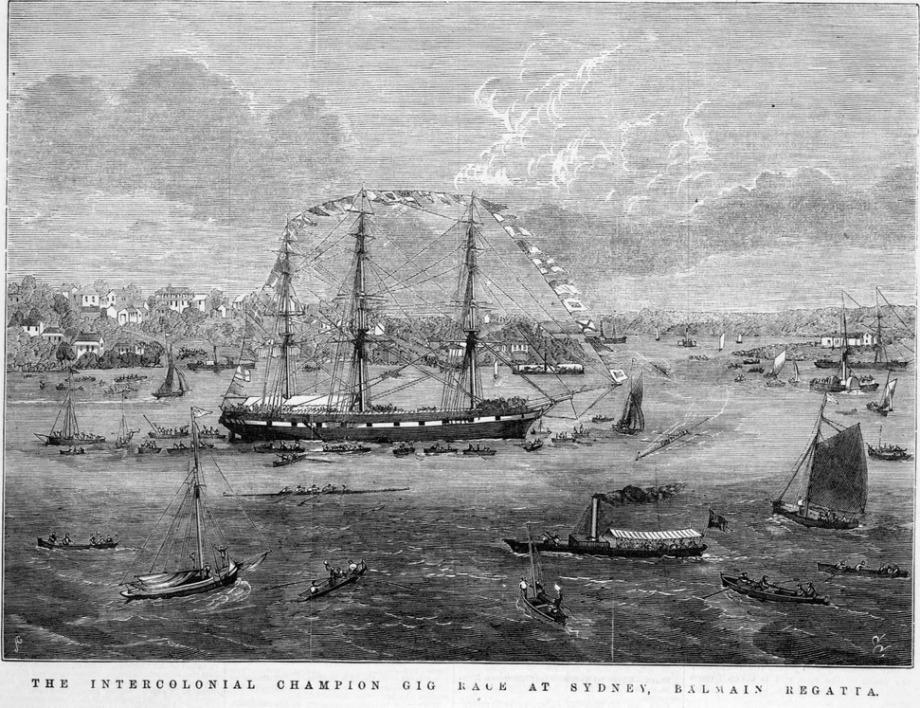
NORTH SHORE REGATTA.
The general holiday usual in Sydney on the occasion of her Majesty's birthday, was yesterday observed by the diversion of several, pulling
matches at North Shore. The weather was most propitious, and the attendance of people from the city was very large. The gradual ascent of the rising ground on the beach forming a spacious gallery for the eager spectators of the exciting sport. The prizes to the winners, offered by the liberality of Robert Campbell, Esq., M. L. C., and other gentlemen, were sufficient inducements to the exertions of the competitors. But the principal matters of interest to the majority of observers were the wagers they freely laid on the
different races, some of the stakes being of considerable amount. The yacht Friendship, belonging to James Milson, Esq., and which has won many a regatta cup, was the flag boat on the occasion. The races commenced - about eleven o'clock.
The first two races were for the selection of six of the Sydney watermen (three from each race),to be competitors for the prize of a new boat, and other stakes of smaller value in the match that subsequently came off, and the particulars of which will be found below.
The race was from the flag boat off Wilson's Point, proceeding round a boat moored off Billy Blue's Point, on the south side, and rounding on the north, thense round a boat moored at Kiribilli, rounding it in the same manner and back to the flag boat.
The following were the successful watermen in each of these preparatory races ;
FIRST HEAT.
John Roylance, New Wharf, black.
John Blue, North Shore, pink.
James Rice, Circular Quay, yellow.
SECOND HEAT.
Bernard Gallager, New Wharf, orange.
William Moran, ditto, green.
Maurice Bullivant, Gas Works, blue stripes.
AMATEUR RACE.
The third race-the first one for actual prizes was for amateurs under 17 years of age pulling a pair of oars. The same course as the above was followed, and the race commenced at half-past 12.The following wore the stakes .--First- prize, £7,and a silver anchor presented by Mr.. B. B.Cobon ; the second prize, £5 ; the third, £3 ;and the fourth, £2. Great praise is due to the exertions of these youths, whose management of the oar was much admired. The rowers in white made a good start, and were for a long time far ahead of the others, but owing to the awkward steering of the coxwain they lost their position,coming in, however, third. Below is the order of their arrival .
James Green and William Corkerry, Prospector, pink
James Chapman and William Brown, Native
Rose, white, and blue caps
William Dind and Richard Green, Waratah, white.
Robert Green and Montaguo Younger, Silverton, light blue.
CHAMPION RACE.
The first prize in this race was £25, with a gold medal or cup ; the second prize, a silver cup, value £10. 10s., presented by Mr. F. Cohan. The course was the same as before, and the boats started shortly after 1 o'clook. George Green (light blue) and Charles Younger (black) gave in, after having gone a very short distance, and the rivalry became very close between the remaining three, who kept together the whole of the race, the second winner following the first at not more than four boats' lengths, and the third following the second at - no -great interval, considering-the length of the course. The following are the three first winners ;
Thomas M'Grath, green.
James Richards, dark blue.
George Mulhall, pink. WHALEBOAT RACE. NORTH SHORE REGATTA. (1853, May 25). Empire (Sydney, NSW : 1850 - 1875), p. 2. Retrieved from http://nla.gov.au/nla.news-article61324541
The Anniversary Regatta.- The Sixty sixth anniversary Regatta, in commemoration of the foundation of the colony of New South Wales, took place yesterday. The weather was most propitious, the morning was ushered in by a bright and unclouded sky, while a fresh north-easterly breeze prevailing throughout the day, gave full opportunity tor testing the relative merits of the contending boats -The first match, for licensed watermen's boats, by water-men who had never won a public prize, pulling a pair of sculls, first prize £10 10s, second prize £3 3s, was won by the Flying Cloud(Barnet Gallagher), beating by two minutes the Mary Ann (Thomas M Gregor), and the Gold Dust (Charles Henson) - the second match, for amateur Skiffs, pulling a pair of sculls, first prize £10 10s., second £2 2s , was won by the Prospector (R.Green) beating by a minute and half the Sand Fly (Isaac Howard), and three others -The third match, for ships four-oared was first prize- £20, second £5, was won by the Howard (George Bennett), beating by one minute the Curlew (A Manson), and four others-, - the fourth match, for sailing boats not exceeding thirteen feet on the keel, first prize £15 15s, second £5 5s. , was won by Mr T. Langford's Sea Belle, beating Mr J. Pashley's Dolphin, and five others-The Champion Race, for all boats pulling a pair of sculls, first prize £21, second £.5. 5s, was won by the Sand Fly (Thomas M'Grath), beating by two lengths the Prospector (R. Green),the Maid of Australia (George Mulhall) being third, the Firefly (Andrew M'Guire) fourth, and the Catch me if you Can (Thomas Mulhall) knocked up - The sixth match, for ships' boats under canvas., first prize £13 l5s , second £5 5s , was won by Mr Pettit's Light Ship, beating by five minutes Mr King's Daring, and two others-The seventh match, for all yachts, time for tonnage one minute per ton, first prize £75 second £21,was won by Mr Rankin's Eclipse, beating by two minutes (after allowing tonnage) Mr Gadiner's Frolic, Mr H. Martin's Ivanhoe being third, and Mr S. E. Burt's Mazeppa fourth, the Eclipse performed the distance in a little under four hours. -The eighth match, for dingies, pulled by youths with a pair of sculls, first prize £5, second a sweep-stakes, was won by the Specmien (Richard Green), beating the Not-Expected (William Browne), the Nugget (Robert Green), and seven others, Richard Green's boat was protested against as being over the length -The ninth match tor all coasters, first prize £40, second £10, was won by Mr Blue's Reindeer, beating Mr Speers's Peacock, and Mr W, Nichols's Revenge-The tenth race did not fill-The eleventh match, for amateur skiffs, pulling a pair of oars, first prize £15 15s , second £5 5s, was won by the Prospector (Henry and Richard Green), beating the Sand Fly, Isaac and William Howard), and three others -The twelfth match, for ballast, wood, and fruit boats, first prize £20, second £5, was won by Mr Waterhouse's Sprig of Myrtle, beating Mr Jenkins's True Blue, and another-The thirteenth match for all persons pulling a pair of oars, in waterman's boats, first prize £15 15s, second £5 5s, was won by Mr G Gallagher's Flying Cloud, beating Mr. G Barnett's Willy, and two others - the fourteenth match for watermen's boats pulled by a pair of sculls, and without a steers man, first prize £20, second £5, was won by the Elizabeth (George Mulhall), beating by twelve lengths the Try-it-again (Thomas McGrath), the Phoenician (Thomas Mulhall) being far behind Sydney News. (1854, February 1). The Maitland Mercury and Hunter River General Advertiser (NSW : 1843 - 1893), p. 4. Retrieved from http://nla.gov.au/nla.news-article679691
FOURTH RACE.-The Champion Race, for the silver cup and 30 sovereigns, to be pulled for under the same conditions as last year; second prize, £10. Entrance, £2 2s. Course:.-Same As No. 1.
Thomas Mulhall-Where I'm Not Expected-blue and white, Henry Green-Rose-blue and red, George Mulhall-Who'd have Thought It-light blue, Thomas M'Grath-Nugget-green, Richard Green-Foig-a-Baliagh-pink , J. Rice -Toad-dark blue, George Green-Prospector-white
This race was looked upon as the great event of the day, and a deal of betting took place upon the issue, M'Grath, Green, G. Mulhall and Rice being freely supported by their respective friends. All the entered boats started, the whole getting off pretty well together, though R. Green and M'Grath managed to dash away with a slight lead. After rounding the flag boat, Rice collared M'Grath and a splendid struggle took place; both men strained every nerve, and after passing the flagship to round the boat at Gibbe's Point H. Green having knocked up, it was apparent that the chance lay between M'Grath and Rice, George Mulhall occupying third place. After a hard struggle, M'Grath reached the goal about a length in advance of Rice, R. Green being third, and George Mullhall fourth. (G. Mulhall has handed in a protest to the effect that he was wilfully fouled by H. Green on rounding the first fing-boat. Whether this be true or not, it, is for the Committee to decide. We must, however, express our disapprobation at the conduct of those persons who so far forget themselves as to insult by hootings and yellings the losing man, George Mulhall, both throughout the race and after its termination. Though fairly beaten by his opponent, M'Grath, it does not follow that he should be despised and insulted; if the partisans of particular persons will disregard the principles of " Fair Play," they should at least respect the old man for what he has been, and remember that it is an "unequal task when Youth contends with Age."
SEVENTH RACE.-For all watermen in boats that are licensed to carry not less than eight Passengers First prize £10 , second ditto, £1O. Entrance £1 1s. Course same as No. 1.
M. Bullivant-Presto-tartan
B. Love-Happy go Lucky-black
Thomas M'Grath-Star-white
Thomas Mulhall-Traveller-blue and white
George Mulhall-Phoenician. .
This race created much interest and bets were freely made in favour of the Mullhalls and T. McGrath. On the gun being fired. M'Grath got off with a slight lead, the Mullhalls being pretty close up. These positions were kept till after rounding the boat at Blue's Point, when McGrath appeared about 12 lengths ahead of T. Mulhall, George being about the same distance behind Thomas. In this order the boats came in, McGrath being loudly cheered while volites of yells were again directed at the losing men by persons: who ought certainly to have known better. After the race, McGrath was invited on board the flag ship, and received the congratulations of the Committee as the Champion of Port Jackson.
The beautiful American schooner Pride of the Seas, was the flag-ship on the occasion, being placed at the disposal of the committee of management by the courtesy of Captain Hodges, to whom and his officers great credit is due for their efforts to render effective the arrangements for this thoroughly Australian sport.
Punctually at twelve o'clock the English and American ensigns were hoisted at the flagship ; and immediately after, the royal salutes from the frigate Calliope, and from fort Phillip, were returned by a corresponding salute from the Pride of the Seas-the English and the American colours being alternately dipped at each discharge ; the salute was concluded with one discharge of great volume, and by the hoisting of the two national colours The Dutch brigantine, Maria Sophia, also fired continuous salutes throughout the day. NORTH SHORE REGATTA. (1854, May 25). Empire (Sydney, NSW : 1850 - 1875), p. 2. Retrieved from http://nla.gov.au/nla.news-article60197107
The above seems to indicate the Yanks may have held a grudge for the 1844 thrashing that put an end to boastful brooms as mastheads on whaling ships, or those with whom he had verbal spas in the past, who had also won and lost and won and lost and taken turns post 1850 at being declared 'Champion' of The Champion Boat Race' or even those who bet on the Mulhalls triumphing again losing more than they planned to or ! How fickle fans may be towards a man who consistently won The Championship Race for so long prior to 1854. The game was shifting, boats owned by men who could afford them were rowed by hired athletes:
NORTH SHORE REGATTA. In the account of the North Regatta, published in yesterday's issue, a material mistake occurred in the description of the Champion Race, through the accidental transposition of one of the copy-slips. The following is correct :
Third Race
This, being the Champion Race, may be considered the event of the day, and the competitors, with the exception of one, were all tried men. At about noon the boats drew up in the following order.
Endeavour.....George Green....... Blue
Petrel... James Edwards..... Scarlet
Resolution......Henry Green...... Pink and blue
Pheasant.........Isaac Howard...... Black
Scorpion.........George Mulhall...... Light blue, white border.
In starting, Henry Green took first place, closely followed by George Green, Edwards third, and Howard fourth. George Mulhall started, but evidently stood but little chance with The more youthful pullers, and was speedily left, behind. The struggle was desperate for the first quarter of a mile, by which time Edwards, (a waterman from London, who had entered without much chance of winning, he having a decidedly inferior boat,)had placed himself first, with Howard close astern, and the Greens both together. Off Gibbs' Point, Howard's boat struck Edwards' on the quarter, slewing him round, and before he could get straight again Howard had passed him. In rounding Pinchgut, Howard was first, Edwards second, and the Greens all behind, and in this order they rounded the flag boat in Lavender Bay, and came in past the flagship, Howard beating Edwards about four boats' lengths. The pulling of Edwards was admirable, and had his boat been at all equal to his more fortunate competitors he would have won the championship with the greatest of ease. The winning boat, built by Mr. Howard of Balmain, is a perfect model, and reflects great credit not only on the builder but also on the puller, who has thus placed himself in the position of best man, he having beaten the former champion with ease. NORTH SHORE REGATTA. (1855, May 26). The Sydney Morning Herald (NSW : 1842 - 1954), p. 4. Retrieved from http://nla.gov.au/nla.news-article12969734
AQUATICS. OPEN SKIFF RACE.-An Open Skiff Race took place on Saturday last, in the harbour for a sweepstakes of two sovereigns each. There were six boats entered viz.:-Kate, George Mulhall, Undine, Whistling Dick, Rosa Lee, and Saucy Jack, the latter did not start. The race was well contested-the Kate, however, winning easily; the George Mulhall and Undine making a good second and third respectively; the other two gave up. The weather not being very favorable the sport was not so good as it would probably otherwise have been. The course was from the Red Buoy round Light Ship and Sow and Pigs, passing Shark Island on the east side, and back to Red Buoy, The time, 1 hour 35 minutes. Another race with two boats had taken place in the early part of the day, when one of the boats upset and went down-the men in her were saved by one of the pilot boats. During the Skiff Race, a boat named the Champion, carrying a party to witness the race, accidentally noticed where the boat had sunk, and after considerable exertion succeeded in raising the lost boat to the surface and towed her to the wharf.- Empire. [The Kate is a beautifully modelled new boat, built by Mr. Henry Gardner, of Balmain, for Mr. James Hill, and has proved herself a very fast boat. EDS. H. h. S.] AQUATICS. (1856, October 11).Bell's Life in Sydney and Sporting Reviewer (NSW : 1845 - 1860), p. 2. Retrieved from http://nla.gov.au/nla.news-article59762757
NORTH SHORE REGATTA. The general holiday usual in Sydney on the occasion of her Majesty's birthday, was yesterday observed by the diversion of several, pulling matches at North Shore. The weather was most propitious, and the attendance of people from the city was very large. The gradual ascent of the rising ground on the beach forming a spacious gallery for the eager spectators of the exciting sport. The prizes to the winners, offered by the liberality of Robert Campbell, Esq., M. L. C., and other gentlemen, were sufficient inducements to the exertions of the competitors. But the principal matters of interest to the majority of observers were the wagers they freely laid on the different races, some of the stakes being of considerable amount. The yacht Friendship, belonging to James Milson, Esq., and which has won many a regatta cup, was the flag boat on the occasion. The races commenced - about eleven o'clock.
The first two races were for the selection of six of the Sydney watermen (three from each race),to be competitors for the prize of a new boat, and other stakes of smaller value in the match that subsequently came off, and the particulars of which will be found below.
The race was from the flag boat off Wilson's Point, proceeding round a boat moored off Billy Blue's Point, on the south side, and rounding on the north, thense round a boat moored at Kiribilli, rounding it in the same manner and back to the flag boat.
The following were the successful watermen in each of these preparatory races ;
FIRST HEAT.
John Roylance, New Wharf, black.
John Blue, North Shore, pink.
James Rice, Circular Quay, yellow.
SECOND HEAT.
Bernard Gallager, New Wharf, orange.
William Moran, ditto, green.
Maurice Bullivant, Gas Works, blue stripes.
AMATEUR RACE.
The third race-the first one for actual prizes was for amateurs under 17 years of age pulling a pair of oars. The same course as the above was followed, and the race commenced at half-past 12.The following wore the stakes .--First- prize, £7,and a silver anchor presented by Mr.. B. B. Cobon ; the second prize, £5 ; the third, £3 ;and the fourth, £2. Great praise is due to the exertions of these youths, whose management of the oar was much admired. The rowers in white made a good start, and were for a long time far ahead of the others, but owing to the awkward steering of the coxswain they lost their position,coming in, however, third.Below is the order of their arrival .
James Green and William Corkerry, Prospector, pink, James Chapman and William Brown, Native Rose, white, and blue caps, William Dind and Richard Green, Waratah, white. Robert Green and Montaguo Younger, Silverton, light blue.
CHAMPION RACE.
The first prize in this race was £25, with a gold medal or cup ; the second prize, a silver cup, value £10. 10s., presented by Mr. F. Cohan. The course was the same as before, and the boats started shortly after 1 o'clock. George Green (light blue) and Charles Younger (black) gave in, after having gone a very short distance, and the rivalry became very close between the remaining three, who kept together the whole of the race, the second winner following the first at not more than four boats' lengths, and the third following the second at - no -great interval, considering-the length of the course. The following are the three first winners ; Thomas M'Grath, green. James Richards, dark blue. George Mulhall, pink. WHALEBOAT RACE. NORTH SHORE REGATTA. (1853, May 25). Empire (Sydney, NSW : 1850 - 1875), p. 2. Retrieved from http://nla.gov.au/nla.news-article61324541
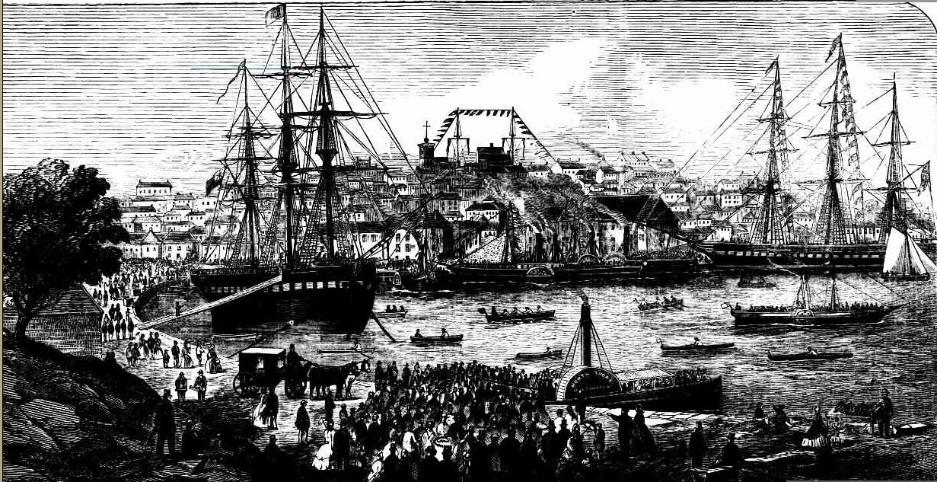
Above: THE CIRCULAR QUAY ON ANNIVERSARY DAY. SCULLING RACE FOR THE CHAMPIONSHIP. (1866, February 16). Illustrated Sydney News (NSW : 1853 - 1872), p. 8. Retrieved from http://nla.gov.au/nla.news-article63512782
George Mulhall Jnr. 1840 to 1931 & his brothers: some notes
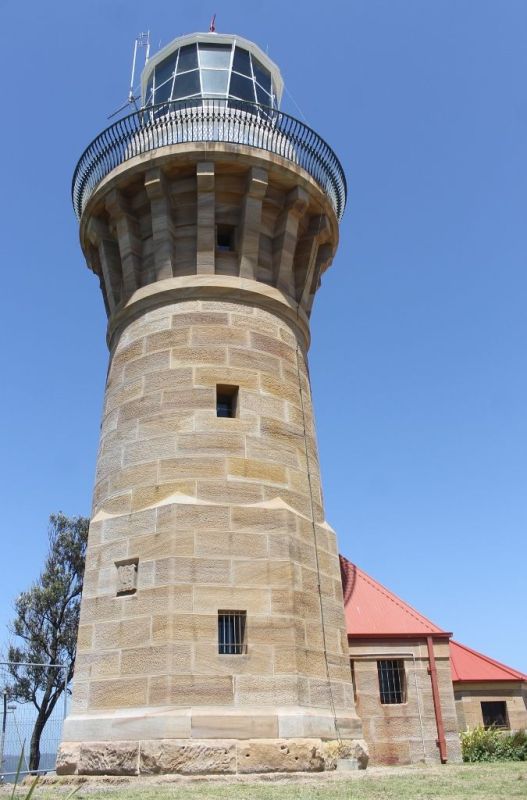 On the 29th November, by the Right Rev. Dr. Bailey, Bishop of the Free Church of England, GEORGE MULHALL, jun., son of George Mulhall, Superintendent of the Light-house at Broken Bay, to LUCY, third daughter of Mr. JOHN FLACK, farmer, Mudgee. Family Notices. (1870, December 15). The Sydney Morning Herald (NSW : 1842 - 1954), p. 1. Retrieved from http://nla.gov.au/nla.news-article13211508
On the 29th November, by the Right Rev. Dr. Bailey, Bishop of the Free Church of England, GEORGE MULHALL, jun., son of George Mulhall, Superintendent of the Light-house at Broken Bay, to LUCY, third daughter of Mr. JOHN FLACK, farmer, Mudgee. Family Notices. (1870, December 15). The Sydney Morning Herald (NSW : 1842 - 1954), p. 1. Retrieved from http://nla.gov.au/nla.news-article13211508
MULHALL-BRIERLEY. May 31, 1893, at St. John's Church, Darlinghurst, by the Rev. A. W. Pain, James Edward Mulhall, eldest son of George Mulhall (late principal of the Broken Bay Lighthouse), to Blanche, second daughter of Ittai Brierley, of Sydney. Family Notices. (1893, July 15). The Sydney Morning Herald(NSW : 1842 - 1954), p. 1. Retrieved from http://nla.gov.au/nla.news-article13907990
MULHALL.-June 13, at her residence, Aston Villa, 278 Annandale-street, Annandale, the wife of James Edward Mulhall, of a daughter (Blanche Elizabeth Brierley). Both doing well. Family Notices. (1914, June 20). The Sydney Morning Herald(NSW : 1842 - 1954), p. 18. Retrieved from http://nla.gov.au/nla.news-article15517734
MULHALL James Edwards June 9 1953 at his residence 88 Kenneth Street Longueville beloved husband of the late Blanche Mullhall and loving father of Vera, Gladys, Albert and Elizabeth Family Notices. (1953, June 10). The Sydney Morning Herald(NSW : 1842 - 1954), p. 30. Retrieved from http://nla.gov.au/nla.news-article18369550
MULHALL.-August 9, 1931. at his residence, Balgoulah. 142 Dalhousie-street, Haberfield. beloved husband of Lucy, and loving father of James, Alfred (deceased), and Arthur, aged 92 years. Family Notices. (1931, August 10). The Sydney Morning Herald(NSW : 1842 - 1954), p. 8. Retrieved from http://nla.gov.au/nla.news-article28037116
MULHALL.-The Relatives and Friends of the late GEORGE MULHALL are Invited to attend his Funeral; to leave Bulgoulah, 142 Dalhousie-street, Haberfield; THIS DAY. at 2.15 p.m., for Church of England Cemetery, Rookwood, by road, per Motor Service. Friends travelling by Funeral Train alight No. 1 Cemetery Platform and proceed to Section 3.T. J. ANDREWS. Funeral Director. 'Phones: L2873 and 4. 21-25 Enmore-road. Newtown. Family Notices. (1931, August 10). The Sydney Morning Herald(NSW : 1842 - 1954), p. 7. Retrieved from http://nla.gov.au/nla.news-article28037328
MULHALL.-August 22, 1931, at her son's residence, Cambewarra, 140 Dalhousie-street, Haberfield, Lucy, relict of the late George Mulhall and loving mother of James, Alfred (deceased), and Arthur, aged 82 years. Family Notices. (1931, August 24). The Sydney Morning Herald(NSW : 1842 - 1954), p. 8. Retrieved from http://nla.gov.au/nla.news-article1680166
MULHALL-The Relatives and Friends of the late LUCY MULHALL are invited to attend her Funeral to leave Cambewarra 140 Dalhousie-street Haberfield THIS DAY at 2 15 p m for Church of England Cemetery Rookwood, by road per motor service Friends travelling by funeral train alight No 1 cemetery platform and proceed to section 3. T J ANDREWS . Funeral Director 21 25 Enmore road Newtown Phones L2873 and 4 Family Notices. (1931, August 24). The Sydney Morning Herald(NSW : 1842 - 1954), p. 7. Retrieved from http://nla.gov.au/nla.news-article16801878
FOR SALE 16ft Skiff hull only In good racing trim cheap Apply A MULHALL George's River Sailing Club Dolls Point at week ends.Advertising. (1932, October 12). The Sydney Morning Herald(NSW : 1842 - 1954), p. 1. Retrieved from http://nla.gov.au/nla.news-article16914334
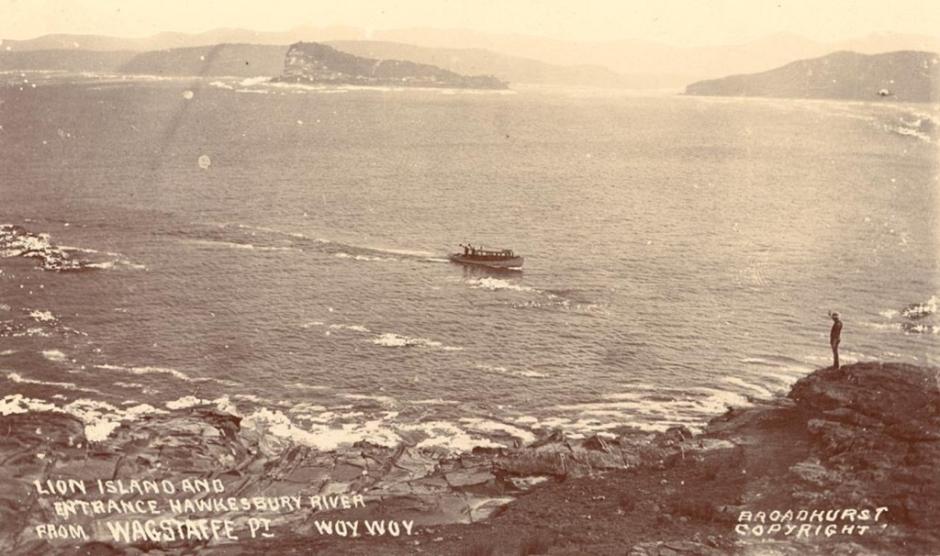
Lion Island and entrance, Hawkesbury River, from Wagstaffe Pt., Woy Woy from album: [Scenes of Hawkesbury River, N.S.W.] Broadhurst collection of postcards of New South Wales scenes, Courtesy State Library of NSW. Image No.: a105349 - circa 1900-1927